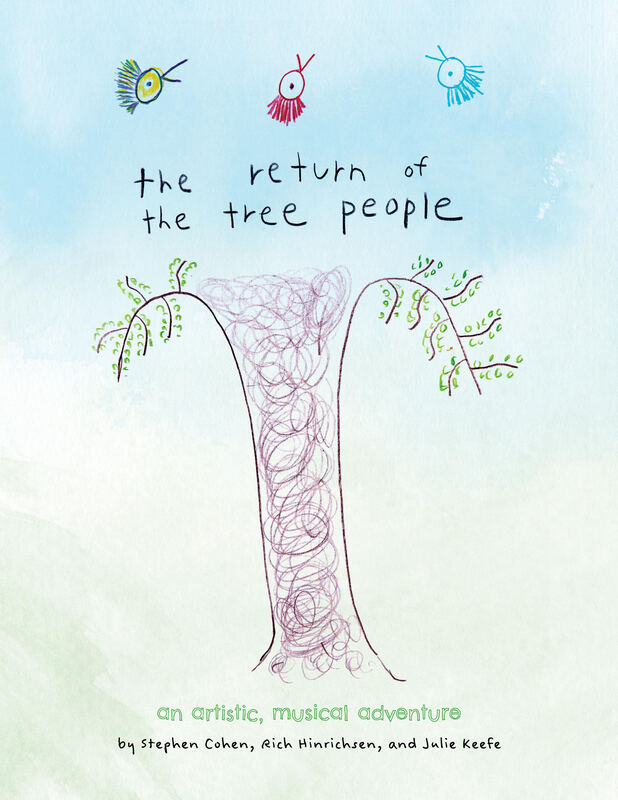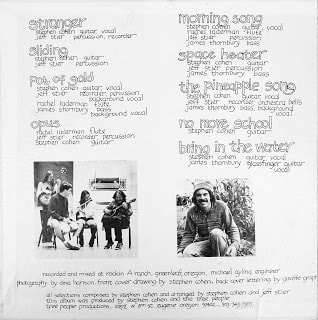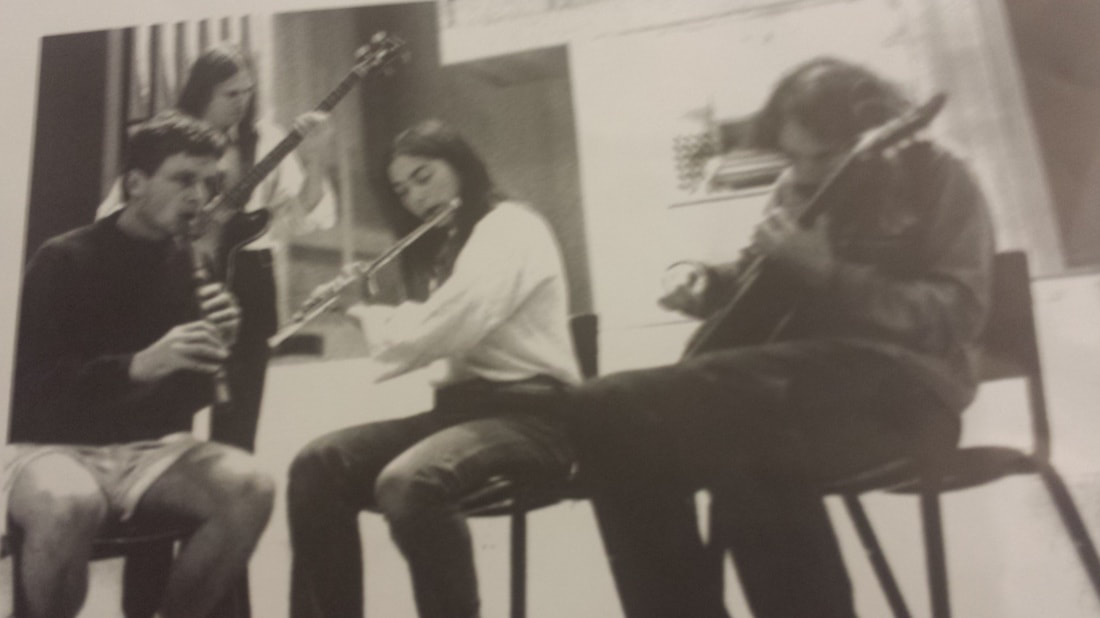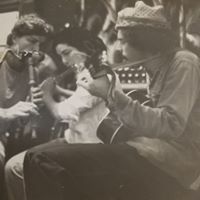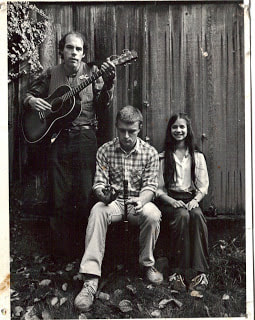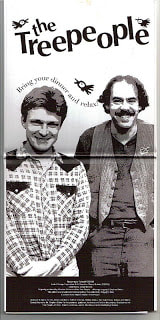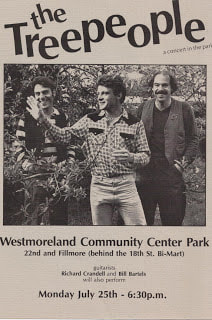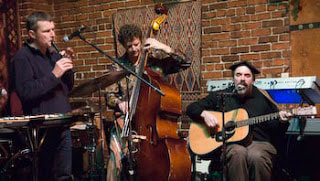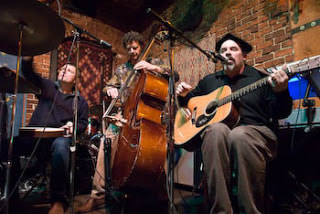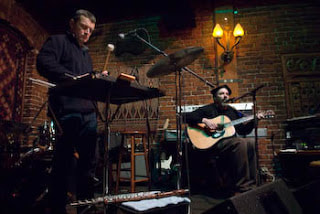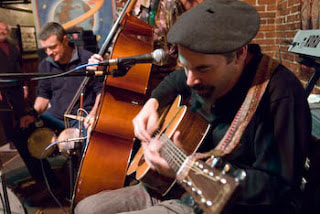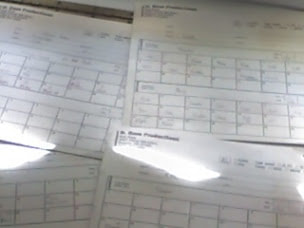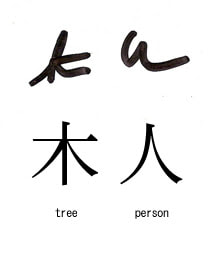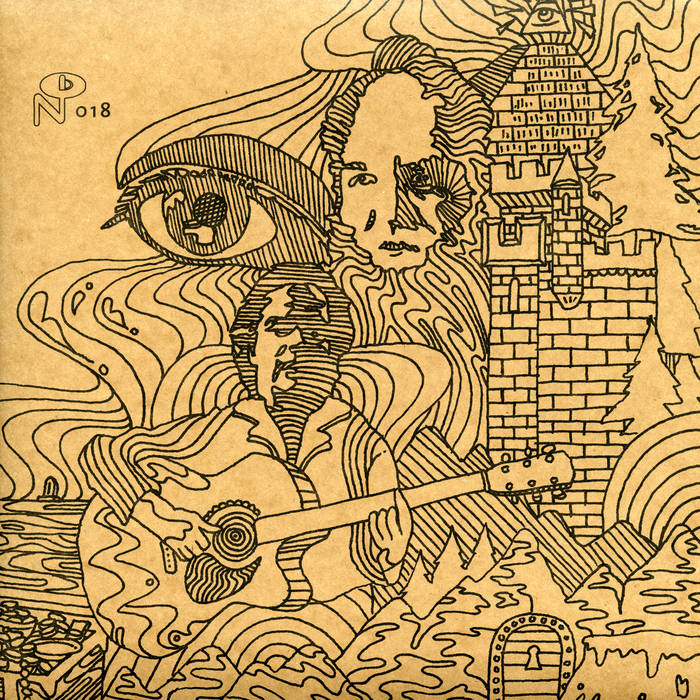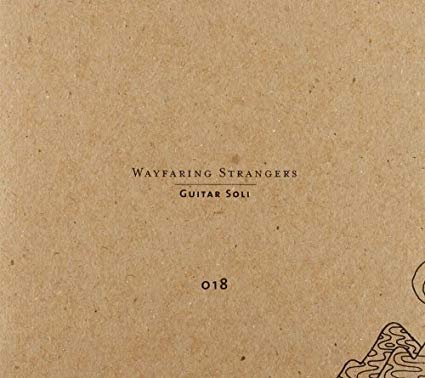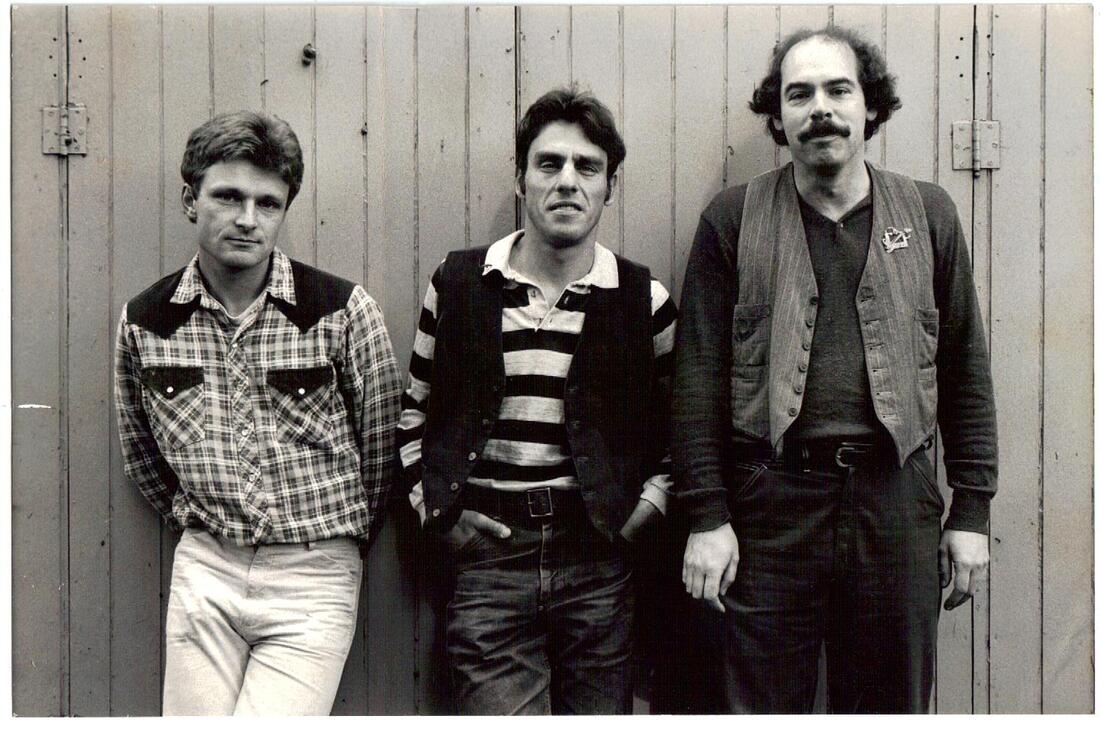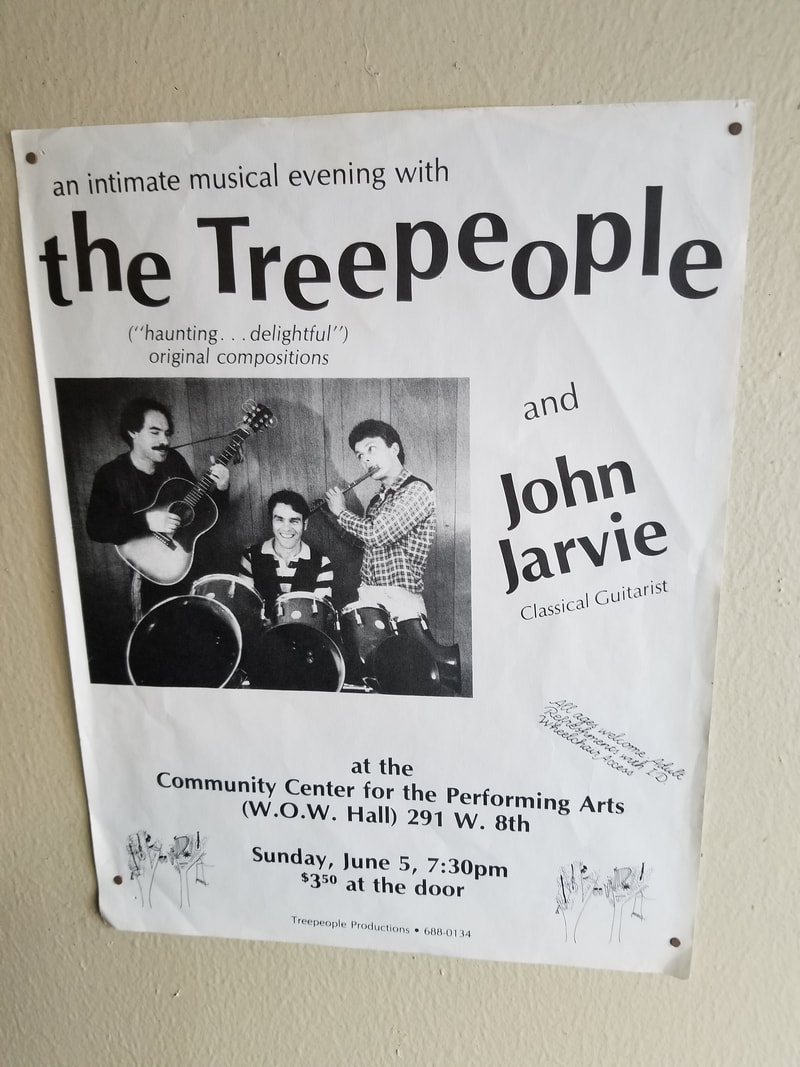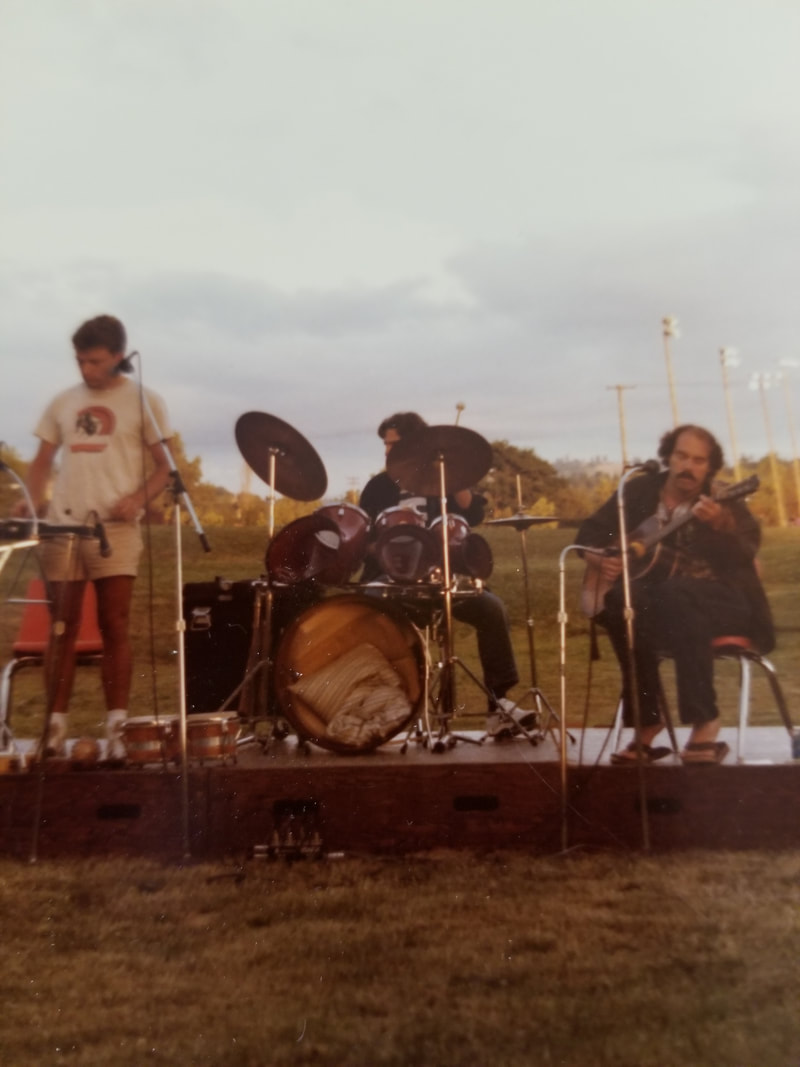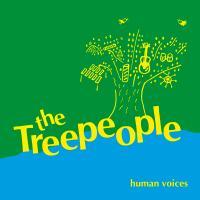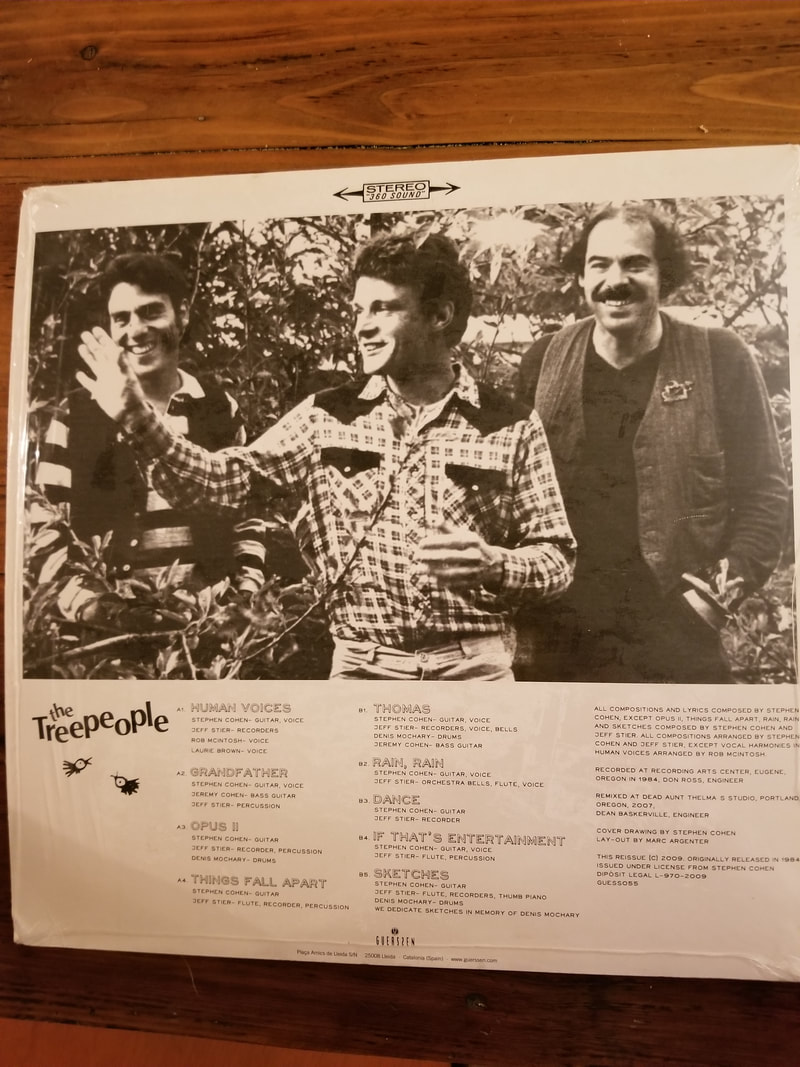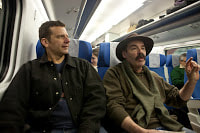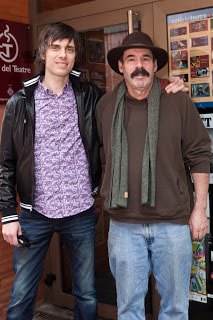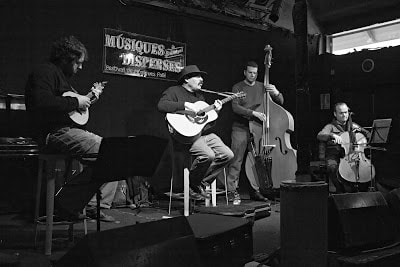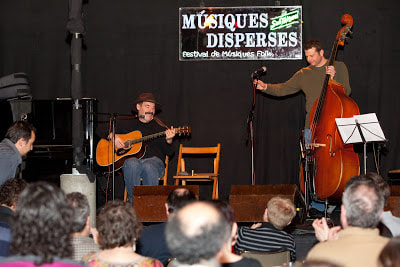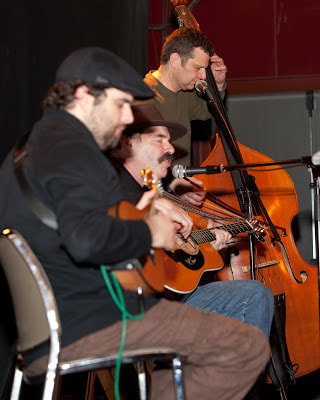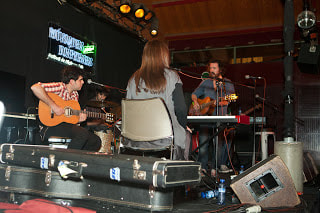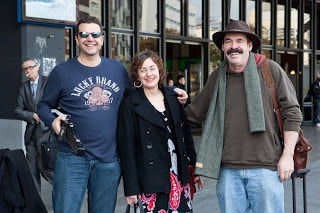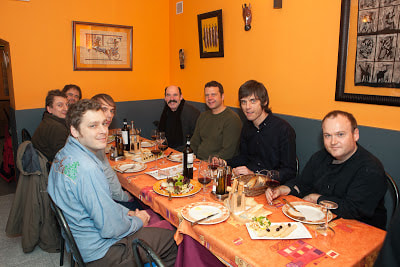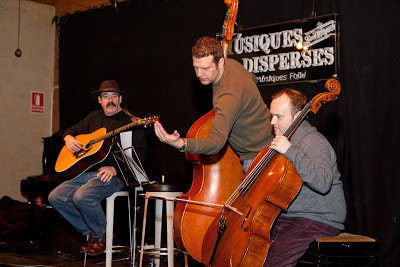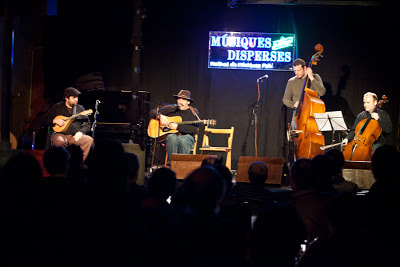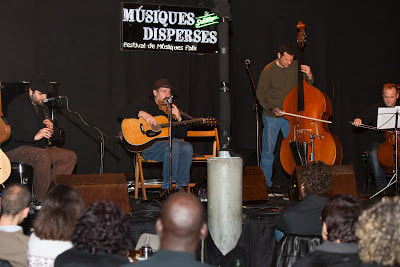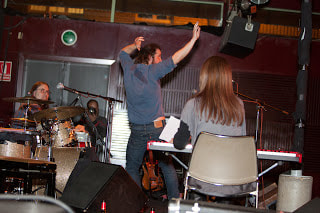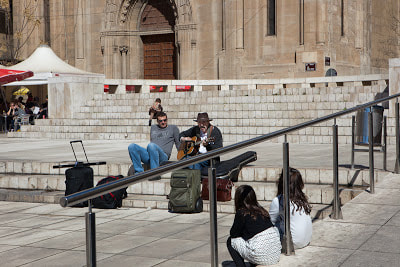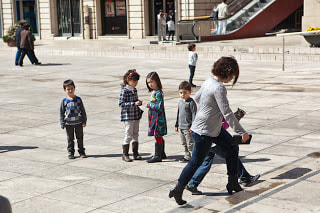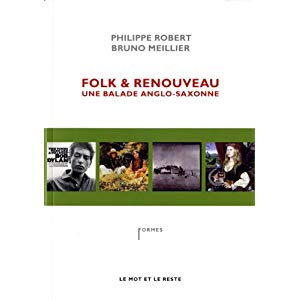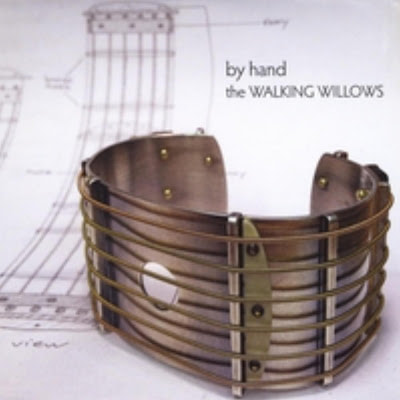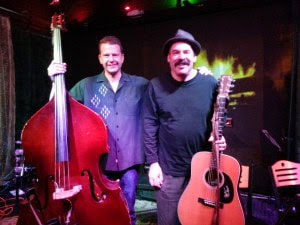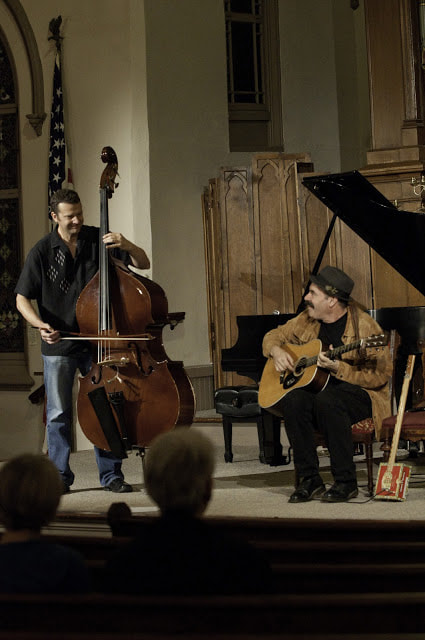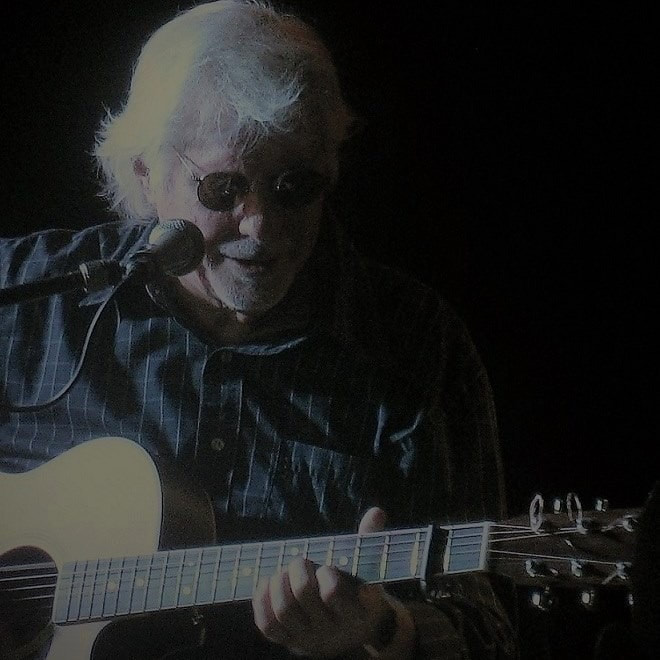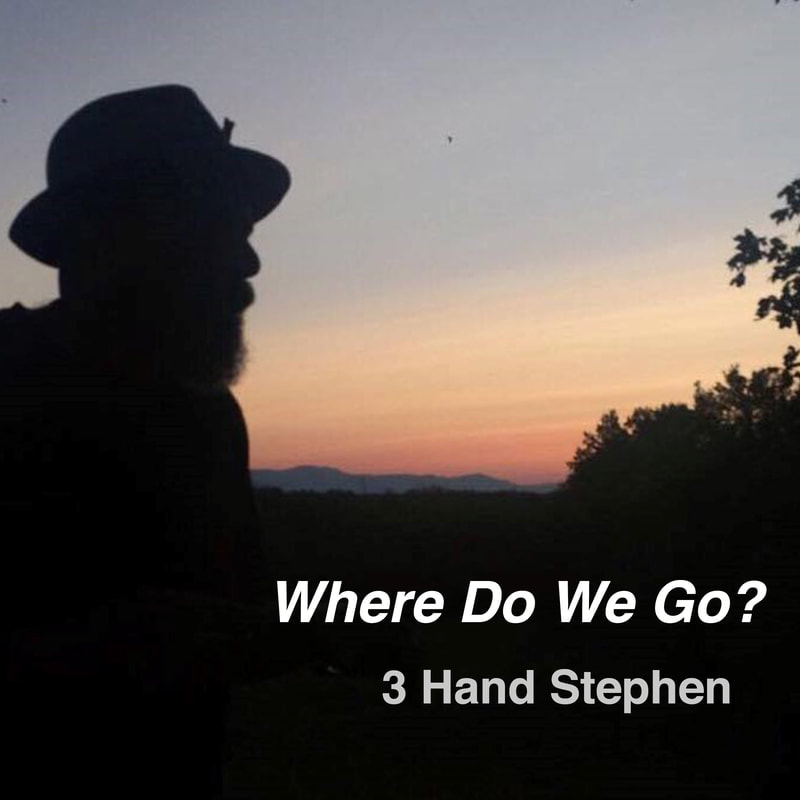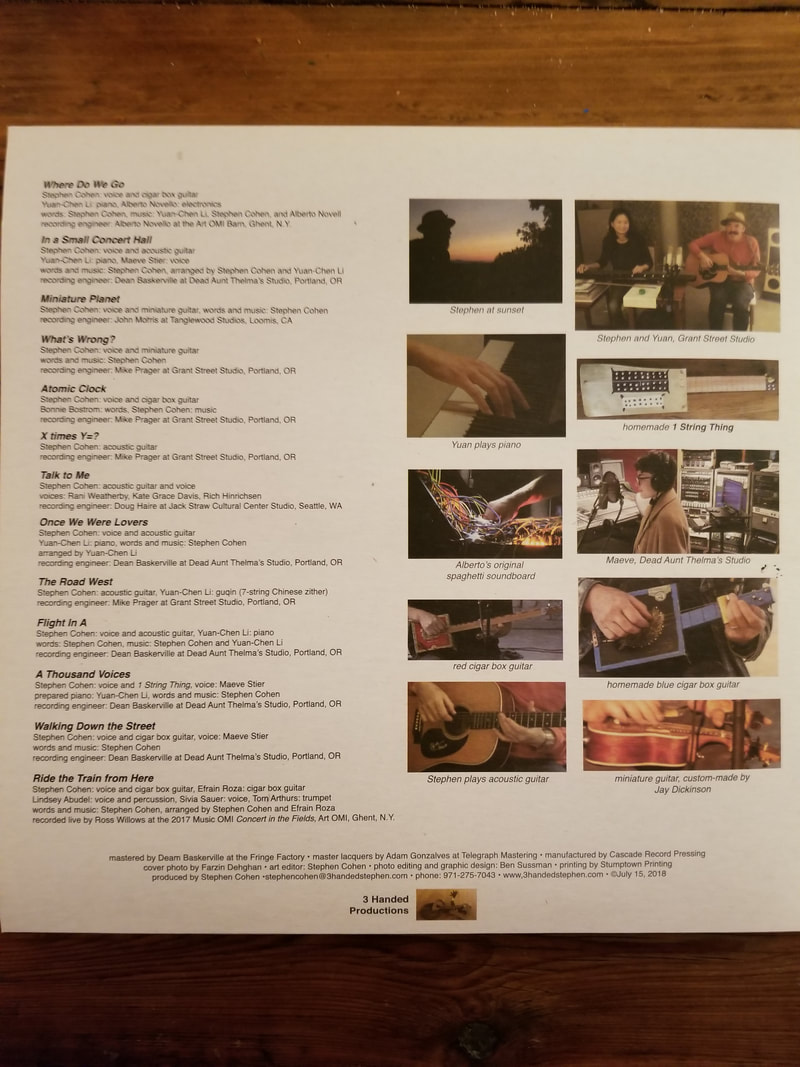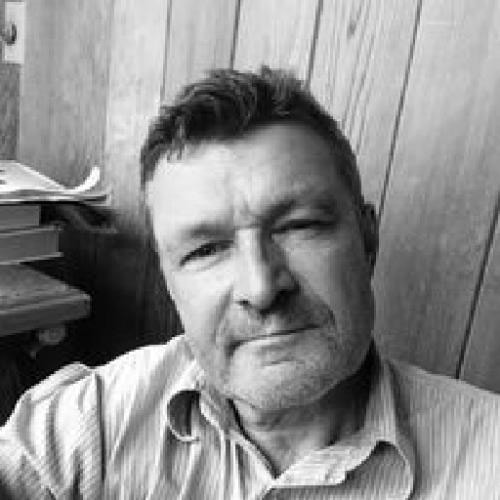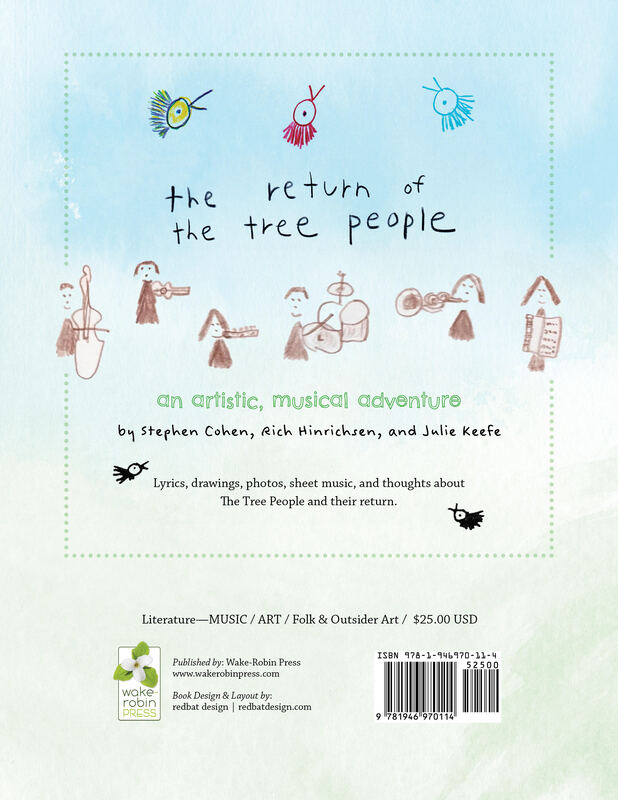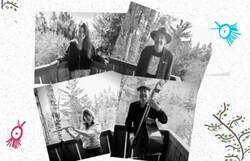|
The Return of The Tree People is a CD, cassette, and a hardcover book of drawings, photos, lyrics, written music, and stories.
Download the album on Bandcamp or Amazon. Below are the 14 songs on the album:
The Tree People, a vinyl album recorded in a studio in the woods in Oregon in 1979 featuring Stephen Cohen, Jeff Stier, Rachel Laderman, and James Thornbury, was reissued as a CD in 2006 by Tiliqua Records of Japan and as a vinyl record by Guerssen Records of Spain in 2008. Their 2nd album Human Voices, featuring Stephen Cohen, Jeff Stier, and Denis Mochary, recorded in 1984, was reissued by Guerssen in vinyl and as a CD in 2009. The 3rd and last Tree People album, It's My Story, featuring Stephen Cohen, Jeff Stier, and Rich Hinrichsen, was released by Guerssen in 2010. Stephen created a blog about The Tree People, The Tree People Chronicles , documenting the life of The Tree People band. This page will recreate that blog from the beginning, and take the story as far as it goes.
2006:
Some history of The Tree People:
I moved to Eugene, a college town in Oregon in 1977, as a young songwriter and guitarist, and began playing at local coffee houses and concert venues there. At a Eugene coffee house called The Home Fried Truck Stop (which no longer exists), I heard an amazing percussionist and recorder player named Jeff Stier playing with an acoustic trio. When I played at the same place a week later he was in attendance, and I asked him if he was interested in performing with me in the future. He had a friend at the time, Rachel Laderman, a classical flutist and daughter of the classical composer Ezra Laderman. Thus The Tree People came into being.
After a year or so of performing and practicing as a group, we went into a studio in the woods called Rockin' A Ranch (which also doesn't exist anymore, but the engineer Michael Ayling, now Michael Brewer, is still involved in music). James Thornbury, a Eugene blues musician at the time, joined us on bass and background vocals and played slide guitar on the last song. We recorded an entire album, The Tree People, in one summer weekend at the Rockin' A Ranch. I remember Michael's wife Linda bringing us fresh warm cookies at one point in the proceedings. I recall a new born baby in the house. I remember the feeling of waking up in that A-frame studio in the woods knowing that this was where I was supposed to be: surrounded by good musicians and good people and creating music.
Because my two children were very young at the time, and because Jeff had work commitments (he was a bike mechanic and then a car mechanic during those years) and Rachel was attending the University of Oregon, we never thought about touring. But we did perform all the time in Eugene: at coffee houses , outdoor market places , concert venues, local festivals and live radio shows. Rachel moved away when she finished school, but me and Jeff kept performing as The Tree People, with various guest musicians, for about 7 years. We made one more recording as The Tree People, a cassette called Human Voices, before Jeff eventually moved to Washington D.C. to work for U.S. congressman Peter Defazio.
I remember another thing about the history of The Tree People album. Soon after it was released I sent a copy to a record company in Seattle on the recommendation of my engineer. The people at the company loved it, and wanted to press additional copies and market it across the United States through college radio stations. They even sent me a preliminary contract. But before they could do anything with it, there was an economic recession in the United States (this was now the early 1980's), especially in the northwest United States, and the company decided to put the whole project on the shelf. By the time things got better economically the A&R person from that record company had left the music business entirely and was selling real estate, and the deal was effectively dead.
Some memories about some of the venues that The Tree People played around the time of the album:
The Home Fried Truckstop was not really a truck-stop but a cooperatively run coffee house and restaurant near the University of Oregon that had a nice wooden stage and featured music 7 days a week. If someone was passing through town and asked where they could hear some music, The Home Fried Truckstop would be the place they would hear about. It attracted students, professors, working people, people passing through, people hanging out, artists, musicians, people in the community- there was always an audience there. Sunday brunches always drew the biggest crowds and I remember playing there on many a Sunday morning, letting our music merge with the sounds of plates and muted conversations and scattered applause, walking out back during breaks and looking out at the hills in the distance, and afterwards eating the breakfast of eggs and home-fried potatoes that came with the gig with band members and friends.
The Loft was a short lived venue a few blocks from the Home Fried Truckstop that was a loft perched on the second floor of an old wooden building and provided an intimate concert setting for local folk and jazz performers and theater groups. We did several concerts there and I remember the winding staircase leading up to The Loft, the good acoustics with the music bouncing off the wooden walls, and the good audience of listeners that made it up the staircase when we played there.
In July of 1979 we played in the woods east of Eugene near Elmira, Oregon on the main stage of the Oregon Country Fair, a counter-culture festival (which still happens for 3 days every July) that features music, arts and crafts booths, vaudeville performers, marching bands in colorful states of dress and undress, stilt walkers, fire-swallowers, drummers, buskers, and what have you. In our short set there we did some of the pieces that we would record on the Tree People album a month later down the same road further into the Coast Range at the Rockin' A Ranch in Greenleaf, Oregon. That main stage overlooked a field, and I remember playing a song I was working on called Fields of Light (I had a beautiful dream, I was in the fields, I was ever so light, everything was just so bright, and the warm breeze blew ever so nice) that we recorded at The Tree People session but didn't end up using on the album. I do remember someone approaching me years later and saying he had recorded that set at the Oregon Country Fair on a little tape recorder and still listened to Fields of Light.
We played at the Eugene Saturday market, an outdoor marketplace with food, arts and crafts and music that still goes on every week in Eugene. And I remember us playing at an event at the Erb Memorial Student Union at the University of Oregon soon after we released the album and selling all of the albums we brought with us that day during and after our set.
We also put on some of own concerts at various settings, including art galleries and The Eugene Garden Club (which, yes, was a real garden club that you could rent for events).
We did several live radio performances on the local NPR station KLCC's Music from the Center program, which was recorded live from the WOW Hall (a local concert and event venue in Eugene which still is around.) And when The Tree People Album came out, the whole album was played on a KLCC show called From the Leff Side (Howie Leff was the host of the show). I never met Howie Leff until a few years later when we each were coaching our sons in a 5th grade basketball league. That's the way I remember Eugene back then- we all were just living our lives, music was a big part of it- and that seemed to be enough in that college town back then.
Morning Song, from The Tree People album, was played on the popular KUGN AM morning radio show hosted by Wendell (Wendy) Ray and Dale "Uncle Fuzzy" Reed. This was a big deal, because AM radio then (and now) is not known for playing the music of local bands.
Some history of The Tree People:
I moved to Eugene, a college town in Oregon in 1977, as a young songwriter and guitarist, and began playing at local coffee houses and concert venues there. At a Eugene coffee house called The Home Fried Truck Stop (which no longer exists), I heard an amazing percussionist and recorder player named Jeff Stier playing with an acoustic trio. When I played at the same place a week later he was in attendance, and I asked him if he was interested in performing with me in the future. He had a friend at the time, Rachel Laderman, a classical flutist and daughter of the classical composer Ezra Laderman. Thus The Tree People came into being.
After a year or so of performing and practicing as a group, we went into a studio in the woods called Rockin' A Ranch (which also doesn't exist anymore, but the engineer Michael Ayling, now Michael Brewer, is still involved in music). James Thornbury, a Eugene blues musician at the time, joined us on bass and background vocals and played slide guitar on the last song. We recorded an entire album, The Tree People, in one summer weekend at the Rockin' A Ranch. I remember Michael's wife Linda bringing us fresh warm cookies at one point in the proceedings. I recall a new born baby in the house. I remember the feeling of waking up in that A-frame studio in the woods knowing that this was where I was supposed to be: surrounded by good musicians and good people and creating music.
Because my two children were very young at the time, and because Jeff had work commitments (he was a bike mechanic and then a car mechanic during those years) and Rachel was attending the University of Oregon, we never thought about touring. But we did perform all the time in Eugene: at coffee houses , outdoor market places , concert venues, local festivals and live radio shows. Rachel moved away when she finished school, but me and Jeff kept performing as The Tree People, with various guest musicians, for about 7 years. We made one more recording as The Tree People, a cassette called Human Voices, before Jeff eventually moved to Washington D.C. to work for U.S. congressman Peter Defazio.
I remember another thing about the history of The Tree People album. Soon after it was released I sent a copy to a record company in Seattle on the recommendation of my engineer. The people at the company loved it, and wanted to press additional copies and market it across the United States through college radio stations. They even sent me a preliminary contract. But before they could do anything with it, there was an economic recession in the United States (this was now the early 1980's), especially in the northwest United States, and the company decided to put the whole project on the shelf. By the time things got better economically the A&R person from that record company had left the music business entirely and was selling real estate, and the deal was effectively dead.
Some memories about some of the venues that The Tree People played around the time of the album:
The Home Fried Truckstop was not really a truck-stop but a cooperatively run coffee house and restaurant near the University of Oregon that had a nice wooden stage and featured music 7 days a week. If someone was passing through town and asked where they could hear some music, The Home Fried Truckstop would be the place they would hear about. It attracted students, professors, working people, people passing through, people hanging out, artists, musicians, people in the community- there was always an audience there. Sunday brunches always drew the biggest crowds and I remember playing there on many a Sunday morning, letting our music merge with the sounds of plates and muted conversations and scattered applause, walking out back during breaks and looking out at the hills in the distance, and afterwards eating the breakfast of eggs and home-fried potatoes that came with the gig with band members and friends.
The Loft was a short lived venue a few blocks from the Home Fried Truckstop that was a loft perched on the second floor of an old wooden building and provided an intimate concert setting for local folk and jazz performers and theater groups. We did several concerts there and I remember the winding staircase leading up to The Loft, the good acoustics with the music bouncing off the wooden walls, and the good audience of listeners that made it up the staircase when we played there.
In July of 1979 we played in the woods east of Eugene near Elmira, Oregon on the main stage of the Oregon Country Fair, a counter-culture festival (which still happens for 3 days every July) that features music, arts and crafts booths, vaudeville performers, marching bands in colorful states of dress and undress, stilt walkers, fire-swallowers, drummers, buskers, and what have you. In our short set there we did some of the pieces that we would record on the Tree People album a month later down the same road further into the Coast Range at the Rockin' A Ranch in Greenleaf, Oregon. That main stage overlooked a field, and I remember playing a song I was working on called Fields of Light (I had a beautiful dream, I was in the fields, I was ever so light, everything was just so bright, and the warm breeze blew ever so nice) that we recorded at The Tree People session but didn't end up using on the album. I do remember someone approaching me years later and saying he had recorded that set at the Oregon Country Fair on a little tape recorder and still listened to Fields of Light.
We played at the Eugene Saturday market, an outdoor marketplace with food, arts and crafts and music that still goes on every week in Eugene. And I remember us playing at an event at the Erb Memorial Student Union at the University of Oregon soon after we released the album and selling all of the albums we brought with us that day during and after our set.
We also put on some of own concerts at various settings, including art galleries and The Eugene Garden Club (which, yes, was a real garden club that you could rent for events).
We did several live radio performances on the local NPR station KLCC's Music from the Center program, which was recorded live from the WOW Hall (a local concert and event venue in Eugene which still is around.) And when The Tree People Album came out, the whole album was played on a KLCC show called From the Leff Side (Howie Leff was the host of the show). I never met Howie Leff until a few years later when we each were coaching our sons in a 5th grade basketball league. That's the way I remember Eugene back then- we all were just living our lives, music was a big part of it- and that seemed to be enough in that college town back then.
Morning Song, from The Tree People album, was played on the popular KUGN AM morning radio show hosted by Wendell (Wendy) Ray and Dale "Uncle Fuzzy" Reed. This was a big deal, because AM radio then (and now) is not known for playing the music of local bands.
"Sliding", in which percussionist Stier cooks along on his bongos Opus is a piece written and arranged by Stephen and Jeff.
Cohen makes his guitar alternately whine like a sitar and pound The quietly terrifying “Opus” might exemplify the group’s sensitivity
like a piano while following an almost Mid-Eastern rhythm. to each other’s tonal fluctuations best. Peter Leibik, Eugene Magazine, 1980 Paul Teasdale, Stylus Magazine
Cohen makes his guitar alternately whine like a sitar and pound The quietly terrifying “Opus” might exemplify the group’s sensitivity
like a piano while following an almost Mid-Eastern rhythm. to each other’s tonal fluctuations best. Peter Leibik, Eugene Magazine, 1980 Paul Teasdale, Stylus Magazine
Local reviews in Eugene, Oregon upon the 1979 release of The Tree People:
Light and Unjaded
"In the age of new wave music, it's nice to be reminded that some musicians are still in touch with a quieter, more meditative sensibility. Because they're so soft spoken, one rarely hears about them. And a hunger for publicity and financial success may not churn their stomachs, but they are out there. One of the best is Eugene's Stephen Cohen, a guitarist and singer whose group (Cohen, Jeff Stier, and Rachel Laderman) recently released it's first album, called The Tree People, which is also the name of the trio.
The album was recorded and produced last August at the Rockin' A Ranch in Greenleaf, Oregon almost as if it were a live performance. Very little was over-dubbed and several custs were played straight through on the first take. Furthermore, the music's intensity is enchanced because the group carefully timed its studio appearance, recording when the were total control of the material and when their energies were at their creative peak, Cohen says. All nine songs were composed by Cohen and arranged by Cohen and Stier.
Because Cohen's music is so distinctive, it creates a problem for those unimaginative reviewers who explain new music only in terms of which major artist it sounds like. I know I've never heard anything like it. But from the child-like cover illustration through the final note, the album is so fresh and unjaded it's like a breath of clean air. Certainly, as Cohen himself says, his music has a foreign feel, particulaly on instrumental numbers such as "Sliding", in which percussionist Stier cooks along on his bongos and Cohen makes his guitar alternately whine like a sitar and pound like a piano while following an almost Mid-Eastern rhythm. Stier, a versatile musician, is equally at ease adding eerie, mystical effects with a cymbal and wimsical, airy touches with bells throughout the album. The strong, classical elements in Cohen's music are highlighted by Laderman's flute and Stier's recorder. There's also James Thornbury's tasteful bass and back-up vocal work. Thornbury took time out from his own band, "The Raccoons" to sit in with the Tree People and his appearance is an impressive departure from his usual hard-driving style. But above all, Cohen's guitar dominates.
For some unexplicable reason, the few critics who reviewed the album nagged Cohen for mixing vocal and instrumental numbers. Acually, it's a much stronger record because of the blend. Cohen refuses to single out his influences because it's impossible: there are just too many. And he has difficulty describing his music in words. "The main thing I go for is mood... that's why I play it I guess. There's a certain mood I'm just trying to get and I just play it... When I first started playing at 14, I could hear the way I should be playing guitar and it wasn't any way I heard anybody else playing. I could even hear notes that I would be playing and years later I was playing them. I still work that way a lot." The 1,000 albums he pressed are gradually selling- some at stores but mainly at the group's performances and straight out of Cohen's and the other Tree People's backpacks. Whatever happens, The Tree People proves that unadulterated acoustic music is alive and well. Although it may be a little hard to find, it's worth the search."
-Peter Leibik, Eugene Magazine, May 1980
Cohen's album draws raves
"Eugene singer-guitarist Stephen Cohen has produced an excellent album. What's more he's done it on his own and with his own finances. The sacrificies were worth the pain. The Tree People, recorded in Greenleaf by Michael Ayling, is simply a beautiful album.There is much here to like; maybe too much. In an effort to display all of Cohen's talents, the album contains five vocals and four instrumentals. The result is disconcerting. Just when the listener settles into one of Cohen's fine guitar grooves, Cohen breaks the mood with a vocal. And visa versa. The next time out Cohen might do well to settle on one style or another. The question is, which one? Cohen's vocals are wispy affairs reminescent of Leonard Cohen's. His voice is full of gentleness and melancholy, his songs long on fragmented melodies. The appeal is immediate. His guitar playing is delightful. His uses a variety of techniques to effectively tell his stories. Although every cut is a winner, the most rewarding are the vocals "Stranger," "Pot of Gold," and "Morning Song" and the instrumentals "Sliding," "Opus," and "Space Heater." Accompanying him is an excellent trio consisting of Rachel Laderman, flute; Jeff Stier, recorder; and James Thornbury, bass. They greatly enchance Cohen's haunting moods."
-Fred Crafts, The Register-Guard, Eugene, Oregon, November 15, 1979
LPs- The Tree People
"New musicians, especially local musicians, often receive a great deal of scrutiny before being accepted into the "musical world." But Stephen Cohen is one step ahead of the rest of the new artists who pop up on the scene. Cohen's album, The Tree People, recorded at Rockin' A Ranch near Eugene, is a fresh look at traditional "coffee house music", interweaving the guitar, flute, vocals, percussion and recorder into simple, exciting pieces... Overall, Cohen and The Tree People have established themselves in Eugene as top coffee house musicians. Their music, as demonstrated in The Tree People, is fresh and exciting and worth listening to, whether on the album or live at the Home Fried Truck Stop. -Tamara Swenson, The Daily Emerald (University or Oregon), 1979
Jeff and I continued to perform as The Tree People after the 1979 album was history and Rachel had finished school and put Eugene, Oregon in her rear view mirror. We performed mostly in Eugene with a variety of guest artists over the next 5 years. Our flute player was gone, so Jeff, who already was playing recorder and percussion, and has always had the ability to learn new things quickly, learned to play the flute in short order.
We performed at the WOW Hall in Eugene many times over those years, in live radio concerts, as headliners and as opening acts. We opened for John Fahey, who said he would love to have us on his record label, Tacoma, but he didn't have the label anymore. After the performance I found John Fahey and Jeff in a back room having a spirited converstation, not about music or the music business, but about an obscure Catholic philosopher and author. That exchange summed up our music business luck and sense at the time- we were more interested and knew more about philosophy than the business of music, and in retrospect I think that might be a good thing. We also opened for the John Renborn Group, which was a big thrill because we were both big fans of The Pentangle, Renborn's innovative British folk group from the sixties, and his new group had many of the same wonderful musicians back from the Pentangle.
We had a few women singers who sat in with us over that period: first Janne Underriner, who is now a linguist and director of the The Northwest Indian Language Institute at the University of Oregon, and later, for a short spell a woman named Victoria, whom I had met in art school at the university.
Janne added a quiet dignity and beauty to the musical proceedings. During the time Janne sang with us a man from Los Angeles, who had just moved to a beautiful house on the MacKenzie River, saw us at The Home Fried Truck Stop (see the archives for more about The Home Fried Truck Stop, Eugene's long ago place for music), and became our publicist and unofficial agent for a short time. He looked and spoke well and had big ideas and plans for us, but, as happens so many times in the music business, nothing much came of it. Years later I was passing through Corvallis, Oregon and needed to mail some music materials that day. I saw a man on a cane who was obviously a burn victim- you could see it on his face and he was missing some fingers. When I asked him for directions to the post office he recognized me and told me who he was and how his house on the McKenzie River had burned down with him in it- it turns out there is more to that story, but it is probably best to get back to the Tree People.
Victoria also played violin, recorder and just about anything else. I remember a summer performance at the music stage at The Saturday Market in Eugene where she sat in with us: there was a warm breeze, blue skies, and nice people everywhere. On one particular song,
"A Woman Whose Face Was Found," we gave Victoria the vocals. She was either able to copy my off beat singing style almost exactly or just sang that way too- I never found out the answer because she soon moved back to San Diego.
Unfortunately we have no recorded history of Janne or Victoria's brief stints with the Tree People. We also did some performances with a high school classical piano prodigy named Soria Meadow (pictured above to the left), whose mother, a fan of the Tree People, wanted to see if her daughter could branch out into some improvised music. We composed a piece for Soria with guitar, piano, percussion and flute, but never recorded it. Once we booked a concert at a theater in Corvallis, and I drove the 40 miles with Jeff, Soria and her mother, only to find a nearly empty concert hall because whatever publicity that had been arranged either hadn't gotten out or hadn't worked. So we played a long, heartfelt set for the few people in attendance. The thing I remember most about that evening was the conversation with Jeff, Soria and her mother on the late night drive back. Words about life, meaning, and purpose filled the car like music.
Light and Unjaded
"In the age of new wave music, it's nice to be reminded that some musicians are still in touch with a quieter, more meditative sensibility. Because they're so soft spoken, one rarely hears about them. And a hunger for publicity and financial success may not churn their stomachs, but they are out there. One of the best is Eugene's Stephen Cohen, a guitarist and singer whose group (Cohen, Jeff Stier, and Rachel Laderman) recently released it's first album, called The Tree People, which is also the name of the trio.
The album was recorded and produced last August at the Rockin' A Ranch in Greenleaf, Oregon almost as if it were a live performance. Very little was over-dubbed and several custs were played straight through on the first take. Furthermore, the music's intensity is enchanced because the group carefully timed its studio appearance, recording when the were total control of the material and when their energies were at their creative peak, Cohen says. All nine songs were composed by Cohen and arranged by Cohen and Stier.
Because Cohen's music is so distinctive, it creates a problem for those unimaginative reviewers who explain new music only in terms of which major artist it sounds like. I know I've never heard anything like it. But from the child-like cover illustration through the final note, the album is so fresh and unjaded it's like a breath of clean air. Certainly, as Cohen himself says, his music has a foreign feel, particulaly on instrumental numbers such as "Sliding", in which percussionist Stier cooks along on his bongos and Cohen makes his guitar alternately whine like a sitar and pound like a piano while following an almost Mid-Eastern rhythm. Stier, a versatile musician, is equally at ease adding eerie, mystical effects with a cymbal and wimsical, airy touches with bells throughout the album. The strong, classical elements in Cohen's music are highlighted by Laderman's flute and Stier's recorder. There's also James Thornbury's tasteful bass and back-up vocal work. Thornbury took time out from his own band, "The Raccoons" to sit in with the Tree People and his appearance is an impressive departure from his usual hard-driving style. But above all, Cohen's guitar dominates.
For some unexplicable reason, the few critics who reviewed the album nagged Cohen for mixing vocal and instrumental numbers. Acually, it's a much stronger record because of the blend. Cohen refuses to single out his influences because it's impossible: there are just too many. And he has difficulty describing his music in words. "The main thing I go for is mood... that's why I play it I guess. There's a certain mood I'm just trying to get and I just play it... When I first started playing at 14, I could hear the way I should be playing guitar and it wasn't any way I heard anybody else playing. I could even hear notes that I would be playing and years later I was playing them. I still work that way a lot." The 1,000 albums he pressed are gradually selling- some at stores but mainly at the group's performances and straight out of Cohen's and the other Tree People's backpacks. Whatever happens, The Tree People proves that unadulterated acoustic music is alive and well. Although it may be a little hard to find, it's worth the search."
-Peter Leibik, Eugene Magazine, May 1980
Cohen's album draws raves
"Eugene singer-guitarist Stephen Cohen has produced an excellent album. What's more he's done it on his own and with his own finances. The sacrificies were worth the pain. The Tree People, recorded in Greenleaf by Michael Ayling, is simply a beautiful album.There is much here to like; maybe too much. In an effort to display all of Cohen's talents, the album contains five vocals and four instrumentals. The result is disconcerting. Just when the listener settles into one of Cohen's fine guitar grooves, Cohen breaks the mood with a vocal. And visa versa. The next time out Cohen might do well to settle on one style or another. The question is, which one? Cohen's vocals are wispy affairs reminescent of Leonard Cohen's. His voice is full of gentleness and melancholy, his songs long on fragmented melodies. The appeal is immediate. His guitar playing is delightful. His uses a variety of techniques to effectively tell his stories. Although every cut is a winner, the most rewarding are the vocals "Stranger," "Pot of Gold," and "Morning Song" and the instrumentals "Sliding," "Opus," and "Space Heater." Accompanying him is an excellent trio consisting of Rachel Laderman, flute; Jeff Stier, recorder; and James Thornbury, bass. They greatly enchance Cohen's haunting moods."
-Fred Crafts, The Register-Guard, Eugene, Oregon, November 15, 1979
LPs- The Tree People
"New musicians, especially local musicians, often receive a great deal of scrutiny before being accepted into the "musical world." But Stephen Cohen is one step ahead of the rest of the new artists who pop up on the scene. Cohen's album, The Tree People, recorded at Rockin' A Ranch near Eugene, is a fresh look at traditional "coffee house music", interweaving the guitar, flute, vocals, percussion and recorder into simple, exciting pieces... Overall, Cohen and The Tree People have established themselves in Eugene as top coffee house musicians. Their music, as demonstrated in The Tree People, is fresh and exciting and worth listening to, whether on the album or live at the Home Fried Truck Stop. -Tamara Swenson, The Daily Emerald (University or Oregon), 1979
Jeff and I continued to perform as The Tree People after the 1979 album was history and Rachel had finished school and put Eugene, Oregon in her rear view mirror. We performed mostly in Eugene with a variety of guest artists over the next 5 years. Our flute player was gone, so Jeff, who already was playing recorder and percussion, and has always had the ability to learn new things quickly, learned to play the flute in short order.
We performed at the WOW Hall in Eugene many times over those years, in live radio concerts, as headliners and as opening acts. We opened for John Fahey, who said he would love to have us on his record label, Tacoma, but he didn't have the label anymore. After the performance I found John Fahey and Jeff in a back room having a spirited converstation, not about music or the music business, but about an obscure Catholic philosopher and author. That exchange summed up our music business luck and sense at the time- we were more interested and knew more about philosophy than the business of music, and in retrospect I think that might be a good thing. We also opened for the John Renborn Group, which was a big thrill because we were both big fans of The Pentangle, Renborn's innovative British folk group from the sixties, and his new group had many of the same wonderful musicians back from the Pentangle.
We had a few women singers who sat in with us over that period: first Janne Underriner, who is now a linguist and director of the The Northwest Indian Language Institute at the University of Oregon, and later, for a short spell a woman named Victoria, whom I had met in art school at the university.
Janne added a quiet dignity and beauty to the musical proceedings. During the time Janne sang with us a man from Los Angeles, who had just moved to a beautiful house on the MacKenzie River, saw us at The Home Fried Truck Stop (see the archives for more about The Home Fried Truck Stop, Eugene's long ago place for music), and became our publicist and unofficial agent for a short time. He looked and spoke well and had big ideas and plans for us, but, as happens so many times in the music business, nothing much came of it. Years later I was passing through Corvallis, Oregon and needed to mail some music materials that day. I saw a man on a cane who was obviously a burn victim- you could see it on his face and he was missing some fingers. When I asked him for directions to the post office he recognized me and told me who he was and how his house on the McKenzie River had burned down with him in it- it turns out there is more to that story, but it is probably best to get back to the Tree People.
Victoria also played violin, recorder and just about anything else. I remember a summer performance at the music stage at The Saturday Market in Eugene where she sat in with us: there was a warm breeze, blue skies, and nice people everywhere. On one particular song,
"A Woman Whose Face Was Found," we gave Victoria the vocals. She was either able to copy my off beat singing style almost exactly or just sang that way too- I never found out the answer because she soon moved back to San Diego.
Unfortunately we have no recorded history of Janne or Victoria's brief stints with the Tree People. We also did some performances with a high school classical piano prodigy named Soria Meadow (pictured above to the left), whose mother, a fan of the Tree People, wanted to see if her daughter could branch out into some improvised music. We composed a piece for Soria with guitar, piano, percussion and flute, but never recorded it. Once we booked a concert at a theater in Corvallis, and I drove the 40 miles with Jeff, Soria and her mother, only to find a nearly empty concert hall because whatever publicity that had been arranged either hadn't gotten out or hadn't worked. So we played a long, heartfelt set for the few people in attendance. The thing I remember most about that evening was the conversation with Jeff, Soria and her mother on the late night drive back. Words about life, meaning, and purpose filled the car like music.
We started performing a lot, especially at some local festivals, with drummer Denis Mochary. He added rhythm, color and depth to the music and played on a very interesting looking drum set that was curved and had drums coming out at you like trumpets. He was reading some of the same novels that Jeff and I happened to be reading at the time, including "Things Fall Apart", by Chinua Achebe. We decided to call an instrumental that me and Jeff wrote "Things Fall Apart", a piece where things do fall apart and then come together again.
As 1984 approached, we felt it was time to do a second recording. I had written two songs, "Thomas", and "Grandfather", which always struck an emotional chord with our listeners in performance (I recorded another version of "Thomas" years later on a solo recording and won several national awards with that song, including an award at the Kerrville Folk Festival in Texas in 2000), and we had several instrumental pieces, such as "Things Fall Apart", that we knew were ready to record, plus a piece called "Rain, Rain, " which we felt put all the elements of what we were doing together. I also had written a song called "If That's Entertainment", which was totally different from the Windham Hill (a California music label) new age kind of things that were big in acoustic music circles in those days (a Tree People fan once described our music as "new age with an edge") . Although some of our listeners at the time thought "If That's Entertainment" was too negative and intense, we knew we wanted to include it in the recording.
We went in to The Recording Arts Center, the best studio in Eugene at that time (it no longer exists), with engineer Don Ross (a wonderful engineer who now runs his own studio, Don Ross Productions, in Eugene). The recording featured myself on acoustic guitar and voice, Jeff on recorders, flute, bells and percussion, Denis on drums and a few guest musicians. Rob McIntosh and Laurie Brown, a local and regional folk duo at the time, added a beautiful vocal arrangement to the song, "Human Voices", (Rob and Laurie, a married couple, were starting to make a big musical splash in the Pacific Northwest but a few years later they divorced and Laurie moved to Seattle. I don't know where either of them are now, but it seems like every city I go to has at least one folk couple in the spirit of Rob and Laurie). My brother Jeremy, a longtime professional bass player in Berkeley, California, added bass parts to "Grandfather" and "Thomas".
We put our hearts, minds and souls into Human Voices, but we didn't know what we were doing when it was done. Vinyl was on the way out then, and CDs has not yet arrived, so we made a limited edition cassette of only 300 copies. We had no real connections in the music business and we really had no idea of what to do to get the recording out to people, so other than some local radio play and press, and local sales of most of the 300, we did nothing. Denis, who also worked as a carpenter, moved back East soon after the recording. A few years later Jeff moved to Washington, D.C. and the story of The Tree People seemed over. The 2" track tapes sat in my garage in Eugene for 12 years and moved with me to Portland in 1996 and sat in the basement there for another 11 years.
Now flash forward to sometime in the early 2000's. I was sitting in a coffeehouse in New York City after I had just done a performance at the Sidewalk Cafe with next to nobody in the audience. I was feeling pretty bad about that, until I checked my e-mail and found that someone in Japan somehow had The Tree People album, liked it, and wanted another one. In the following weeks and months I received e-mails about The Tree People album from record collectors from all over the world, and The Tree People renaissance had begun.
"I'm a big fan of The Tree People record. It really amazes me that a record as great as this stayed within the bounds of a relatively small collegetown. " -Magnus Lundgren, Umea, Sweden
"Recently, I found a copy of The Tree People in a record fair in Paris. Unfortunately, the record had a defect and doesn't play very well. But I liked very much the few songs I heard. I searched on the web to find another copy and found your website! I own a small record shop in Paris and would like to purchase a few copies of your lp. What about 20 to begin?"
-Laurent Meriguet, Paris, France
"You now can say you have a Tree People fan club in Japan... I unexpectedly have gotten the record of The Tree People and often listen to it. I was moved and surprised at the good songwriting and private atmosphere."
-Sota Tomayasu, Tokyo, Japan
I really dig the LP, (The Tree People) and a few of my friends did too, I would love to get 5-10 copies. Thanks for putting out a great record. Hisham Mayet, Seattle, Washington
The e-mails and orders for that 1979 vinyl album, The Tree People, kept coming in from all over the world. Here in Portland, Oregon, I placed The Tree People album at Jackpot Records, which has two Portland locations. The people at Jackpot Records have been very enthusiastic about the record and to my surprise they have been selling! I was down to just a few of the original vinyl copies, when I found out there were 25 more in Ezra Laderman's house (Rachel's father) in Cape Cod. My son Oryx and his wife Kristin picked them up there for me and sent them to me. As soon as they arrived Jackpot Records bought half, a man in Seattle bought the other half, so now I am back again to just a few personal copies.
But when I told the owner of Jackpot Records, Isaac Slusarenko, that I am now down to just a few Tree People albums, he told me that Jackpot Records would like to be the company doing the re-issue. It is an album they and their customers like, an album with a history and a story behind it, and an album he feels they can get to more people around the world this time around. So on September 8th, 2005, I signed a record deal with Isaac and Jackpot Records, and they will be releasing and distributing the re-issue of The Tree People album as a CD in the spring of 2006!
The Missing Side
Some stories have their twists and turns, and now the Tree People story has taken another turn. I gave Isaac of Jackpot Records what I believed to be the two master tapes for that first Tree People album. But Isaac discovered that while one tape was side two of The Tree People, the second tape was actually a master from our second recording, Human Voices. I have searched and searched but so far I have found only 2" track tapes from that second Tree People project, and no tapes from the album in question, the first Tree People album. So the story of the missing side goes on: I am checking on several houses that I lived in the last 26 years and searching our house now, but so far nothing. If this was something I recorded recently on CD, there would be no problem, since the digital process retains the same quality in the copies as in the masters, but that is not the case with an old vinyl project: we must have the original master on tape to proceed. So the search for side one continues!
As 1984 approached, we felt it was time to do a second recording. I had written two songs, "Thomas", and "Grandfather", which always struck an emotional chord with our listeners in performance (I recorded another version of "Thomas" years later on a solo recording and won several national awards with that song, including an award at the Kerrville Folk Festival in Texas in 2000), and we had several instrumental pieces, such as "Things Fall Apart", that we knew were ready to record, plus a piece called "Rain, Rain, " which we felt put all the elements of what we were doing together. I also had written a song called "If That's Entertainment", which was totally different from the Windham Hill (a California music label) new age kind of things that were big in acoustic music circles in those days (a Tree People fan once described our music as "new age with an edge") . Although some of our listeners at the time thought "If That's Entertainment" was too negative and intense, we knew we wanted to include it in the recording.
We went in to The Recording Arts Center, the best studio in Eugene at that time (it no longer exists), with engineer Don Ross (a wonderful engineer who now runs his own studio, Don Ross Productions, in Eugene). The recording featured myself on acoustic guitar and voice, Jeff on recorders, flute, bells and percussion, Denis on drums and a few guest musicians. Rob McIntosh and Laurie Brown, a local and regional folk duo at the time, added a beautiful vocal arrangement to the song, "Human Voices", (Rob and Laurie, a married couple, were starting to make a big musical splash in the Pacific Northwest but a few years later they divorced and Laurie moved to Seattle. I don't know where either of them are now, but it seems like every city I go to has at least one folk couple in the spirit of Rob and Laurie). My brother Jeremy, a longtime professional bass player in Berkeley, California, added bass parts to "Grandfather" and "Thomas".
We put our hearts, minds and souls into Human Voices, but we didn't know what we were doing when it was done. Vinyl was on the way out then, and CDs has not yet arrived, so we made a limited edition cassette of only 300 copies. We had no real connections in the music business and we really had no idea of what to do to get the recording out to people, so other than some local radio play and press, and local sales of most of the 300, we did nothing. Denis, who also worked as a carpenter, moved back East soon after the recording. A few years later Jeff moved to Washington, D.C. and the story of The Tree People seemed over. The 2" track tapes sat in my garage in Eugene for 12 years and moved with me to Portland in 1996 and sat in the basement there for another 11 years.
Now flash forward to sometime in the early 2000's. I was sitting in a coffeehouse in New York City after I had just done a performance at the Sidewalk Cafe with next to nobody in the audience. I was feeling pretty bad about that, until I checked my e-mail and found that someone in Japan somehow had The Tree People album, liked it, and wanted another one. In the following weeks and months I received e-mails about The Tree People album from record collectors from all over the world, and The Tree People renaissance had begun.
"I'm a big fan of The Tree People record. It really amazes me that a record as great as this stayed within the bounds of a relatively small collegetown. " -Magnus Lundgren, Umea, Sweden
"Recently, I found a copy of The Tree People in a record fair in Paris. Unfortunately, the record had a defect and doesn't play very well. But I liked very much the few songs I heard. I searched on the web to find another copy and found your website! I own a small record shop in Paris and would like to purchase a few copies of your lp. What about 20 to begin?"
-Laurent Meriguet, Paris, France
"You now can say you have a Tree People fan club in Japan... I unexpectedly have gotten the record of The Tree People and often listen to it. I was moved and surprised at the good songwriting and private atmosphere."
-Sota Tomayasu, Tokyo, Japan
I really dig the LP, (The Tree People) and a few of my friends did too, I would love to get 5-10 copies. Thanks for putting out a great record. Hisham Mayet, Seattle, Washington
The e-mails and orders for that 1979 vinyl album, The Tree People, kept coming in from all over the world. Here in Portland, Oregon, I placed The Tree People album at Jackpot Records, which has two Portland locations. The people at Jackpot Records have been very enthusiastic about the record and to my surprise they have been selling! I was down to just a few of the original vinyl copies, when I found out there were 25 more in Ezra Laderman's house (Rachel's father) in Cape Cod. My son Oryx and his wife Kristin picked them up there for me and sent them to me. As soon as they arrived Jackpot Records bought half, a man in Seattle bought the other half, so now I am back again to just a few personal copies.
But when I told the owner of Jackpot Records, Isaac Slusarenko, that I am now down to just a few Tree People albums, he told me that Jackpot Records would like to be the company doing the re-issue. It is an album they and their customers like, an album with a history and a story behind it, and an album he feels they can get to more people around the world this time around. So on September 8th, 2005, I signed a record deal with Isaac and Jackpot Records, and they will be releasing and distributing the re-issue of The Tree People album as a CD in the spring of 2006!
The Missing Side
Some stories have their twists and turns, and now the Tree People story has taken another turn. I gave Isaac of Jackpot Records what I believed to be the two master tapes for that first Tree People album. But Isaac discovered that while one tape was side two of The Tree People, the second tape was actually a master from our second recording, Human Voices. I have searched and searched but so far I have found only 2" track tapes from that second Tree People project, and no tapes from the album in question, the first Tree People album. So the story of the missing side goes on: I am checking on several houses that I lived in the last 26 years and searching our house now, but so far nothing. If this was something I recorded recently on CD, there would be no problem, since the digital process retains the same quality in the copies as in the masters, but that is not the case with an old vinyl project: we must have the original master on tape to proceed. So the search for side one continues!
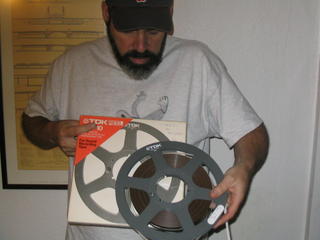
Where's my master?
I have master tapes from Side 1 of the first Tree People album,
and track tapes from both sides of the second Tree People album,
but no master or track tapes from the 2nd side of the first album
Where's my master?
I have master tapes from Side 1 of the first Tree People album,
and track tapes from both sides of the second Tree People album,
but no master or track tapes from the 2nd side of the first album
The missing master of side 2 could not be found, but the reissue will still happen in 2006 because of this new development:
Jackpot steps out, Tiliqua steps in:
Subject: Little question from Tokyo
Dear Mr Stephen Cohen,
Please forgive me to barge in like this. I guess you receive rantings like this mail on a fairly regular basis but I thought I would give it a try. Recently, I got my hands on a copy of the Tree People from a contact I have in Seattle Washington. He suggested it to me and I followed his recommendation. The end result is that I am hooked to the disc now. Just plain fantastic.
I wondered if you still have some copies of the LP available and if so if you are willing to part of them since I have some musician friends here who would love to have a copy. I would be grateful if you had any. Next thing I wanted to ask is whether there is a reissue of this disc in the works or not. If not, my label Tiliqua Records would love to restore the album to its former glory, on LP as well as CD (CD housed in a mini-sizedcarton LP jacket - no plastic cases of course). Please let me know if you might be interested in a project like that. I hope to hear from you soon, and until then I continue to spin my just found copy with much pleasure.
Thanks you for the nice music,
Kindest regards,
Johan
Johan Wellens - Tiliqua Records
Please do let me know what Jackpot decides. I do certainly not want to intrude Jackpot's intentions and hope they are willing to reissue the album. Only if they back down, I will be more than interested to step in. Of course I am interested in releasing the Tree People, even if the original master doesn't show up. Of course I hope it does show up and that Jackpot Records reissues it. Stuff like this have to get out, it is just too beautiful. Working with only a vinyl copy as source is fine, I have another project scheduled that is similar, one master survived, one went missing over the years. But it is the music that counts so I really do not mind, it gives it even an extra edge?(remember to pre-war blues recordings they reissue now, all crackling and dusty sounding, it does not affect the quality of the music).
Johan Wellens - Tiliqua Records
I am sorry to hear that Jackpot Records steps out of the project, but then again I am more than happy to step in. I just love the music and that is the main driving force of my label. Until now I have released only Japanese artists but I was already for a long time on the look out in order to include European and US artists on the label's roster. Only problem was that there is not so much stuff out there that make me go wild. But then I heard the Tree People record and I went ballistic. While everyone is raving about Six Organs, Tower recordings and that kind of bands I discovered that you were doing basically similar stuff but only way ahead of everyone else so I was so (and still am) so excited!! Hell, even my 2 year old daughter loves it.
Johan Wellens - Tiliqua Records
NEXT RELEASE: The TREE PEOPLE: "S/T". (TILAR-5003). First ever reissue of this excellent privately released acid folk gem out of 1979. One of the best discs in its genre and we are totally psyched about being able to present a whole new audience with this masterpiece. Totally mind blowing disc, one of my personal top 10 records of all time. Due end of July, housed in sturdy gatefold mini LP sleeve jackets, with obi and liner notes. Johan Wellens, Tiliqua Records
Pot of Gold lyrics, written by Stephen Cohen in 1979, still ring true today:
You've been wondering if you could be playing for anyone else. Do you like pushing in line, wasting your time, making a fool of yourself?
There are few who still can see the rainbow. Everyone's pushing for the pot of gold. It's not what you've got to give, it's how you're sold, who you know.
I've been wondering if what we might be missing can't be sold. Did you lose your rainbow in the pot of gold?
You've been wondering if you could be playing for anyone else. Do you like pushing in line, wasting your time, making a fool of yourself?
There are few who still can see the rainbow. Everyone's pushing for the pot of gold. It's not what you've got to give, it's how you're sold, who you know.
I've been wondering if what we might be missing can't be sold. Did you lose your rainbow in the pot of gold?
The Tree People album surfaces worldwide:
We also have an amazing new CD on the always great Tiliqua Records from Japan. The Tree People CD - highly recommended Pacific Northwest weird folk from the late 70's.
Beta-lactam Ring Records
Tiliqua Records is psyched about being able to present a whole new audience and generation with the lysergic beauty of the Tree People's sole recorded artifact, a privately released acid folk gem out of 1979. In http://www.volctimes when people are all getting excited about media-created scenes like “New Weird America” and “Freak Folk”, they seem to overlook the fact that such music was already being created decades ago. The Tree People is evidence of such a splash of creativity that sadly enough was doomed to disappear within the cracks of obscurity. Until now. Tiliqua was granted the opportunity to restore this gem and with the kind collaboration of Mr. Cohen of the Tree People, who provided me with the master tapes and a seemingly unlimited support, Tiliqua was able to prepare this reissue. To me, this album is one of the singular most beautiful gems to have crossed my path and words always fall short in an attempt to describe the aural sensation it unleashes. “Upon listening today this hushed and intimate feeling still resonates through the music – the record possesses an extraordinarily potent atmosphere that still intoxicates the senses after so many years. Over a combustible backing dominated by shimmering strings, bone-shaking hand percussion rhythms, and quivering sensuous threads of eastern-toned flute playing, the group succeeded in concocting up a syncretic combination of meditative Indian raga, western folk stylings and idiosyncratic melodic ideas. The music breathes out intimacy and communicates with a rare directness - hooking you instantly with sheer aural bliss derived from the melody, from the flowing beat, from the sound of the words and syllables and of all those separate elements interacting with each other, rendered into a concentrated, gracious flow of lunar notes. The album's compositions have so many hidden qualities, all breathing out deep and affectionate sentiments that reveal, just like a lotus flower centered on the axis with its petals unfolding towards the circumference, a streamlined adhesion towards the group's' own singular creed. Listen to it and you may feel like awakening from a deep slumber, your unconsciousness leaking away as aspects of reality slowly mix in with the rest of your already blurred mindset.” First time ever official reissue, housed in a sturdy mini-LP styled gatefold sleeve http://www.blrrecords.com/prod/1252/til5003.html
from the Johan Wellens' CD liner notes, on the Beta-lactam Ring Records (the United States distributer) web site
Beautifully presented reissue of this legendary real-people/outside psych-folk side, originally released in 1979. Johan Wellens talks of it as being in the lineage of "Dino Valente, Erica Pomerance, Didi Favreau, Virgin Insanity, Gary Higgins, Kenneth Higney and Roger Rodier" but you might wanna throw in a touch of Roky's acoustic demos, a more lugubriously-stoned Tim Hardin, some pastoral modal guitar/hand-percussion jams that could almost be Six Organs Of Admittance, Roy Harper's classic Harvest recordings, psychedelic Donovan and even a hint of Help Yourself. Very beautiful/intimate atmosphere and possessed of *that* necessary star-crossed/lost in time element that gets record collectors hot under their three chins. Beautiful heavy duty gatefold sleeve with obi strip and booklet with liners by Johan. http://www.volcanictongue.com/artist.php?art=The+Tree+People
from the Volcanic Tongue (distributer out of Scotland) web site
Singer-songwriter Stephen Cohen gathered around him two good musicians to work with : percussionist and recorder player Jeff Stier, and flautist Rachel Laderman, forming a trio under the name Tree People. After a year of performing and practicing the group had the chance to make a recording in a local recording studio in the forest, with additional guest musician James Thornbury, (who was going to be a member of the Canned Heat later, in their second period) on bass, slide-guitar and vocals. The recording session showed all qualities of a one chance in a lifetime where everything seemed to come together, even when they only had just one weekend to record. The album was pressed as a 1000 copies. Due to personal obligations, the group never was launched properly after the recording. Even when in 1984, they still did a second cassette-only release, “Human Voices”, this couldn’t prevent Tree People to slowly submerge. Stephen Cohen however continued with a comparable musical style interest with three more releases during this new century.
The first quality which I noticed immediately on the opening track, “Stranger” is Stephen Cohen’s beautiful and emotionally rich voice, a song where the lyrics becomes rich with feeling through this performance. Each track lands into an instrumental improvisation of a rare affectionate concentration. “Sliding” with hand-percussion and slide-guitar has an acid folkblues feeling. Also the song “Pot of Gold” has a delicate rhythmic evolution carried out by the song with a great emotional strength, and some improvisation on flute, bass, guitar. The calmness and delicacy of the unfolding instrumental “Opus” is from a rare quality, which makes it fit well with the Ptarmigan release I also reviewed on this page. “Morning Song” on side B is based upon a happy, traditional fast Cuban rhythm with a jazzy evolution, finding its own personal way of song into it. “Space heater” once more digs back into the delicacy of the acid folk inspiration, simple and powerful, creating blushes of warmth with a vivid acoustic body. It is this feeling which is held strong during the whole recording, and makes this release so special to be appreciated wholeheartedly and easily.
The CD is released in a mini LP sleeve.
PS. Tiliqua Records is run by former Antwerp Radio Centraal DJ Johan Wellens, who moved to Japan after his studies in Japanology with a case study in Japanese electronic and progressive music. He also is a record collector. This album is one of his favorites of all time.
Gerald Van Waes, radioshow "Psyche van het Folk" web site (Belgium)
We also have an amazing new CD on the always great Tiliqua Records from Japan. The Tree People CD - highly recommended Pacific Northwest weird folk from the late 70's.
Beta-lactam Ring Records
Tiliqua Records is psyched about being able to present a whole new audience and generation with the lysergic beauty of the Tree People's sole recorded artifact, a privately released acid folk gem out of 1979. In http://www.volctimes when people are all getting excited about media-created scenes like “New Weird America” and “Freak Folk”, they seem to overlook the fact that such music was already being created decades ago. The Tree People is evidence of such a splash of creativity that sadly enough was doomed to disappear within the cracks of obscurity. Until now. Tiliqua was granted the opportunity to restore this gem and with the kind collaboration of Mr. Cohen of the Tree People, who provided me with the master tapes and a seemingly unlimited support, Tiliqua was able to prepare this reissue. To me, this album is one of the singular most beautiful gems to have crossed my path and words always fall short in an attempt to describe the aural sensation it unleashes. “Upon listening today this hushed and intimate feeling still resonates through the music – the record possesses an extraordinarily potent atmosphere that still intoxicates the senses after so many years. Over a combustible backing dominated by shimmering strings, bone-shaking hand percussion rhythms, and quivering sensuous threads of eastern-toned flute playing, the group succeeded in concocting up a syncretic combination of meditative Indian raga, western folk stylings and idiosyncratic melodic ideas. The music breathes out intimacy and communicates with a rare directness - hooking you instantly with sheer aural bliss derived from the melody, from the flowing beat, from the sound of the words and syllables and of all those separate elements interacting with each other, rendered into a concentrated, gracious flow of lunar notes. The album's compositions have so many hidden qualities, all breathing out deep and affectionate sentiments that reveal, just like a lotus flower centered on the axis with its petals unfolding towards the circumference, a streamlined adhesion towards the group's' own singular creed. Listen to it and you may feel like awakening from a deep slumber, your unconsciousness leaking away as aspects of reality slowly mix in with the rest of your already blurred mindset.” First time ever official reissue, housed in a sturdy mini-LP styled gatefold sleeve http://www.blrrecords.com/prod/1252/til5003.html
from the Johan Wellens' CD liner notes, on the Beta-lactam Ring Records (the United States distributer) web site
Beautifully presented reissue of this legendary real-people/outside psych-folk side, originally released in 1979. Johan Wellens talks of it as being in the lineage of "Dino Valente, Erica Pomerance, Didi Favreau, Virgin Insanity, Gary Higgins, Kenneth Higney and Roger Rodier" but you might wanna throw in a touch of Roky's acoustic demos, a more lugubriously-stoned Tim Hardin, some pastoral modal guitar/hand-percussion jams that could almost be Six Organs Of Admittance, Roy Harper's classic Harvest recordings, psychedelic Donovan and even a hint of Help Yourself. Very beautiful/intimate atmosphere and possessed of *that* necessary star-crossed/lost in time element that gets record collectors hot under their three chins. Beautiful heavy duty gatefold sleeve with obi strip and booklet with liners by Johan. http://www.volcanictongue.com/artist.php?art=The+Tree+People
from the Volcanic Tongue (distributer out of Scotland) web site
Singer-songwriter Stephen Cohen gathered around him two good musicians to work with : percussionist and recorder player Jeff Stier, and flautist Rachel Laderman, forming a trio under the name Tree People. After a year of performing and practicing the group had the chance to make a recording in a local recording studio in the forest, with additional guest musician James Thornbury, (who was going to be a member of the Canned Heat later, in their second period) on bass, slide-guitar and vocals. The recording session showed all qualities of a one chance in a lifetime where everything seemed to come together, even when they only had just one weekend to record. The album was pressed as a 1000 copies. Due to personal obligations, the group never was launched properly after the recording. Even when in 1984, they still did a second cassette-only release, “Human Voices”, this couldn’t prevent Tree People to slowly submerge. Stephen Cohen however continued with a comparable musical style interest with three more releases during this new century.
The first quality which I noticed immediately on the opening track, “Stranger” is Stephen Cohen’s beautiful and emotionally rich voice, a song where the lyrics becomes rich with feeling through this performance. Each track lands into an instrumental improvisation of a rare affectionate concentration. “Sliding” with hand-percussion and slide-guitar has an acid folkblues feeling. Also the song “Pot of Gold” has a delicate rhythmic evolution carried out by the song with a great emotional strength, and some improvisation on flute, bass, guitar. The calmness and delicacy of the unfolding instrumental “Opus” is from a rare quality, which makes it fit well with the Ptarmigan release I also reviewed on this page. “Morning Song” on side B is based upon a happy, traditional fast Cuban rhythm with a jazzy evolution, finding its own personal way of song into it. “Space heater” once more digs back into the delicacy of the acid folk inspiration, simple and powerful, creating blushes of warmth with a vivid acoustic body. It is this feeling which is held strong during the whole recording, and makes this release so special to be appreciated wholeheartedly and easily.
The CD is released in a mini LP sleeve.
PS. Tiliqua Records is run by former Antwerp Radio Centraal DJ Johan Wellens, who moved to Japan after his studies in Japanology with a case study in Japanese electronic and progressive music. He also is a record collector. This album is one of his favorites of all time.
Gerald Van Waes, radioshow "Psyche van het Folk" web site (Belgium)
Johan of Tiliqua Records has now placed The Tree People reissue CD with an additional distributer, Aquarius Records of San Francisco, They have a huge mailing list worldwide of some 100,000 people. Here is their review:
TREE PEOPLE, THE s/t (Tiliqua)
Not to be confused with Doug Martsch's amazing nineties outfit, the Treepeople, -these- Tree People are equally amazing, but are a whole different proposition.
This disc was originally released as a super limited lp way back in 1979 and managed to quietly disappear. Now, here we are nearly three decades later, and whattaya know? There's a whole movement of modern free folk, 'freak' folk and the like, and if you didn't know better, pretty sure we could pass this off as some strange super limited cd-r by some modern folk revivalists. But keen ears would certainly be able to tell. This is so entirely original (especially for the time) and genuine sounding. Mostly acoustic guitars, flute and vocals, the Tree People had two distinct sounds, the first, a lilting melancholy moonlit folk, like Cat Stevens or Van Morrison, a gorgeous lazy drawl, rich and lustrous, over simple folk and fluttering flutes, dreamy and gorgeous, sounding like some lost folk classic one minute, a strange "Girl From Ipanema" style shuffle the next. But even at it's sweetest and softest, the record seems to always have a hint of melancholy, sometimes even a trace of ominous foreboding. Which definitely gives the songs a subtly dark undercurrent. The majority of the record however is spent in full on hippy jam mode. Very Comus-like at times (especially on track two, "Sliding"), wild steel string excursions, dense tangles of fingerpicked melodies and aggressive strummed riffs, with a definite raga like vibe, all over a smattering of hand drums and tablas, a glorious drifting buzzing steel string dronefolk, that just sounds so incredibly timeless. Elsewhere, the same jams evolve into more tranquil acoustic dreaminess, with the flutes floating over sweet lilting melodies, but even then, the songs will be peppered with sudden bursts of buzzing slide guitar, or brief squalls of atonal fingerpicking. SO cool. And considering the current love of all things freaky and folky, it's sort of amazing that stuff like this was already being made 27 years ago!
Obviously, fans of the current crop of modern folk troubadours will find this absolutely essential, Devandra, Vetiver, Espers, Newsom, whatever your particular poison, the Tree People will fit in frighteningly well. Hard to say whether it speaks to the prescience of the Tree People, or just to how much these modern bands have actually been 'borrowing'. Either way, this is absolutely essential.
Packaged in a super deluxe Japanese miniature gatefold style cd sleeve, with a printed obi, and extensive liner notes in English and Japanese!
Other Music of New York City is now carrying The Tree People. Here is what they have to say about it :
The Tree People
(Tiliqua)
Thought this might've been unreleased songs by Doug Martsch's old band, but this is a reissue of a legendary late '70s private-press folk album out of Oregon, led by guitarist and songwriter Stephen Cohen. Within lie nine thoroughly stunning examples of outsider folk, informed by the heat of Delta blues and the darker direction of serious, post-Woodstock singer-songwriter a la Joni Mitchell or Van Morrison, all the while serving within and without the traditions of American folk. The arrangements here are cunning yet gentle; the playing assured in stature but evocative and searching in execution. Rests aside the Gary Higgins and Virgin Insanity reissues as a pinnacle of beatific, pristinely executed 20th century folk. Cohen's musicianship is something you could get lost in for hours on end. [DM]
TREE PEOPLE, THE s/t (Tiliqua)
Not to be confused with Doug Martsch's amazing nineties outfit, the Treepeople, -these- Tree People are equally amazing, but are a whole different proposition.
This disc was originally released as a super limited lp way back in 1979 and managed to quietly disappear. Now, here we are nearly three decades later, and whattaya know? There's a whole movement of modern free folk, 'freak' folk and the like, and if you didn't know better, pretty sure we could pass this off as some strange super limited cd-r by some modern folk revivalists. But keen ears would certainly be able to tell. This is so entirely original (especially for the time) and genuine sounding. Mostly acoustic guitars, flute and vocals, the Tree People had two distinct sounds, the first, a lilting melancholy moonlit folk, like Cat Stevens or Van Morrison, a gorgeous lazy drawl, rich and lustrous, over simple folk and fluttering flutes, dreamy and gorgeous, sounding like some lost folk classic one minute, a strange "Girl From Ipanema" style shuffle the next. But even at it's sweetest and softest, the record seems to always have a hint of melancholy, sometimes even a trace of ominous foreboding. Which definitely gives the songs a subtly dark undercurrent. The majority of the record however is spent in full on hippy jam mode. Very Comus-like at times (especially on track two, "Sliding"), wild steel string excursions, dense tangles of fingerpicked melodies and aggressive strummed riffs, with a definite raga like vibe, all over a smattering of hand drums and tablas, a glorious drifting buzzing steel string dronefolk, that just sounds so incredibly timeless. Elsewhere, the same jams evolve into more tranquil acoustic dreaminess, with the flutes floating over sweet lilting melodies, but even then, the songs will be peppered with sudden bursts of buzzing slide guitar, or brief squalls of atonal fingerpicking. SO cool. And considering the current love of all things freaky and folky, it's sort of amazing that stuff like this was already being made 27 years ago!
Obviously, fans of the current crop of modern folk troubadours will find this absolutely essential, Devandra, Vetiver, Espers, Newsom, whatever your particular poison, the Tree People will fit in frighteningly well. Hard to say whether it speaks to the prescience of the Tree People, or just to how much these modern bands have actually been 'borrowing'. Either way, this is absolutely essential.
Packaged in a super deluxe Japanese miniature gatefold style cd sleeve, with a printed obi, and extensive liner notes in English and Japanese!
Other Music of New York City is now carrying The Tree People. Here is what they have to say about it :
The Tree People
(Tiliqua)
Thought this might've been unreleased songs by Doug Martsch's old band, but this is a reissue of a legendary late '70s private-press folk album out of Oregon, led by guitarist and songwriter Stephen Cohen. Within lie nine thoroughly stunning examples of outsider folk, informed by the heat of Delta blues and the darker direction of serious, post-Woodstock singer-songwriter a la Joni Mitchell or Van Morrison, all the while serving within and without the traditions of American folk. The arrangements here are cunning yet gentle; the playing assured in stature but evocative and searching in execution. Rests aside the Gary Higgins and Virgin Insanity reissues as a pinnacle of beatific, pristinely executed 20th century folk. Cohen's musicianship is something you could get lost in for hours on end. [DM]
I was able to get in touch with James Thornbury, who was living in Australia after leaving Eugene and touring for 10 years as the front man of the legendary blues band, Canned Heat. Here's what he had to say when he heard The Tree People album was being reissued:
Four sources caught up with me to say you were looking for me, and what a surprise that after all these years you're having renewed interest in your "Tree People" projects. As the Aussie's say, "Good on Ya." From the first time I heard you at the "Truckstop" I dug what you were doin'. That sound is unique to only you. I was always partial to "Bring in the Water." Your Tree People album was the first I was ever a part of and I remember you telling me there would be many more. -James Thornbury, bass, backup vocals and slide guitar on the Tree People album
Four sources caught up with me to say you were looking for me, and what a surprise that after all these years you're having renewed interest in your "Tree People" projects. As the Aussie's say, "Good on Ya." From the first time I heard you at the "Truckstop" I dug what you were doin'. That sound is unique to only you. I was always partial to "Bring in the Water." Your Tree People album was the first I was ever a part of and I remember you telling me there would be many more. -James Thornbury, bass, backup vocals and slide guitar on the Tree People album
2007:
Tom Hayes, Gnosis website
8-June-2007 The Tree People
The Tree People were an Oregon based acoustic group centered around guitarist/vocalist/songwriter Stephen Cohen (who had recently been transplanted, hobo style coffee house to coffee house, from Rhode Island). “The Tree People” was privately released in 1979 and quickly disappeared into specialists collections. On the surface it would appear to be just another basic singer songwriter album, with an environmentalist message. Fortunately, it’s nothing of the sort. Rather “The Tree People” is a meditative, deeply introspective work, with a stunningly clear production, that really does make one feel they are amongst natural surroundings. The best tracks feature recorder and flute, such as ‘Opus’ (my personal favorite), ‘Pot of Gold’, ‘Morning Song’ and ‘The Pineapple Song’. Cohen has a slight rural twang in his voice, one that seems confident yet vulnerable. Despite the sparse nature of the recording, The Tree People are quite a distant cousin to the recent free-folk artists on exhibit today. For progressive folk fans, the comparisons go northwards towards some similarly minded Canadians. Perhaps most obvious would be the Vancouver based Ptarmigan, though there’s not a hint of aggression in The Tree People. But the acoustic guitar, fragile vocals and ample use of recorder are instantly recognizable. As well, there are similarities with their French speaking brethren in Quebec, such as L’Engouvelent or the earliest works by Connivence. I’ve seen comparisons as far-fetched as Comus, and I would say that’s about as far as one can get from The Tree People. Evil sounding aggressive pagan music? Not The Tree People! How about a new movement called Introspectica Americana? As is so often the case, due to family and career responsibilities, this was to be the end of the 4 piece band. They marched on as duo, even managing to get out a cassette in 1984 titled “Human Voices”. The CD reissue on Tiliqua Records is stunning. A beautiful Japanese mini-LP, extra thick cardboard, with a full history, photos, etc… It’s very obvious that this is a labor of love, and that the label owner is a huge fan of the album. Bravo.
Here is a review from Boomkat, a U.K. web site:
THE TREE PEOPLE - The Tree People
TILIQUA
CD // £14.99
It's always interesting to me when you throw an album into the wonderful (and occasionally lifesaving) Google machine and it returns absolutely nothing of use. Taking the Tree People's 'Some Random Impressions' into the realms of internet searching brings up quite surprisingly one of my favourite movies, the splatter/exploitation classic 'Cannibal Holocaust' - a far cry from the pastoral folk found on the album itself, but proof if it were needed that the record is more than obscure. Tiliqua records was introduced to us only a week ago with their simply sublime porn-themed 'Erotic Oriental Sunshine' series of cds, but here they are digging in the archives of American folk music and have discovered a rare and beautiful gem. Coming as ever with extensive notes on the band and the release itself, Tiliqua have proved beyond doubt that they really know how to treat re-issues and have got to be doing it better than pretty much everyone else out there at the moment. Although you might not have heard of the Oregon based band before, there should be no reason not to start nosing around at once as this is absolutely essential odd-world folk music, the sort of music that maybe served as one of the links in the chain to the current re-kindling of interest acid folk music and its offshoots. With the usual concoction of lilting acoustic guitars, Eastern percussion and haunting flute, the band put together a quite startling collection of songs, songs which never sounded quite so relevant. While the record may have been ignored on its release, destined to obscurity, now it makes so much sense, with its honesty and heart shining through triumphantly. It makes me happy to see a record like this, 25 years later being dug up and re-discovered, it somehow proves that great records can't be kept down, that people will always be searching out good music however obscure. Fans of Six Organs of Admittance, Espers and the like should look no further for a darned good Christmas treat! Highly Recommended.
from "The Acid Archives" by Patrick Lundborg, Ron Moore and Aaron Milenski:
TREE PEOPLE (Eugene,OR):
"Tree People" 1979
Stark acoustic guitars, recorders, and a variety of percussion instruments make this a distinctive hippie folk album. The Modality Stew comparisons are valid, as there are a number of experimental instrumentals with an Eastern flavor. The vocals are strong, and at times the bleak songs resemble Nick Drake. Not all of it works, most of the songs are variations on two themes (one vocal, the other instrumental), and the one diversion is hopelessly 70s singer-songwriter, but this is definitely something that will interest fans of loner and experimental folk. It's memorable and oddly intense. [AM] = Aaron Milenski
Some thoughts on history, the second Tree People recording, improvisation and "jam bands":
Below is yet another review of The Tree People, this time by Stylus Magazine. Some of my thoughts on history and improvisation, topics brought up in the review: History never really stays the same, but changes as people's thoughts and references change in the present. It is fun to watch The Tree People regularly now mentioned as part of history because of a series of ongoing connections and events which started in the past but continue into the present and future. We are now working on getting a second Tree People recording ready for reissue by Tiliqua later this spring. That album, Human Voices,was released in 1984, only on limited edition cassette. We have not been able to locate the master tapes, but fortunately I have always had the 2" original track tapes, with detailed hand written track sheets, that the engineer from that project, Don Ross of Eugene, gave me so long ago. I and original Tree People member Jeff Stier, with the help of my long time Portland engineer Dean Baskerville, have been remixing Human Voices at Dead Aunt Thelma's Studio here in Portland. It has been an interesting experience, and has opened me up to the idea that time travel is not just a science fiction concept, but a reality that we live every day. More on the remixing process in a future post.
Some of the new reviews coming in have a referred to The Tree People as an early jam band, a free form band, etc., and that is fine and good, but from my perspective as a musician and composer inside the group The Tree People, it is a little different. Almost all our pieces had a set structure and plan, but within that structure there was always room for improvisation, so each time a piece was played you might hear some some subtle differences, some different notes, different shadings, different ideas. Instrumental pieces and interludes would be more fertile ground for improvisation; vocal pieces and sections with written lyrics would be more tightly structured, but would stay fresh with different layers of meaning and emotion. Rehearsals were also part of the composition: we would try sounds and ideas out and collaboratively add to the creation of the pieces that way. Performances would also be a place where we would try things out, bringing the audience "being", with their active listening and participation, into the process, to see what works and continue to refine the work. And in the studio recording, which always seems to become the most focused and intense part of the the process, everything stands still for a moment, there is no past, present or future, all there is is the music.
So in some ways we were a jam band, in some ways not. I still find myself working in a similar fashion in my new work: working with good people who are good musicians, creating a structure that we can depend on, and letting good things happen.
The Tree People
Tiliqua
2006
A-
The forgotten legacy of the Tree People can be pretty accurately traced to one summer weekend in 1979 when Stephen Cohen, Jeff Stier, and Rachel Laderman, headed down to the secluded Rockin’ A Ranch Studio located somewhere in the backwaters of Oregon to record an album. Originally released as a limited run LP, the record slipped almost unnoticed into the dusty annals of history before Johan Wellens (owner and music archivist of Tokyo-based label Tiliqua records) salvaged the album from obscurity and re-released it on his own label. 28 years later, this long-neglected album flags up the telling historical debt that modern folk, in all its freaky derivations, owes to those early, unsung pioneers.
While Cohen’s voice and acoustic guitar predominate, the contributions of Stier (percussion, recorder) and Laderman (flute) are just as essential. They react to his playing almost instinctively. It’s a good thing: the album’s nine songs often feel as though the group is merely jamming around pretty loose structures. (The quietly terrifying “Opus” might exemplify the group’s sensitivity to each other’s tonal fluctuations best.) Even the structured hippy rumba of “Morning Song” still sees Laderman frolicking with abandon on her flute over the syncopated rhythm.
Perhaps as a result of their free-form approach, the tone of the album modulates between a dreamy acquiescence and a jagged purposefulness; the soothingly lyrical “Pot of Gold” and “The Pineapple Song,” the most structured pieces, contrast with the ad hoc violence of “Sliding”’s raw, steel-stringed riffs and raga-esque hand drum and the deliriously heathen cadenzas on “Space Heater” and “No More School.” These impromptu asides make listening to the album slightly unnerving, but hugely compelling—you never know when the next jarring slide or dissonant note is going to land.
Like the reissue of Vashti Bunyan’s Just Another Diamond Day in 2000, this re-release goes some way toward preserving the easily overlooked tradition of outsider / psych folk from sliding into the realm of self-perpetuating myth. But to appreciate this album from a historical perspective, as the mere totem ancestor to folkies like Devendra, Espers, Six Organs of Admittance et al., would be to do it a gross disservice. Of even greater value, The Tree People is an album of exquisitely crafted music, regardless of its undoubted historical import. Here’s to their Lookaftering.
Reviewed by: Paul Teasdale, Stylus Magazine
Tom Hayes, Gnosis website
8-June-2007 The Tree People
The Tree People were an Oregon based acoustic group centered around guitarist/vocalist/songwriter Stephen Cohen (who had recently been transplanted, hobo style coffee house to coffee house, from Rhode Island). “The Tree People” was privately released in 1979 and quickly disappeared into specialists collections. On the surface it would appear to be just another basic singer songwriter album, with an environmentalist message. Fortunately, it’s nothing of the sort. Rather “The Tree People” is a meditative, deeply introspective work, with a stunningly clear production, that really does make one feel they are amongst natural surroundings. The best tracks feature recorder and flute, such as ‘Opus’ (my personal favorite), ‘Pot of Gold’, ‘Morning Song’ and ‘The Pineapple Song’. Cohen has a slight rural twang in his voice, one that seems confident yet vulnerable. Despite the sparse nature of the recording, The Tree People are quite a distant cousin to the recent free-folk artists on exhibit today. For progressive folk fans, the comparisons go northwards towards some similarly minded Canadians. Perhaps most obvious would be the Vancouver based Ptarmigan, though there’s not a hint of aggression in The Tree People. But the acoustic guitar, fragile vocals and ample use of recorder are instantly recognizable. As well, there are similarities with their French speaking brethren in Quebec, such as L’Engouvelent or the earliest works by Connivence. I’ve seen comparisons as far-fetched as Comus, and I would say that’s about as far as one can get from The Tree People. Evil sounding aggressive pagan music? Not The Tree People! How about a new movement called Introspectica Americana? As is so often the case, due to family and career responsibilities, this was to be the end of the 4 piece band. They marched on as duo, even managing to get out a cassette in 1984 titled “Human Voices”. The CD reissue on Tiliqua Records is stunning. A beautiful Japanese mini-LP, extra thick cardboard, with a full history, photos, etc… It’s very obvious that this is a labor of love, and that the label owner is a huge fan of the album. Bravo.
Here is a review from Boomkat, a U.K. web site:
THE TREE PEOPLE - The Tree People
TILIQUA
CD // £14.99
It's always interesting to me when you throw an album into the wonderful (and occasionally lifesaving) Google machine and it returns absolutely nothing of use. Taking the Tree People's 'Some Random Impressions' into the realms of internet searching brings up quite surprisingly one of my favourite movies, the splatter/exploitation classic 'Cannibal Holocaust' - a far cry from the pastoral folk found on the album itself, but proof if it were needed that the record is more than obscure. Tiliqua records was introduced to us only a week ago with their simply sublime porn-themed 'Erotic Oriental Sunshine' series of cds, but here they are digging in the archives of American folk music and have discovered a rare and beautiful gem. Coming as ever with extensive notes on the band and the release itself, Tiliqua have proved beyond doubt that they really know how to treat re-issues and have got to be doing it better than pretty much everyone else out there at the moment. Although you might not have heard of the Oregon based band before, there should be no reason not to start nosing around at once as this is absolutely essential odd-world folk music, the sort of music that maybe served as one of the links in the chain to the current re-kindling of interest acid folk music and its offshoots. With the usual concoction of lilting acoustic guitars, Eastern percussion and haunting flute, the band put together a quite startling collection of songs, songs which never sounded quite so relevant. While the record may have been ignored on its release, destined to obscurity, now it makes so much sense, with its honesty and heart shining through triumphantly. It makes me happy to see a record like this, 25 years later being dug up and re-discovered, it somehow proves that great records can't be kept down, that people will always be searching out good music however obscure. Fans of Six Organs of Admittance, Espers and the like should look no further for a darned good Christmas treat! Highly Recommended.
from "The Acid Archives" by Patrick Lundborg, Ron Moore and Aaron Milenski:
TREE PEOPLE (Eugene,OR):
"Tree People" 1979
Stark acoustic guitars, recorders, and a variety of percussion instruments make this a distinctive hippie folk album. The Modality Stew comparisons are valid, as there are a number of experimental instrumentals with an Eastern flavor. The vocals are strong, and at times the bleak songs resemble Nick Drake. Not all of it works, most of the songs are variations on two themes (one vocal, the other instrumental), and the one diversion is hopelessly 70s singer-songwriter, but this is definitely something that will interest fans of loner and experimental folk. It's memorable and oddly intense. [AM] = Aaron Milenski
Some thoughts on history, the second Tree People recording, improvisation and "jam bands":
Below is yet another review of The Tree People, this time by Stylus Magazine. Some of my thoughts on history and improvisation, topics brought up in the review: History never really stays the same, but changes as people's thoughts and references change in the present. It is fun to watch The Tree People regularly now mentioned as part of history because of a series of ongoing connections and events which started in the past but continue into the present and future. We are now working on getting a second Tree People recording ready for reissue by Tiliqua later this spring. That album, Human Voices,was released in 1984, only on limited edition cassette. We have not been able to locate the master tapes, but fortunately I have always had the 2" original track tapes, with detailed hand written track sheets, that the engineer from that project, Don Ross of Eugene, gave me so long ago. I and original Tree People member Jeff Stier, with the help of my long time Portland engineer Dean Baskerville, have been remixing Human Voices at Dead Aunt Thelma's Studio here in Portland. It has been an interesting experience, and has opened me up to the idea that time travel is not just a science fiction concept, but a reality that we live every day. More on the remixing process in a future post.
Some of the new reviews coming in have a referred to The Tree People as an early jam band, a free form band, etc., and that is fine and good, but from my perspective as a musician and composer inside the group The Tree People, it is a little different. Almost all our pieces had a set structure and plan, but within that structure there was always room for improvisation, so each time a piece was played you might hear some some subtle differences, some different notes, different shadings, different ideas. Instrumental pieces and interludes would be more fertile ground for improvisation; vocal pieces and sections with written lyrics would be more tightly structured, but would stay fresh with different layers of meaning and emotion. Rehearsals were also part of the composition: we would try sounds and ideas out and collaboratively add to the creation of the pieces that way. Performances would also be a place where we would try things out, bringing the audience "being", with their active listening and participation, into the process, to see what works and continue to refine the work. And in the studio recording, which always seems to become the most focused and intense part of the the process, everything stands still for a moment, there is no past, present or future, all there is is the music.
So in some ways we were a jam band, in some ways not. I still find myself working in a similar fashion in my new work: working with good people who are good musicians, creating a structure that we can depend on, and letting good things happen.
The Tree People
Tiliqua
2006
A-
The forgotten legacy of the Tree People can be pretty accurately traced to one summer weekend in 1979 when Stephen Cohen, Jeff Stier, and Rachel Laderman, headed down to the secluded Rockin’ A Ranch Studio located somewhere in the backwaters of Oregon to record an album. Originally released as a limited run LP, the record slipped almost unnoticed into the dusty annals of history before Johan Wellens (owner and music archivist of Tokyo-based label Tiliqua records) salvaged the album from obscurity and re-released it on his own label. 28 years later, this long-neglected album flags up the telling historical debt that modern folk, in all its freaky derivations, owes to those early, unsung pioneers.
While Cohen’s voice and acoustic guitar predominate, the contributions of Stier (percussion, recorder) and Laderman (flute) are just as essential. They react to his playing almost instinctively. It’s a good thing: the album’s nine songs often feel as though the group is merely jamming around pretty loose structures. (The quietly terrifying “Opus” might exemplify the group’s sensitivity to each other’s tonal fluctuations best.) Even the structured hippy rumba of “Morning Song” still sees Laderman frolicking with abandon on her flute over the syncopated rhythm.
Perhaps as a result of their free-form approach, the tone of the album modulates between a dreamy acquiescence and a jagged purposefulness; the soothingly lyrical “Pot of Gold” and “The Pineapple Song,” the most structured pieces, contrast with the ad hoc violence of “Sliding”’s raw, steel-stringed riffs and raga-esque hand drum and the deliriously heathen cadenzas on “Space Heater” and “No More School.” These impromptu asides make listening to the album slightly unnerving, but hugely compelling—you never know when the next jarring slide or dissonant note is going to land.
Like the reissue of Vashti Bunyan’s Just Another Diamond Day in 2000, this re-release goes some way toward preserving the easily overlooked tradition of outsider / psych folk from sliding into the realm of self-perpetuating myth. But to appreciate this album from a historical perspective, as the mere totem ancestor to folkies like Devendra, Espers, Six Organs of Admittance et al., would be to do it a gross disservice. Of even greater value, The Tree People is an album of exquisitely crafted music, regardless of its undoubted historical import. Here’s to their Lookaftering.
Reviewed by: Paul Teasdale, Stylus Magazine
The Tree People return!
Some 30 years after our first rehearsals, Jeff (who moved back to Oregon recently and now lives down the road in Lake Oswego from my house in Portland) and I have started rehearsing as The Tree People again. We have been starting with some of the original material from the Tree People albums we recorded in 1979 and 1984, and I have some new material for The Tree People which we will take apart and put back together in Tree People fashion soon. All of the original material takes on a life of its own each time we play it. It reminds us that the original albums documented a point in time for each piece, and that if we had recorded the same songs at another point in time those versions would be true, but new, with the improvised parts different on any different day.
The rehearsals, now as then, feature not a lot of talking, but concentrated playing and intense listening. Jeff still has a that great sense of melody and rhythm, that great ear, and that great ability to find just the right instrument or tone for each musical moment, using recorders, flute, hand drums, orchestra bells, cymbals and other percussion. And as we play I realize that there is still no one out there doing anything quite like Jeff is doing, and no one out there doing anything quite like we are doing as The Tree People.
I have so many years of performing, recording, and writing and composing behind me since the first albums. I have a better guitar and so much more experience in playing it. I recorded The Tree People albums with a road-tested, beat up old Gibson B25 acoustic and now I play a concert hall quality Martin acoustic with a deeper, brighter, richer tone. But in the end these Tree People reissues have reminded me it is not what kind of guitar you have, it is the life comes through it, and I am so grateful for the experience of playing music, then, now, and again.
The Tree People is a live performance group once again! We have added a wonderful double bass player from Seattle, Rich Hinrichsen, to our lineup. He brings new energy to the proceedings, using a palette of deep, melodic, and interesting sounds on his double bass to fit in nicely with our music. The Tree People performed as a group for the first time in more than 22 years at a small venue, The Hotwire Coffehouse, in Seattle on December 8, 2007. The lineup was myself on guitar and voice, Jeff on recorders, flute, hand drums, orchestra bells and percussion and Rich (who helped set this performance up) on double bass. It was a good way to get our performing feet wet once again. There was a listening audience of about 50 people in attendance. We did songs and pieces from the first two Tree People recordings, as well as some new material that may work its way into a third Tree People recording one day. It was an amazing experience, better than expected, and we are excited and ready for a performance this Friday night at the White Eagle here in Portland.
Music Editor Amy McCullough's column about The Tree People in Willamette Week:
Here Comes Your Fan: Out of the Woods:
About a month ago, I received an email that made me think ’90s punk-grunge outfit the Treepeople (featuring Built to Spill’s Doug Martsch) was reuniting. And, based solely on that band’s dirtied-up, angsty cover of the Smiths’ “Bigmouth Strikes Again”—not to mention my immense BTS fanhood—I was pretty excited. Little did I know I’d learn an underground history lesson in Northwest psych folk instead.
See, Martsch’s Treepeople weren’t the first. Back in 1979, a man named Stephen Cohen went into “a studio in the woods near Eugene” (now-defunct Rockin’ A Ranch) and recorded a self-titled album under the Tree People name—an album one fan laid down 150 bucks for at Portland music store Exiled Records. “It didn’t last for very long,” Exiled owner Scott Simmons recalls. Cohen, who continued to play after the Tree People called it quits in 1985, says of the album’s 2006 Japanese reissue: “It is a nice feeling to do something, have it sit for years, and then be around to see it appreciated.” But to some, that original was already sonic gold: “People into psychedelic folk definitely know about it,” says Simmons.
Here in Portland, plenty of music fans are into psychedelic folk, and—whether those fans know it or not—they could lump the Tree People’s spooky, hypnotic forest folk in with that of legendary faves like Texan duo Charalambides or British psych-folkstress Vashti Bunyan. All share a key aesthetic: a sound that’s one with nature, whether it be evoked by cryptic lyrics, sylvan flute, hand percussion or experimental forays into trancelike string noise.
So why did the Tree People vanish? Cohen’s then-young children made touring a non-option, and original bandmate Jeff Stier (recorders, flute, hand drums) eventually moved to Washington, D.C., for work. When the kind-voiced Cohen started hearing from “collectors [and] music fans who all had somehow discovered our first vinyl album,” he contacted Stier only to find that he was moving back to Oregon. “The enthusiasm for our older recorded output [played] a big part in inspiring us to play again,” says Cohen.
The reincarnated band—which is already working on fresh material with new double-bassist Rich Hinrichsen—played a “small, warm-up performance” this past Saturday at a coffee shop in Seattle. “It was great to get our feet wet again,” says Cohen. Simmons’ response when told the Tree People are playing Portland this week? “Oh, weird.” Yup, and pretty awesome, too.
The Tree People play Friday, Dec. 14, with Jon Koonce and Maggie’s Choice at the White Eagle. 9:30 pm. $6. 21+
"There was a wonderful full house listening audience for the Tree People at the White Eagle in Portland on December 14th, 2007. Several audience members told us after the show that they had our original vinyl Tree People album. We started our set with me and Jeff doing Sliding, then Stranger and Rain, Rain. Our brilliant new double bass player Rich then joined us on the stage and proved himself, as he has done in our rehearsals and at our performance the week before in Seattle, to be a perfect addition to the group. A new instrumental piece we did that night had no title, so we asked the audience for their ideas,and they came up with several good ones during and after the set. We will probably go with Sunday, the name of an audience member's daughter, for that piece. We did many songs from the first two Tree People recordings, and two highlights for me were Pot of Gold (with its long pauses punctuated each time by a return in unison by all 3 musicians) from the first, and Grandfather (which is always a deeply emotional piece for me) from the second. Lyrics which I wrote so many years ago took on new meanings in performance. We closed with what I feel is perhaps our best ever performance of Space Heater, where an extended hold on an open chord in the middle part (which happily surprised me as much as it did Jeff and Rich) accentuated the convergence and groove of guitar, hand drums and percussion, and double bass). Northwest rock/roots icon Jon Koonce opened the evening with an acoustic solo set, and after the Tree People's extended set, my son Abe's great Americana, alt-rock band Maggie's Choice had people dancing (some very spirited and creative dancers appeared on the floor!) late into the night. We are looking forward to more Tree People performances, but I think I will always remember this one."
Some 30 years after our first rehearsals, Jeff (who moved back to Oregon recently and now lives down the road in Lake Oswego from my house in Portland) and I have started rehearsing as The Tree People again. We have been starting with some of the original material from the Tree People albums we recorded in 1979 and 1984, and I have some new material for The Tree People which we will take apart and put back together in Tree People fashion soon. All of the original material takes on a life of its own each time we play it. It reminds us that the original albums documented a point in time for each piece, and that if we had recorded the same songs at another point in time those versions would be true, but new, with the improvised parts different on any different day.
The rehearsals, now as then, feature not a lot of talking, but concentrated playing and intense listening. Jeff still has a that great sense of melody and rhythm, that great ear, and that great ability to find just the right instrument or tone for each musical moment, using recorders, flute, hand drums, orchestra bells, cymbals and other percussion. And as we play I realize that there is still no one out there doing anything quite like Jeff is doing, and no one out there doing anything quite like we are doing as The Tree People.
I have so many years of performing, recording, and writing and composing behind me since the first albums. I have a better guitar and so much more experience in playing it. I recorded The Tree People albums with a road-tested, beat up old Gibson B25 acoustic and now I play a concert hall quality Martin acoustic with a deeper, brighter, richer tone. But in the end these Tree People reissues have reminded me it is not what kind of guitar you have, it is the life comes through it, and I am so grateful for the experience of playing music, then, now, and again.
The Tree People is a live performance group once again! We have added a wonderful double bass player from Seattle, Rich Hinrichsen, to our lineup. He brings new energy to the proceedings, using a palette of deep, melodic, and interesting sounds on his double bass to fit in nicely with our music. The Tree People performed as a group for the first time in more than 22 years at a small venue, The Hotwire Coffehouse, in Seattle on December 8, 2007. The lineup was myself on guitar and voice, Jeff on recorders, flute, hand drums, orchestra bells and percussion and Rich (who helped set this performance up) on double bass. It was a good way to get our performing feet wet once again. There was a listening audience of about 50 people in attendance. We did songs and pieces from the first two Tree People recordings, as well as some new material that may work its way into a third Tree People recording one day. It was an amazing experience, better than expected, and we are excited and ready for a performance this Friday night at the White Eagle here in Portland.
Music Editor Amy McCullough's column about The Tree People in Willamette Week:
Here Comes Your Fan: Out of the Woods:
About a month ago, I received an email that made me think ’90s punk-grunge outfit the Treepeople (featuring Built to Spill’s Doug Martsch) was reuniting. And, based solely on that band’s dirtied-up, angsty cover of the Smiths’ “Bigmouth Strikes Again”—not to mention my immense BTS fanhood—I was pretty excited. Little did I know I’d learn an underground history lesson in Northwest psych folk instead.
See, Martsch’s Treepeople weren’t the first. Back in 1979, a man named Stephen Cohen went into “a studio in the woods near Eugene” (now-defunct Rockin’ A Ranch) and recorded a self-titled album under the Tree People name—an album one fan laid down 150 bucks for at Portland music store Exiled Records. “It didn’t last for very long,” Exiled owner Scott Simmons recalls. Cohen, who continued to play after the Tree People called it quits in 1985, says of the album’s 2006 Japanese reissue: “It is a nice feeling to do something, have it sit for years, and then be around to see it appreciated.” But to some, that original was already sonic gold: “People into psychedelic folk definitely know about it,” says Simmons.
Here in Portland, plenty of music fans are into psychedelic folk, and—whether those fans know it or not—they could lump the Tree People’s spooky, hypnotic forest folk in with that of legendary faves like Texan duo Charalambides or British psych-folkstress Vashti Bunyan. All share a key aesthetic: a sound that’s one with nature, whether it be evoked by cryptic lyrics, sylvan flute, hand percussion or experimental forays into trancelike string noise.
So why did the Tree People vanish? Cohen’s then-young children made touring a non-option, and original bandmate Jeff Stier (recorders, flute, hand drums) eventually moved to Washington, D.C., for work. When the kind-voiced Cohen started hearing from “collectors [and] music fans who all had somehow discovered our first vinyl album,” he contacted Stier only to find that he was moving back to Oregon. “The enthusiasm for our older recorded output [played] a big part in inspiring us to play again,” says Cohen.
The reincarnated band—which is already working on fresh material with new double-bassist Rich Hinrichsen—played a “small, warm-up performance” this past Saturday at a coffee shop in Seattle. “It was great to get our feet wet again,” says Cohen. Simmons’ response when told the Tree People are playing Portland this week? “Oh, weird.” Yup, and pretty awesome, too.
The Tree People play Friday, Dec. 14, with Jon Koonce and Maggie’s Choice at the White Eagle. 9:30 pm. $6. 21+
"There was a wonderful full house listening audience for the Tree People at the White Eagle in Portland on December 14th, 2007. Several audience members told us after the show that they had our original vinyl Tree People album. We started our set with me and Jeff doing Sliding, then Stranger and Rain, Rain. Our brilliant new double bass player Rich then joined us on the stage and proved himself, as he has done in our rehearsals and at our performance the week before in Seattle, to be a perfect addition to the group. A new instrumental piece we did that night had no title, so we asked the audience for their ideas,and they came up with several good ones during and after the set. We will probably go with Sunday, the name of an audience member's daughter, for that piece. We did many songs from the first two Tree People recordings, and two highlights for me were Pot of Gold (with its long pauses punctuated each time by a return in unison by all 3 musicians) from the first, and Grandfather (which is always a deeply emotional piece for me) from the second. Lyrics which I wrote so many years ago took on new meanings in performance. We closed with what I feel is perhaps our best ever performance of Space Heater, where an extended hold on an open chord in the middle part (which happily surprised me as much as it did Jeff and Rich) accentuated the convergence and groove of guitar, hand drums and percussion, and double bass). Northwest rock/roots icon Jon Koonce opened the evening with an acoustic solo set, and after the Tree People's extended set, my son Abe's great Americana, alt-rock band Maggie's Choice had people dancing (some very spirited and creative dancers appeared on the floor!) late into the night. We are looking forward to more Tree People performances, but I think I will always remember this one."
We are very happy to announce, not one, not two, but three new Tree People reissues scheduled for early 2008!
We are so pleased that Tiliqua Records of Tokyo, Japan, who did such a wonderful job on The Tree People reissue CD, is planning to reissue the second Tree People recording, Human Voices, from 1984, as both a CD and limited edition vinyl record in early 2008. You can read more about the original creation and the recent remixing of Human Voices in past posts.
And two other companies will be releasing Tree People music, The Numero Group of Chicago and Guerssen Records of Spain. The Numero Group, voted best reissue company in the United States, will be including No More School, a solo guitar piece from The Tree People, in Wayfaring Strangers: Guitar Soli, a collection of privately released fingerstyle guitar jams, scheduled for release in January 2008. Guerssen Records of Catalonia, Spain, who specializes in vinyl reissues, will be releasing a limited edition vinyl reissue of The Tree People in early 2008. These deals were possible because I have always kept the rights to the music in any deal I have done. Both deals have Johan from Tiliqua Records' blessing and encouragement because each of these great small companies has its own special market, which can only help in gaining interest in The Tree People in new places.
The Remixing of Human Voices:
It has been a nice process remixing Human Voices, with Jeff, my fellow Tree Person, who co-produced and worked on the original mix with me in 1984. What we thought might be the master tape of Human Voices turned out to be a 1/4" tape with a few unfinished pieces and one finished piece called Sketches. As I now remember, at the same time we were recording the rest of the material for Human Voices, we did Sketches on commission from Jack Good, a producer from England who I had met in Santa Fe, New Mexico when I lived there before coming to Eugene (I worked as an extra in a movie, called Catch My Soul that he produced in Santa Fe- that experience and the life of Jack Good are stories in themselves). He was going to use Sketches as part of a soundtrack for a television show he was producing in Los Angeles. I don't know if he ever did use it, but after listening to Sketches Jeff insisted that we had to include it as a bonus track to Human Voices, and after listening to it some more I couldn't agree more, so it will be included as a bonus track at the end of the reissue recording, where it fits perfectly.
The 2" tapes (pictured below) were baked (a process in reissues that prevents the tapes from being too brittle) at Dead Aunt Thelma's Studio in Portland. The music was then transferred to Pro Tools on the computer there and we were ready to go. We were lucky to have two wonderful engineers involved: Don Ross, the original engineer in 1984, recorded the music clearly and left detailed track sheets (pictured below as well) to help us; and, as always, it has been great working with my Portland engineer Dean Baskerville. And with Jeff on board again as co-producer it was a perfect situation. We wanted to keep the remix as close as possible to the original, while using the modern technology and wisdom we have now to make it sound just like we always wanted it to sound, and I think we succeeded.
We are so pleased that Tiliqua Records of Tokyo, Japan, who did such a wonderful job on The Tree People reissue CD, is planning to reissue the second Tree People recording, Human Voices, from 1984, as both a CD and limited edition vinyl record in early 2008. You can read more about the original creation and the recent remixing of Human Voices in past posts.
And two other companies will be releasing Tree People music, The Numero Group of Chicago and Guerssen Records of Spain. The Numero Group, voted best reissue company in the United States, will be including No More School, a solo guitar piece from The Tree People, in Wayfaring Strangers: Guitar Soli, a collection of privately released fingerstyle guitar jams, scheduled for release in January 2008. Guerssen Records of Catalonia, Spain, who specializes in vinyl reissues, will be releasing a limited edition vinyl reissue of The Tree People in early 2008. These deals were possible because I have always kept the rights to the music in any deal I have done. Both deals have Johan from Tiliqua Records' blessing and encouragement because each of these great small companies has its own special market, which can only help in gaining interest in The Tree People in new places.
The Remixing of Human Voices:
It has been a nice process remixing Human Voices, with Jeff, my fellow Tree Person, who co-produced and worked on the original mix with me in 1984. What we thought might be the master tape of Human Voices turned out to be a 1/4" tape with a few unfinished pieces and one finished piece called Sketches. As I now remember, at the same time we were recording the rest of the material for Human Voices, we did Sketches on commission from Jack Good, a producer from England who I had met in Santa Fe, New Mexico when I lived there before coming to Eugene (I worked as an extra in a movie, called Catch My Soul that he produced in Santa Fe- that experience and the life of Jack Good are stories in themselves). He was going to use Sketches as part of a soundtrack for a television show he was producing in Los Angeles. I don't know if he ever did use it, but after listening to Sketches Jeff insisted that we had to include it as a bonus track to Human Voices, and after listening to it some more I couldn't agree more, so it will be included as a bonus track at the end of the reissue recording, where it fits perfectly.
The 2" tapes (pictured below) were baked (a process in reissues that prevents the tapes from being too brittle) at Dead Aunt Thelma's Studio in Portland. The music was then transferred to Pro Tools on the computer there and we were ready to go. We were lucky to have two wonderful engineers involved: Don Ross, the original engineer in 1984, recorded the music clearly and left detailed track sheets (pictured below as well) to help us; and, as always, it has been great working with my Portland engineer Dean Baskerville. And with Jeff on board again as co-producer it was a perfect situation. We wanted to keep the remix as close as possible to the original, while using the modern technology and wisdom we have now to make it sound just like we always wanted it to sound, and I think we succeeded.
Serendipity: the story of a Tree Person signature:
Jackpot Records here in Portland bought some of my 7," 45 rpm singles (released by Ethbo Music of London in 2001 with two songs from my real life and fiction CD from 2000) the other year and asked me to sign them. Tiliqua Records of Tokyo now has a representative, Piotr, living in Portland. Piotr will be working with us and Tiliqua on the artwork and layout for the Human Voices reissue and is also helping get the first Tree People reissue CD into some of the local stores here. Soon after moving to Portland from Japan, Piotr had seen one of those singles at Jackpot and bought one. When I met with him recently, he commented on how cool it was that I signed the record Tree Person in Japanese. I had no idea what he was talking about: I just sign things with my usual signature, a small scrawl which doesn't look like much. But after getting this e-mail from Piotr: "And finally, as promised, I've attached a JPEG file of a scan of the signature from the single I got at Jackpot, with the Japanese letters below and their English meanings. The signature looks so much like handwritten cursive Japanese, I was convinced!", I could see his point, as illustrated below:
Jackpot Records here in Portland bought some of my 7," 45 rpm singles (released by Ethbo Music of London in 2001 with two songs from my real life and fiction CD from 2000) the other year and asked me to sign them. Tiliqua Records of Tokyo now has a representative, Piotr, living in Portland. Piotr will be working with us and Tiliqua on the artwork and layout for the Human Voices reissue and is also helping get the first Tree People reissue CD into some of the local stores here. Soon after moving to Portland from Japan, Piotr had seen one of those singles at Jackpot and bought one. When I met with him recently, he commented on how cool it was that I signed the record Tree Person in Japanese. I had no idea what he was talking about: I just sign things with my usual signature, a small scrawl which doesn't look like much. But after getting this e-mail from Piotr: "And finally, as promised, I've attached a JPEG file of a scan of the signature from the single I got at Jackpot, with the Japanese letters below and their English meanings. The signature looks so much like handwritten cursive Japanese, I was convinced!", I could see his point, as illustrated below:
2008:
The Tree People a pick in Toronto
A weekly dig through the creates for the stuff you really need to hear By Tim Perlich
2008/01/16 Now Magazine, Toronto
Tree for all
Whether you call it freak folk, real people psych or new weird American music, the gently trippy self-titled debut from Oregon’s Tree People – recorded in 79 though it sounds like 69 – has risen to the top of the heap of the genre’s collectible artifacts. And once you hear the eerie flute, wistful strumming and entrancing hand percussion on the magnificently packaged reissue from Tiliqua Records, you’ll quickly understand why this fragile masterwork is so revered by connoisseurs of backwoods hippie hijinks. Fans of Espers, MV & EE and Voice of the Seven Woods should investigate
The Tree People a pick in Toronto
A weekly dig through the creates for the stuff you really need to hear By Tim Perlich
2008/01/16 Now Magazine, Toronto
Tree for all
Whether you call it freak folk, real people psych or new weird American music, the gently trippy self-titled debut from Oregon’s Tree People – recorded in 79 though it sounds like 69 – has risen to the top of the heap of the genre’s collectible artifacts. And once you hear the eerie flute, wistful strumming and entrancing hand percussion on the magnificently packaged reissue from Tiliqua Records, you’ll quickly understand why this fragile masterwork is so revered by connoisseurs of backwoods hippie hijinks. Fans of Espers, MV & EE and Voice of the Seven Woods should investigate
My solo acoustic guitar piece, "No More School", from "The Tree People" album was included in a wonderful collection of solo acoustic guitar music from the 1960's and 1970's released by the Numero Group of Chicago this year. I am very happy to be included, and I would like this album, which has some beautiful solo guitar pieces by some very good players, even if my piece from the Tree People album wasn't on it. One of the other guitarists on the album, Richard Crandell, who has recently released some very special albums playing mbira (thumb piano) on the Tzadik label, was in Eugene (and still is in Eugene) at the same time we were- we knew Richard and we did a show with Richard Crandell and Bill Bartels in a park in Eugene in the the 1980's- you can see a poster from that show in a previous post on this blog, "The Story of Human Voices, the second Tree People album". But back to the Numero Group album- it contains extensive liner notes on the history of what they call "primitive solo acoustic guitar" along with notes on each artist. If you like solo acoustic guitar, or better yet if you like music, I would recommend "Wayfaring Strangers- Guitar Soli". Here is what the Numero Group had to say about my piece in their extensive liner notes:
Label: Numero Group
Released: January 8, 2008
Stephen Cohen
No More School
“I always have played with my bare hands, and never have used a pick.”
The Newport Folk Festival converted endless hordes to the religion of folk music, and not the least among them was Stephen Cohen, who has spent a lifetime writing songs and living thoughtfully. A native Rhode Islander, he had better access than most to the annual festival, and he drank in every ounce of bent Americana that George Wein and Albert Grossman thought fit for the program.
The acoustic guitar had become the rank and file’s instrument, unrivalled at the time to play and compose with. And although Cohen had basic music training for the trombone, his approach to guitar was idiosyncratic from the beginning, though he sought no formal education for it. His natural inclination was fingerstyle, and because there was no one to lead him in any other direction, he went.
On Cohen’s 1979 debut The Tree People, he played a Gibson B25, acquired as a young man and strapped to his back as he rambled about the country for the lion’s share of the 1970s. The guitar featured one crucial alteration: its factory-standard metal bridge had been expertly replaced with a permanent wooden one. After settling in Eugene, Oregon, Cohen formed an acoustic ensemble also known as The Tree People that focused on instrumental composition and improvisation. They borrowed heavily from the concepts of both American Primitives and British Traditionalists on their two self-produced albums, but “No More School” is clearly an ode to the former, a flurry of fingers and thumb picking and strumming all over the drop D tuning. Issued in a one-time pressing of 1000 copies, the album pierced more than a few ears, allowing the group to become something of a go-to opener for Fahey and Pentangle whenever they rambled through Oregon.
Denis Mochary, drummer for the Tree People in 1984
As we wait for Tiliqua Records of Japan to do the CD reissue of Human Voices and for Guerssen Records of Spain to do the vinyl reissue of Human Voices, our thoughts are with Denis Mochary, a drummer who played with the Tree People for a time, and played beautiful, sensitive drum parts on a set of drums shaped like singing trumpets on the songs Thomas, Rain, Rain and Opus II on Human Voices. He also played a soulful, creative part on Sketches, a piece we recorded at the Human Voices sessions but did not include in the original cassette. We will be including Sketches as the last track in the Human Voices reissues and would like to dedicate that piece to Denis. We are moved and honored that we got to know him during that brief time!
I wondered from time to time where Denis was and what he was doing after he left Eugene to return to the East Coast. Sadly, it turns out he passed away in Japan several years ago from kidney cancer. I found out about his death just a few months back when I got an e-mail from his younger brother, who found out about Denis' stint with The Tree People from his daughter, who was googling her uncle and found our Tree People sites. His brother wrote: "He lived in Japan for several years, married to a Japanese gal. He was happy with his life there……and seemed to have found the spiritual component he was always seeking. At least, I like to think of him that way. Anyway, it is a very small world, and I am excited to see that the music you made together lives on in its own way."
Band member Jeff Stier added some thoughts about Denis:
"When I think of Denis, I recall kindness and humor. He had that tough guy mug and a big heart. I've got a few photos of a concert we did at one of Eugene's parks. The photos show us on a slightly raised stage with a big, blue Oregon summer sky behind us. Denis is kind of hidden behind those strange horn shaped drums of his - no doubt tapping out some subtle and perfect rhythm. He still lingers in my memory." Jeff Stier
I wondered from time to time where Denis was and what he was doing after he left Eugene to return to the East Coast. Sadly, it turns out he passed away in Japan several years ago from kidney cancer. I found out about his death just a few months back when I got an e-mail from his younger brother, who found out about Denis' stint with The Tree People from his daughter, who was googling her uncle and found our Tree People sites. His brother wrote: "He lived in Japan for several years, married to a Japanese gal. He was happy with his life there……and seemed to have found the spiritual component he was always seeking. At least, I like to think of him that way. Anyway, it is a very small world, and I am excited to see that the music you made together lives on in its own way."
Band member Jeff Stier added some thoughts about Denis:
"When I think of Denis, I recall kindness and humor. He had that tough guy mug and a big heart. I've got a few photos of a concert we did at one of Eugene's parks. The photos show us on a slightly raised stage with a big, blue Oregon summer sky behind us. Denis is kind of hidden behind those strange horn shaped drums of his - no doubt tapping out some subtle and perfect rhythm. He still lingers in my memory." Jeff Stier
Guerssen Records of Spain vinyl reissue of The Tree People
Guerssen Records of Spain has just released the vinyl reissue of our first album, from 1979, The Tree People. This reissue includes an insert that includes photos and artwork that have never been published until now. We are very happy with the work Antoni and his staff at Guerssen Records has done with this. They will also be doing the vinyl and CD reissues of Human Voices, our 1984 album, in early 2009, as well as the vinyl and CD reissues of our new album (which very close to being completed!) later in 2009, and we are looking forward it!
Guerssen Records of Spain to release old and new Tree People albums in 2009
We cannot thank Johan and Tiliqua Records of Japan enough for the beautiful job they did with The Tree People reissue CD in 2006. Johan's belief in the album and the resulting positive attention that the album received helped to inspire the resurrection of the Tree People as a performing and recording group. But it didn't look like Tiliqua Records was going to get to the Human Voices (our album from 1984) reissue for some time, if at all, so we felt it was time to go with Guerssen, a wonderful company in Spain, who did the vinyl reissue of The Tree People album earlier this year. Guerssen's catalog is a perfect fit for the Tree People, and I am looking forward to working with Antoni and the rest of the Guerssen staff on our next two releases. Guerssen will be reissuing vinyl and CD editions of Human Voices in early 2009, and will also be releasing our third and new album (which we are well on the way to completing) later in 2009.
The Tree People story continues!
We cannot thank Johan and Tiliqua Records of Japan enough for the beautiful job they did with The Tree People reissue CD in 2006. Johan's belief in the album and the resulting positive attention that the album received helped to inspire the resurrection of the Tree People as a performing and recording group. But it didn't look like Tiliqua Records was going to get to the Human Voices (our album from 1984) reissue for some time, if at all, so we felt it was time to go with Guerssen, a wonderful company in Spain, who did the vinyl reissue of The Tree People album earlier this year. Guerssen's catalog is a perfect fit for the Tree People, and I am looking forward to working with Antoni and the rest of the Guerssen staff on our next two releases. Guerssen will be reissuing vinyl and CD editions of Human Voices in early 2009, and will also be releasing our third and new album (which we are well on the way to completing) later in 2009.
The Tree People story continues!
|
2009: Human Voices album is reissued by Guerrsen Records back cover: Thomas continues to be a fan favorite: |
The review below is definitely entertaining and positive despite Casey's allergic reaction to flutes.
One correction- the words to the song Human Voices are:
in the morning, when you're still sleeping, when you have those crazy nightmares,
I swear I hear, within the bird song, human voices joining along, in a laughing song
(so that's why people print out the words on albums! I guess we will print the words on the new album when it is ready!)
The Tree People Human Voices (Guerssen) By CASEY JARMAN, Willamette Week [July 8th, 2009]
[FLUTE FOXES] Within the first 30 seconds of the Tree People’s reissued sophomore album, Human Voices, the psych-folk trio tests an aughties listener’s threshold for both the weird and the tender: “In the morning when you’re still sleeping/ When you have those crazy nightmares/ I swear I’m here within the birdsong/ Human voices joining along in our loving song.” These trippy lines are beautifully delivered—spooky three-part harmonies paired with unpredictable chord and tempo changes rattling out from a finger-picked guitar. But when the flute swoops in like an excitable raven, cynicism and years of anti-Renaissance Fair conditioning creep into one’s opinion.
About half of Human Voices is instrumental, with Stephen Cohen’s voice and acoustic guitar canoodling with Jeff Stier’s expertly played flutes and organic percussion. And while the wordless compositions—anchored by Stephen’s brother Jeremy on bass—are coolly melodic, it’s a side of the recently rebuilt trio that is going to be tough for modern audiences to contextualize. Oregon was a gentler place in 1984, it would seem. Still, the Tree People’s lyrically driven songs are both accessible and modern. The haunting “Grandfather” evokes Lou Reed more than Donovan; disc highlight “Thomas” is a Simon and Garfunkel-esque story song, and the earnest “That’s Entertainment” is both relatable and thrillingly told. Picking up a Human Voices isn’t quite like discovering Nick Drake or John Fahey—musical spirits who seem more natural now than they ever did when they were in their prime songwriting years. Instead, one has to meet Treepeople halfway between now and then. But Human Voices, like the trio’s fascinating 1979 self-titled debut, provides another excellent reason to do so.
Foxy Digitalis website:
The Tree People "Human Voices" Guerssen
This is a welcome 25th anniversary reissue of this Oregon trio’s rare, cassette-only sophomore effort. Dreamy, mellow folk tunes paved the way for the current new folk movement and unique touches like the echoed vocals on “Grandfather” and the tinkling bells on “Rain, Rain” make this something special. Jeff Stier’s flute and recorder establishes a warm, floating vibe throughout the mostly instrumental album, and the liner notes from main composer Stephen Cohen are both historical and informative. The Spanish air to Cohen’s guitar on the lengthy “Things Fall Apart” is both hesitant and inviting, and draws the listener in to Stier’s recorder/flute flourishes, transporting the listener to an otherworldly plane, part gypsy dance, part ominous bullfight. (Note: The bonus track, “Sketches,” also benefits from this earthy, European vibe and is generously dedicated to the band’s part-time drummer, Denis Mochary, who played on it and several other tracks and who passed away in Japan several years ago.)
“Thomas” is a live favorite that’s part Simon & Garfunkle, part Peter, Paul & Mary and 100% fun – the harmonies are particularly well-arranged, weaving wonderfully around Stier’s recorders. This is one for those rainy day dreamaways where you find your mind wandering off to lonely strolls through the park, or navel gazing under the old apple tree out back. And if you can’t get up and do the jolly jig to “Dance,” then your get up and go has got up and gone and it’s time to return to your armchair traveling…back to the kinder, gentler times of 1984 to climb up and build a tree house to hang out with The Tree People and mellow out to “Human Voices.”
Jeff Penczak (11 August, 2009)
The Tree People "Human Voices" Guerssen
This is a welcome 25th anniversary reissue of this Oregon trio’s rare, cassette-only sophomore effort. Dreamy, mellow folk tunes paved the way for the current new folk movement and unique touches like the echoed vocals on “Grandfather” and the tinkling bells on “Rain, Rain” make this something special. Jeff Stier’s flute and recorder establishes a warm, floating vibe throughout the mostly instrumental album, and the liner notes from main composer Stephen Cohen are both historical and informative. The Spanish air to Cohen’s guitar on the lengthy “Things Fall Apart” is both hesitant and inviting, and draws the listener in to Stier’s recorder/flute flourishes, transporting the listener to an otherworldly plane, part gypsy dance, part ominous bullfight. (Note: The bonus track, “Sketches,” also benefits from this earthy, European vibe and is generously dedicated to the band’s part-time drummer, Denis Mochary, who played on it and several other tracks and who passed away in Japan several years ago.)
“Thomas” is a live favorite that’s part Simon & Garfunkle, part Peter, Paul & Mary and 100% fun – the harmonies are particularly well-arranged, weaving wonderfully around Stier’s recorders. This is one for those rainy day dreamaways where you find your mind wandering off to lonely strolls through the park, or navel gazing under the old apple tree out back. And if you can’t get up and do the jolly jig to “Dance,” then your get up and go has got up and gone and it’s time to return to your armchair traveling…back to the kinder, gentler times of 1984 to climb up and build a tree house to hang out with The Tree People and mellow out to “Human Voices.”
Jeff Penczak (11 August, 2009)
The Tree People : Human Voices (US,1984,re.2009, Guerssen Records).
Gerald Van Het, www.psychedelicfolk.com
Hearing the second release of The Tree People I can hardly believe how this never had an LP version or CD/LP reissue before. Reminding me slightly of Ptarmigan with its flute improvisations and endless shoreline waves of skimming fingerpickings in between some very strong songs I understand how Tree People became one of Johan’s (Tiliqua records) favourite bands. By some reasons the reissue now was released in Spain instead of in Japan, reaching hopefully a wider public. The two songs I meant that pop out very well in between the improvisations or drowned in its atmosphere songs are “Thomas” and “If That’s entertainment”, two very conscious songs which I think beg to be covered some day, for they will remain actual and recognizable, as strong statements. The opener, “Human voices” is the only track which has a triple voice arrangement, of an almost religious introduction. The song “Grandfather” is moving too, about someone who passed away and leaves their traces of being there among his family members. This song is drawn into the atmosphere, with some dreamy sadness. A very strong album, that should be regarded as a classic for the genre.
Gerald Van Het, www.psychedelicfolk.com
Hearing the second release of The Tree People I can hardly believe how this never had an LP version or CD/LP reissue before. Reminding me slightly of Ptarmigan with its flute improvisations and endless shoreline waves of skimming fingerpickings in between some very strong songs I understand how Tree People became one of Johan’s (Tiliqua records) favourite bands. By some reasons the reissue now was released in Spain instead of in Japan, reaching hopefully a wider public. The two songs I meant that pop out very well in between the improvisations or drowned in its atmosphere songs are “Thomas” and “If That’s entertainment”, two very conscious songs which I think beg to be covered some day, for they will remain actual and recognizable, as strong statements. The opener, “Human voices” is the only track which has a triple voice arrangement, of an almost religious introduction. The song “Grandfather” is moving too, about someone who passed away and leaves their traces of being there among his family members. This song is drawn into the atmosphere, with some dreamy sadness. A very strong album, that should be regarded as a classic for the genre.
Review
by François Couture, Allmusic
The discreet Oregon band the Tree People released their second album, Human Voices, as a cassette, in 1984. A minor folk gem, it remained unavailable on CD until 2009. This album contains peculiar underground folk songs and acoustic guitar-and-flute instrumentals. The writing is delicate, careful, almost fragile at times, and features occasional dissonances and complex chords that keep the emotional charge in the murky waters of melancholia, indecision, and disappointment. There is a strong influence from Pearls Before Swine and the kind of American freak folk that happened outside of the major urban centers and didn't get much exposure (or get recorded) back in the day. With hindsight, one could easily put the Tree People near the roots of the tree whose branches would give birth to a flurry of groups usually lumped together (rightfully or not) under the label "New Weird Underground." That said, this trio is closer to Simon & Garfunkel than bands like In Gowan Ring or Jackie-O Motherfucker would ever get. However, in the vocal delivery and use of recorder, one could hear a precursor of In Gowan Ring ("Opus II" falls somewhere between that band and one of Steve Hackett's instrumental tunes). Guitarist and main composer Stephen Cohen has a pleasant understated voice, with something of a childlike tone in the phrasing, as if he was pouting. The songs "Grandfather" and "Thomas" sport exquisite melodies supporting strong lyrical content, and "If That's Entertainment" is a surprising song/tirade about what the people want and what the artist is willing to give them. On the instrumentals front, the highlights are "Things Fall Apart" and "Opus II," two tracks that could appeal to a wide range of people, if they were given exposure. Human Voices is not a life-changing record, but it is definitely above average, has a timeless quality (already obvious upon its release in 1984 -- rarely has an album from that year sounded so un-mid-'80s), and it sweats honesty through every pore. Recommended.
by François Couture, Allmusic
The discreet Oregon band the Tree People released their second album, Human Voices, as a cassette, in 1984. A minor folk gem, it remained unavailable on CD until 2009. This album contains peculiar underground folk songs and acoustic guitar-and-flute instrumentals. The writing is delicate, careful, almost fragile at times, and features occasional dissonances and complex chords that keep the emotional charge in the murky waters of melancholia, indecision, and disappointment. There is a strong influence from Pearls Before Swine and the kind of American freak folk that happened outside of the major urban centers and didn't get much exposure (or get recorded) back in the day. With hindsight, one could easily put the Tree People near the roots of the tree whose branches would give birth to a flurry of groups usually lumped together (rightfully or not) under the label "New Weird Underground." That said, this trio is closer to Simon & Garfunkel than bands like In Gowan Ring or Jackie-O Motherfucker would ever get. However, in the vocal delivery and use of recorder, one could hear a precursor of In Gowan Ring ("Opus II" falls somewhere between that band and one of Steve Hackett's instrumental tunes). Guitarist and main composer Stephen Cohen has a pleasant understated voice, with something of a childlike tone in the phrasing, as if he was pouting. The songs "Grandfather" and "Thomas" sport exquisite melodies supporting strong lyrical content, and "If That's Entertainment" is a surprising song/tirade about what the people want and what the artist is willing to give them. On the instrumentals front, the highlights are "Things Fall Apart" and "Opus II," two tracks that could appeal to a wide range of people, if they were given exposure. Human Voices is not a life-changing record, but it is definitely above average, has a timeless quality (already obvious upon its release in 1984 -- rarely has an album from that year sounded so un-mid-'80s), and it sweats honesty through every pore. Recommended.
some press for Friday night's concert at Mississippi Studios:
Tree People, FoothillsMississippi Studios Friday, November 27th, 9 PM $12 21+(Fathers of Freak Folk) Having seen two of their early albums reissued in recent years, Oregon's own Tree People are currently transitioning from rehashing their heyday material to working on some new stuff. The spirit of the project has not changed. Early tracks "Legends of the Tree People" and "More Than Yoko" mix dry
acoustic guitar flourishes with other acoustic dreamy elements to create ethereal folk that feels whimsical and wierd. "She said I love you even more than Yoko could ever love John," front man Stephen Cohen sings on the latter. There's a reason the band reissues have found a cult audience, and it looks like the Legend of the Tree People will live to see a few more chapters.
Casey Jarmin, Willamette Week
The Tree People – Back, New Album Out Next Year by Barbara Mitchell on November 18, 2009, Oregon Music News
Portland’s acoustic-folk pioneers the Tree People are indeed back in action, and preparing to release their first album in 26 years in 2010. The band’s gently meandering tunes have been rediscovered thanks to reissues of their first two albums (originally released in ’79 and ’84) and a renewed interest in off-kilter folk music in general. Whether you were an original fan or a newbie who’s just getting hip to the band’s earthy, wide-eyed positivity, this is good news.
9 p.m. Friday, Nov. 27, Mississippi Studios, 3939 N. Mississippi Ave. 503-288-3895, $12
Tree People, FoothillsMississippi Studios Friday, November 27th, 9 PM $12 21+(Fathers of Freak Folk) Having seen two of their early albums reissued in recent years, Oregon's own Tree People are currently transitioning from rehashing their heyday material to working on some new stuff. The spirit of the project has not changed. Early tracks "Legends of the Tree People" and "More Than Yoko" mix dry
acoustic guitar flourishes with other acoustic dreamy elements to create ethereal folk that feels whimsical and wierd. "She said I love you even more than Yoko could ever love John," front man Stephen Cohen sings on the latter. There's a reason the band reissues have found a cult audience, and it looks like the Legend of the Tree People will live to see a few more chapters.
Casey Jarmin, Willamette Week
The Tree People – Back, New Album Out Next Year by Barbara Mitchell on November 18, 2009, Oregon Music News
Portland’s acoustic-folk pioneers the Tree People are indeed back in action, and preparing to release their first album in 26 years in 2010. The band’s gently meandering tunes have been rediscovered thanks to reissues of their first two albums (originally released in ’79 and ’84) and a renewed interest in off-kilter folk music in general. Whether you were an original fan or a newbie who’s just getting hip to the band’s earthy, wide-eyed positivity, this is good news.
9 p.m. Friday, Nov. 27, Mississippi Studios, 3939 N. Mississippi Ave. 503-288-3895, $12
The Tree People's "Human Voices" on New Yorker writer Sasha Frere-Jones' Best of 2009 list!
Here is our reissue album, Human Voices, at number #34 on the New Yorker magazine music writer Sasha Frere-Jones' Best of 2009 album list. We love the New Yorker, it is one of our favorite magazines, and we are honored to be on their music writer's list.
ALBUMS
34. The Tree People “Human Voices” (Guerssen)
The Tree People's "Human Voices" on New Yorker writer Sasha Frere-Jones' Best of 2009 list!
Here is our reissue album, Human Voices, at number #34 on the New Yorker magazine music writer Sasha Frere-Jones' Best of 2009 album list. We love the New Yorker, it is one of our favorite magazines, and we are honored to be on their music writer's list.
ALBUMS
34. The Tree People “Human Voices” (Guerssen)
Tree People "Human Voices" reissue on top 50 list, Delire Musical, CFLX- FM Quebec
and Grandfather" from "Human Voices" on Anthology's Top 50 songs for 2009
Our "Human Voices" reissue album continues to find its way into some "Best of 2009" lists. "Grandfather" from "Human Voices" is listed as the number 8 song in Anthology Recordings Top 50 Songs for 2009. When we originally recorded this album in 1984 and released just 300 limited edition cassettes in Eugene, Oregon, we knew we had some of our best work completed, but didn't know if very many people would ever hear it. Now 25 years later, some people are hearing it, thanks to the Guerssen Records CD and vinyl reissues. We love those nice surprises that life can sometimes bring!
Anthology's Top 50 Songs for 2009
As we near the completion of a great year here at Anthology, we'd like to share with you some of our favorite tracks from reissues we've released throughout the 2009 year. It was extremely difficult to only pick 50 gems from our 300+ releases from this year, but we sure had a blast making this list and we hope you enjoy! Be sure to check us out in the new year for more reissues and rarities...
HAPPY HOLIDAYS FROM ANTHOLOGY!!!
8. Tree People - Human Voices
"Grandfather"
Our "Human Voices" reissue album continues to find its way into some "Best of 2009" lists. "Grandfather" from "Human Voices" is listed as the number 8 song in Anthology Recordings Top 50 Songs for 2009. When we originally recorded this album in 1984 and released just 300 limited edition cassettes in Eugene, Oregon, we knew we had some of our best work completed, but didn't know if very many people would ever hear it. Now 25 years later, some people are hearing it, thanks to the Guerssen Records CD and vinyl reissues. We love those nice surprises that life can sometimes bring!
Anthology's Top 50 Songs for 2009
As we near the completion of a great year here at Anthology, we'd like to share with you some of our favorite tracks from reissues we've released throughout the 2009 year. It was extremely difficult to only pick 50 gems from our 300+ releases from this year, but we sure had a blast making this list and we hope you enjoy! Be sure to check us out in the new year for more reissues and rarities...
HAPPY HOLIDAYS FROM ANTHOLOGY!!!
8. Tree People - Human Voices
"Grandfather"
2010:
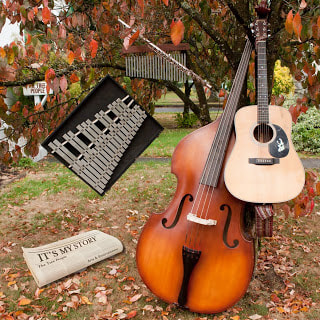 It's My Story album cover with photo by Chris Leck and graphics by Red Bat Design
It's My Story album cover with photo by Chris Leck and graphics by Red Bat Design
The Tree People's new album, "It's My Story" now released!
We are very, very happy to announce the August, 2010 release of our new album, It's My Story, by Guerssen Records of Spain!
The Tree People's new album, "It's My Story" now released!
2010-08-28
We are very, very happy to announce the August, 2010 release of our new album, It's My Story, by Guerssen Records of Spain!
THE TREE PEOPLE
Title: It's My Story
Format. LP, CD
Label. GUERSSEN
Description. Fathers of freak folk / folk psych pioneers The Tree People have incredibly made it again.
Responsible of two awesome works in the late 70's and early 80's, here they are now with a new album and we can tell you sound exactly as they did 30 years ago. This could be their best work ever. Mellow, tender freak folk with acoustic guitar, double bass, recorder, flute and percussion. Eleven new tracks, plus a new version of '' Space heater'' which was in their 1979 debut.
Includes insert with photos and liners by folk- psych connoisseur Gerald Van Waes.
Here are the liner notes by Gerald Van Waes:
Guerssen Rec. The Tree People : It's My Story (US,2010)****
A few years ago Johan Wellens from Tiliqua Records (at that time living in Tokyo, but he was an Antwerp friend of mine before he left) told me, knowing I loved the acid folk genre, I should check out Tree People. For him their albums were amongst his favourites of the genre and he was going to rerelease their first album. Also the second album was going to be released on the label too but Guerssen took over the job, and now we have this, third album which fitted perfectly with the previous recordings. In fact it might even be the best of the three. And that is a strange thing because it is recorded some 31 years later as the first album without having lost any of its early charm. I did not even realise when I first heard the master that I was listening to a new recording at all!
One of the elements which I liked very much from the beginning are the open, natural improvisations, leading to the more epic moments of songs, which reminded me like in the first album also of Ptarmigan, which I took as an example because such calm, breathy, natural landscapes of atmospheres working like breathing seashores around islands of songs are rarely dug out as inspirational sources in musical albums. These pieces are built from picking, double bass, glockenspiel and marvellous flute improvisations. The songs have touches of humour before they start like this child imitating an old women or the dog barking its share into the song, but also the songs themselves take life from the lightest side of seriousness. One of Stephen Cohen’s stronger later songs from his Stephen and the Talk Talk band reappears here as a perfect introduction as if saying musicians want to share the music. They have to share them like stories. Whatever people do with them does not matter. These stories take their own life. Stephen Cohen after Tree People (before the group was re-established again just recently) had gained experience in the narrative and epic field, after having worked with children and made also an album with songs for them (perhaps a part of that period relived in some songs like in “Living with the animals”). And this experience helped in picking out the right tracks to focus upon in this album. Also a new version of "Space Heater" from the first Tree People album reappears, but for the rest they are new songs. But more amazing are the improvisations, how after all these years Stephen succeeded to make this style advance so much after all these years. Perhaps not only this is the best Tree People album, I’m sure this will be a future classic too.
And here, just in, in French and English, from the Monsieur Delire website:
THE TREE PEOPLE / It’s My Story (Guerssen - merci à/thanks to Forced Exposure)
J’ai pleuré de joie en écoutant It’s My Story. Sans blague. La simple existence de ce disque m’émeut. J’ai adoré le deuxième album de The Tree People, une cassette du début des années 80 rééditée par Guerssen l’an dernier. Et voilà que, suite au succès d’estime de la réédition des deux seuls albums du groupe, le trio de l’Oregon s’est reformé. Et ce tout nouveau disque efface nonchalamment 30 ans d’inactivité (du moins sur disque). Stephen Cohen a toujours cette voix innocente d’enfant émerveillé par les banalités de la vie. Les arrangements (souvent guitare acoustique/flûte/contrebasse) sont encore aussi légers, tendres et d’un mélodisme intemporel. C’est beau, c’est rêvé, c’est impossible, et pourtant il est là, ce disque, je l’écoute, il existe, contre toute attente. Encore! Je t’en prie, Stephen, raconte-nous quelques histoires de plus! [Ci-dessous: Un extrait de “More Than Yoko”.]
Damn, I actually cried while listening to It’s My Story. No kidding. The very existence of this record moves me to tears. I love The Tree People’s second album, a cassette form the early ‘80s, reissued last year by Guerssen. And now, due to the critical praise for the reissue of the band’s two albums, the Oregon trio has reconvened. AND this new record effortlessly bridges the 30-year gap. Stephen Cohen still has this wonderfully innocent voice of child in wonderment of life’s simplest things. And the arrangements (usually, acoustic guitar/flute/doublebass) are still as light, tender, and timelessly melodic as ever. It’s beautiful, it’s a dream come true, it’s impossible, and yet it’s here, in my hands, I’m listening to it, it exists against all odds and it’s JUST AS GOOD as the music they were doing three decades ago. More! I want more! Please, Stephen, tell us more of your stories!
Casey Jarman's post about More than Yoko on the Willamette Week website:
The Tree People, “More than Yoko,” It’s My Story (Guerssen)
November 19th, 2010 [3:46PM] Posted by: Casey Jarman
It’s hard to set a poem to a song and not have it just sound like a poem and a song, competing for attention. The Tree People manage it on “More than Yoko.” I’m a big fan of Stephen Cohen’s delivery, and he’s all alone on this particular tune, so he gets to set the pace and the tone with just his guitar and his vocals. It’s a little moment, one imagines the exchange taking place under covers in a warm room with rain falling outside. Or maybe in the car on the way to the airport (because no one says goodbye AT the airport anymore. In that regard, the terrorists have won).
Keeping my thoughts short and sweet here (like the song), but you really should check out the Tree People.
2010-08-28
We are very, very happy to announce the August, 2010 release of our new album, It's My Story, by Guerssen Records of Spain!
THE TREE PEOPLE
Title: It's My Story
Format. LP, CD
Label. GUERSSEN
Description. Fathers of freak folk / folk psych pioneers The Tree People have incredibly made it again.
Responsible of two awesome works in the late 70's and early 80's, here they are now with a new album and we can tell you sound exactly as they did 30 years ago. This could be their best work ever. Mellow, tender freak folk with acoustic guitar, double bass, recorder, flute and percussion. Eleven new tracks, plus a new version of '' Space heater'' which was in their 1979 debut.
Includes insert with photos and liners by folk- psych connoisseur Gerald Van Waes.
Here are the liner notes by Gerald Van Waes:
Guerssen Rec. The Tree People : It's My Story (US,2010)****
A few years ago Johan Wellens from Tiliqua Records (at that time living in Tokyo, but he was an Antwerp friend of mine before he left) told me, knowing I loved the acid folk genre, I should check out Tree People. For him their albums were amongst his favourites of the genre and he was going to rerelease their first album. Also the second album was going to be released on the label too but Guerssen took over the job, and now we have this, third album which fitted perfectly with the previous recordings. In fact it might even be the best of the three. And that is a strange thing because it is recorded some 31 years later as the first album without having lost any of its early charm. I did not even realise when I first heard the master that I was listening to a new recording at all!
One of the elements which I liked very much from the beginning are the open, natural improvisations, leading to the more epic moments of songs, which reminded me like in the first album also of Ptarmigan, which I took as an example because such calm, breathy, natural landscapes of atmospheres working like breathing seashores around islands of songs are rarely dug out as inspirational sources in musical albums. These pieces are built from picking, double bass, glockenspiel and marvellous flute improvisations. The songs have touches of humour before they start like this child imitating an old women or the dog barking its share into the song, but also the songs themselves take life from the lightest side of seriousness. One of Stephen Cohen’s stronger later songs from his Stephen and the Talk Talk band reappears here as a perfect introduction as if saying musicians want to share the music. They have to share them like stories. Whatever people do with them does not matter. These stories take their own life. Stephen Cohen after Tree People (before the group was re-established again just recently) had gained experience in the narrative and epic field, after having worked with children and made also an album with songs for them (perhaps a part of that period relived in some songs like in “Living with the animals”). And this experience helped in picking out the right tracks to focus upon in this album. Also a new version of "Space Heater" from the first Tree People album reappears, but for the rest they are new songs. But more amazing are the improvisations, how after all these years Stephen succeeded to make this style advance so much after all these years. Perhaps not only this is the best Tree People album, I’m sure this will be a future classic too.
And here, just in, in French and English, from the Monsieur Delire website:
THE TREE PEOPLE / It’s My Story (Guerssen - merci à/thanks to Forced Exposure)
J’ai pleuré de joie en écoutant It’s My Story. Sans blague. La simple existence de ce disque m’émeut. J’ai adoré le deuxième album de The Tree People, une cassette du début des années 80 rééditée par Guerssen l’an dernier. Et voilà que, suite au succès d’estime de la réédition des deux seuls albums du groupe, le trio de l’Oregon s’est reformé. Et ce tout nouveau disque efface nonchalamment 30 ans d’inactivité (du moins sur disque). Stephen Cohen a toujours cette voix innocente d’enfant émerveillé par les banalités de la vie. Les arrangements (souvent guitare acoustique/flûte/contrebasse) sont encore aussi légers, tendres et d’un mélodisme intemporel. C’est beau, c’est rêvé, c’est impossible, et pourtant il est là, ce disque, je l’écoute, il existe, contre toute attente. Encore! Je t’en prie, Stephen, raconte-nous quelques histoires de plus! [Ci-dessous: Un extrait de “More Than Yoko”.]
Damn, I actually cried while listening to It’s My Story. No kidding. The very existence of this record moves me to tears. I love The Tree People’s second album, a cassette form the early ‘80s, reissued last year by Guerssen. And now, due to the critical praise for the reissue of the band’s two albums, the Oregon trio has reconvened. AND this new record effortlessly bridges the 30-year gap. Stephen Cohen still has this wonderfully innocent voice of child in wonderment of life’s simplest things. And the arrangements (usually, acoustic guitar/flute/doublebass) are still as light, tender, and timelessly melodic as ever. It’s beautiful, it’s a dream come true, it’s impossible, and yet it’s here, in my hands, I’m listening to it, it exists against all odds and it’s JUST AS GOOD as the music they were doing three decades ago. More! I want more! Please, Stephen, tell us more of your stories!
Casey Jarman's post about More than Yoko on the Willamette Week website:
The Tree People, “More than Yoko,” It’s My Story (Guerssen)
November 19th, 2010 [3:46PM] Posted by: Casey Jarman
It’s hard to set a poem to a song and not have it just sound like a poem and a song, competing for attention. The Tree People manage it on “More than Yoko.” I’m a big fan of Stephen Cohen’s delivery, and he’s all alone on this particular tune, so he gets to set the pace and the tone with just his guitar and his vocals. It’s a little moment, one imagines the exchange taking place under covers in a warm room with rain falling outside. Or maybe in the car on the way to the airport (because no one says goodbye AT the airport anymore. In that regard, the terrorists have won).
Keeping my thoughts short and sweet here (like the song), but you really should check out the Tree People.
Casey Jarman's review of It's My Story in Willamette Week:
The Tree People It’s My Story (Guerssen)
[MINIMAL FOLK] Following up a great album is hard to do. Following it up after a 26-year recording hiatus is just dumb. And yet, the Tree People have picked up right where they left off. The Portland-via-Eugene psychedelic folk group’s reunion disc, It’s My Story, is an album that showcases the same off-kilter beauty of its predecessor, Human Voices, a disc released in 1984 and widely considered a lost folk gem until its reissue last year.
The Tree People are a hard outfit to explain, because on paper the music sounds like your standard country fair fare: They’re called the Tree People, for chrissakes, and the instrumentation includes stand-up bass, panpipes, penny whistle and “throat singing.” But the band—multi-instrumentalists Stephen Cohen, Jeff Stier and Rich Hinrichsen—share a vision that’s more Sendak than Tolkien, and more Van Morrison than Donovan.
This is especially true of the vocal tracks: The title track proves that the group’s singer-songwriter, Cohen (a guy who can pull off a beret), remains an expert of vocal pacing and delivery. “The Change in Kate” has the jazzy feel of Lou Reed’s “Walk on the Wild Side” (“You can hear soulful singing when she talks/ You can see joyous dancing where she walks,” he sings) without the heroin-chic. Cohen’s strength is in a childlike wonder and charm that hasn’t diluted over the years.
In fact, if the disc has a weakness, it’s that we could use a little more of Cohen’s striking vocals. “X Times Y”—a Danny Elfman-esque psych-folk instrumental with strings that sound like pigeons overhead or the upstairs neighbors’ squeaky box spring—fares well without a voice, as does the touching “Melody for 3,” but “Sunday” and “Hearing Test” feel like freak-funk jams without the funk, and will probably leave pop-oriented listeners hitting skip. Still, Cohen uses his limited time on the mic to its fullest. “More Than Yoko” is a 30-word beat poem set to song, and it comprises two of the album’s strongest minutes—another reason the Tree People deserve your attention. CASEY JARMAN.
Barbara Mitchell's review in the Oregonian:
The Return of Tree People
Published: Friday, November 12, 2010, 5:09 AM
Barbara Mitchell, Special to The Oregonian
There's a platitude that holds that everything happens at the right time, in the right place and for the right reason. It's taken 26 years for the Tree People to release a third album, but "It's My Story" feels like it's been delivered exactly on time.
Devendra Banhart and his cohorts may have revitalized the genre, but freak/acid-folk has deep roots -- roots that wrap around the Tree People, who released their first album way back in 1979.
While a lot has changed in the world at large, time has stood still in the best possible way in this kingdom. Finger-picked guitar, simple lyrics and whimsical flute/recorder lines create an alternate world of innocence and improvisation saturated by love and nature.
Mainstays Stephen Cohen and Jeff Stier reunited in 2007, but there's a lot that could be attributed to 1967 here. Like a time machine devoted to transporting the listener back to a kinder, gentler, more wide-eyed age, this is a ticket to the Autumn of Love -- there's both beauty and sadness in the instrumental tracks, and Cohen's almost childlike vocals carry a weight (and a hope) that scores an emotional, complex bulls-eye.
Cohen intones on "Legends of the Tree People." If you're allergic to patchouli, there's nothing to see here. If part of you secretly yearns for a positive pied piper to help you transcend the here and now, you should reacquaint yourself with the Tree People.
-- Barbara Mitchell
The Tree People It’s My Story (Guerssen)
[MINIMAL FOLK] Following up a great album is hard to do. Following it up after a 26-year recording hiatus is just dumb. And yet, the Tree People have picked up right where they left off. The Portland-via-Eugene psychedelic folk group’s reunion disc, It’s My Story, is an album that showcases the same off-kilter beauty of its predecessor, Human Voices, a disc released in 1984 and widely considered a lost folk gem until its reissue last year.
The Tree People are a hard outfit to explain, because on paper the music sounds like your standard country fair fare: They’re called the Tree People, for chrissakes, and the instrumentation includes stand-up bass, panpipes, penny whistle and “throat singing.” But the band—multi-instrumentalists Stephen Cohen, Jeff Stier and Rich Hinrichsen—share a vision that’s more Sendak than Tolkien, and more Van Morrison than Donovan.
This is especially true of the vocal tracks: The title track proves that the group’s singer-songwriter, Cohen (a guy who can pull off a beret), remains an expert of vocal pacing and delivery. “The Change in Kate” has the jazzy feel of Lou Reed’s “Walk on the Wild Side” (“You can hear soulful singing when she talks/ You can see joyous dancing where she walks,” he sings) without the heroin-chic. Cohen’s strength is in a childlike wonder and charm that hasn’t diluted over the years.
In fact, if the disc has a weakness, it’s that we could use a little more of Cohen’s striking vocals. “X Times Y”—a Danny Elfman-esque psych-folk instrumental with strings that sound like pigeons overhead or the upstairs neighbors’ squeaky box spring—fares well without a voice, as does the touching “Melody for 3,” but “Sunday” and “Hearing Test” feel like freak-funk jams without the funk, and will probably leave pop-oriented listeners hitting skip. Still, Cohen uses his limited time on the mic to its fullest. “More Than Yoko” is a 30-word beat poem set to song, and it comprises two of the album’s strongest minutes—another reason the Tree People deserve your attention. CASEY JARMAN.
Barbara Mitchell's review in the Oregonian:
The Return of Tree People
Published: Friday, November 12, 2010, 5:09 AM
Barbara Mitchell, Special to The Oregonian
There's a platitude that holds that everything happens at the right time, in the right place and for the right reason. It's taken 26 years for the Tree People to release a third album, but "It's My Story" feels like it's been delivered exactly on time.
Devendra Banhart and his cohorts may have revitalized the genre, but freak/acid-folk has deep roots -- roots that wrap around the Tree People, who released their first album way back in 1979.
While a lot has changed in the world at large, time has stood still in the best possible way in this kingdom. Finger-picked guitar, simple lyrics and whimsical flute/recorder lines create an alternate world of innocence and improvisation saturated by love and nature.
Mainstays Stephen Cohen and Jeff Stier reunited in 2007, but there's a lot that could be attributed to 1967 here. Like a time machine devoted to transporting the listener back to a kinder, gentler, more wide-eyed age, this is a ticket to the Autumn of Love -- there's both beauty and sadness in the instrumental tracks, and Cohen's almost childlike vocals carry a weight (and a hope) that scores an emotional, complex bulls-eye.
Cohen intones on "Legends of the Tree People." If you're allergic to patchouli, there's nothing to see here. If part of you secretly yearns for a positive pied piper to help you transcend the here and now, you should reacquaint yourself with the Tree People.
-- Barbara Mitchell
above: a video featuring the song Legends of the Tree People, from the It's My Story album
Stephen Cohen- voice and acoustic guitar, Jeff Stier- recorder, percussion, and voice, Rich Hinrichsen- double bass
throat singing by Rich Hinrichsen and Jeff Stier
Stephen Cohen- voice and acoustic guitar, Jeff Stier- recorder, percussion, and voice, Rich Hinrichsen- double bass
throat singing by Rich Hinrichsen and Jeff Stier
The Tree People's last United States performance, Spain in March up next, the music will live!
We gave our last United States performance as the Tree People at the Old Church in Portland on November 21, 2010. Our next, and last performance as the Tree People will be at the Musiques Disperses Festival in Spain on March 12th, 2011. Jeff Stier, who was with me, one of the two original founding members of the Tree People, is retiring from the performing life. Jeff brilliantly played recorders, flute and percussion on our 3 Tree People albums. He was part of so many performances and concerts during the 2 performing lives of the Tree People, from 1978 till 1985 and from late 2007 till early 2011. It has been an honor to collaborate with this intelligent and talented man in creating the Tree People music. I am so glad that the worldwide discovery or the Tree People led to our second performing and recording life. And I am so happy we could create our third, and we think best album, "It's My Story", an album Jeff considers a legacy, a real part of his life he can pass on to his young daughter.
But the music will live on! I will continue to create, perform, and record music as long as I live. Me and Tree People double bass player Rich Hinrichsen are forming a new ensemble with a new name, new members, and new music, with plenty of Tree People songs thrown in for good measure. And we are just getting warmed up on promoting and sharing this last Tree People album.
But back to the concert at the Old Church: It was a cold and rainy evening with a threat of snow in the air. But inside the warmth of the Old Church, a old style concert hall with perfect concert hall acoustics, we played a totally acoustic set of music from all 3 Tree People albums to a perfect listening audience. Our program included No More School, Sliding, Pot of Gold, the Pineapple Song and Morning Song from the 1st album; Thomas, Rain, Rain, and 3 Dances from the 2nd album, and It's My Story, Living with the Animals, x times y, Sunday, More than Yoko, Melody for 3, Legends of the Tree People, and Space Heater from the new album. It was a big thrill to have vocalist Nicole Campbell (a great singer-songwriter, musician in her own right) join us on It's My Story and Living with the Animals- she sang her parts beautifully! And as always, I felt I had the best seat in the house, where I could hear and see Jeff on my left and Rich on my right!
Stephen Cohen, December, 2010
In attendance was Tony Coulter, a WFMU (a wonderful radio station that can be heard in the New York City area) ,music host and blogger who has recently moved to Portland.
Here is his blog post:
Next up is a wonderful Oregon group (based initially in Eugene, and then in Portland), whose two founding members -- Stephen Cohen (guitar, vocals) and Jeff Stier (flute, recorder, percussion) -- have developed their own subtle and refined, yet emotionally gripping brand of psych folk. The band's first LP, self-titled and from 1979, has slowly built a well-deserved reputation, and on its reissue it got a fair amount of airplay on WFMU. The group's second and third albums, though, have garnered comparatively little attention -- and no hearing on FMU. This seems to me to likely be for two reasons: the second album -- Human Voices, from 1984 -- originally appeared only as a limited-edition cassette, and thus made no impact whatever outside of Eugene; while the third album, It's My Story, came out just this year, after a 26-year gap. Frankly, many fans of the early material would probably assume that the group couldn't possibly be as good as it used to be -- but it is ... and the proof is below.
Sadly, the Tree People broke up almost as soon as their new album was released -- Jeff Stier has decided to retire from performance. Stephen Cohen, always the principal songwriter, and bassist Rich Hinrichsen do plan to continue with new collaborators under a new name. For my part, I'm just glad I was able to catch the group's final U.S. concert -- which, oddly, doubled as a CD-release event. Wish you could have been there.
We gave our last United States performance as the Tree People at the Old Church in Portland on November 21, 2010. Our next, and last performance as the Tree People will be at the Musiques Disperses Festival in Spain on March 12th, 2011. Jeff Stier, who was with me, one of the two original founding members of the Tree People, is retiring from the performing life. Jeff brilliantly played recorders, flute and percussion on our 3 Tree People albums. He was part of so many performances and concerts during the 2 performing lives of the Tree People, from 1978 till 1985 and from late 2007 till early 2011. It has been an honor to collaborate with this intelligent and talented man in creating the Tree People music. I am so glad that the worldwide discovery or the Tree People led to our second performing and recording life. And I am so happy we could create our third, and we think best album, "It's My Story", an album Jeff considers a legacy, a real part of his life he can pass on to his young daughter.
But the music will live on! I will continue to create, perform, and record music as long as I live. Me and Tree People double bass player Rich Hinrichsen are forming a new ensemble with a new name, new members, and new music, with plenty of Tree People songs thrown in for good measure. And we are just getting warmed up on promoting and sharing this last Tree People album.
But back to the concert at the Old Church: It was a cold and rainy evening with a threat of snow in the air. But inside the warmth of the Old Church, a old style concert hall with perfect concert hall acoustics, we played a totally acoustic set of music from all 3 Tree People albums to a perfect listening audience. Our program included No More School, Sliding, Pot of Gold, the Pineapple Song and Morning Song from the 1st album; Thomas, Rain, Rain, and 3 Dances from the 2nd album, and It's My Story, Living with the Animals, x times y, Sunday, More than Yoko, Melody for 3, Legends of the Tree People, and Space Heater from the new album. It was a big thrill to have vocalist Nicole Campbell (a great singer-songwriter, musician in her own right) join us on It's My Story and Living with the Animals- she sang her parts beautifully! And as always, I felt I had the best seat in the house, where I could hear and see Jeff on my left and Rich on my right!
Stephen Cohen, December, 2010
In attendance was Tony Coulter, a WFMU (a wonderful radio station that can be heard in the New York City area) ,music host and blogger who has recently moved to Portland.
Here is his blog post:
Next up is a wonderful Oregon group (based initially in Eugene, and then in Portland), whose two founding members -- Stephen Cohen (guitar, vocals) and Jeff Stier (flute, recorder, percussion) -- have developed their own subtle and refined, yet emotionally gripping brand of psych folk. The band's first LP, self-titled and from 1979, has slowly built a well-deserved reputation, and on its reissue it got a fair amount of airplay on WFMU. The group's second and third albums, though, have garnered comparatively little attention -- and no hearing on FMU. This seems to me to likely be for two reasons: the second album -- Human Voices, from 1984 -- originally appeared only as a limited-edition cassette, and thus made no impact whatever outside of Eugene; while the third album, It's My Story, came out just this year, after a 26-year gap. Frankly, many fans of the early material would probably assume that the group couldn't possibly be as good as it used to be -- but it is ... and the proof is below.
Sadly, the Tree People broke up almost as soon as their new album was released -- Jeff Stier has decided to retire from performance. Stephen Cohen, always the principal songwriter, and bassist Rich Hinrichsen do plan to continue with new collaborators under a new name. For my part, I'm just glad I was able to catch the group's final U.S. concert -- which, oddly, doubled as a CD-release event. Wish you could have been there.
Wonderful review of "It's My Story" In HI-Fi World magazine (U.K.)
There is a wonderful review of our "It's My Story" album in Hi-Fi World magazine (United Kingdom). It was one of their Audiophile Vinyl picks, along with an Elvis reissue vinyl album- so although we never shared a stage with Elvis, we can now say we shared a page with Elvis. Here is the review of our album:
THE TREE PEOPLE
It's My Story
Guerssen
I have to hold my hands up and admit that I'd never heard of this outfit before who hail from Oregon, U.S.A. After some investigations I found that they released their first album (self-titled) in 1979 and then followed that up with another ("Human Voices") five years later. I knew that teachers had long holidays, but this is ridiculous because this album is the band's third release- was it worth the wait? The current incarnation consists of Stephen Cohen (acoustic guitar), Jeff Stier (flute) and Rich Hinrichsen (double bass) with the added occasional voices of Maeve Stier and Nicole Campbell. Their music is basically folk but it's not as simple as that. There's to many tweaks in their work for them to be labelled with such a simple word. Which is why you will see the words "freak folk", "psych folk", and "alt-folk" tagged rather uncertainly to them.
Whatever you call them, "It's My Story" is a wholly engaging album that, right from the start, pulls you into their head space. Beautifully melodic, the album is both busy and calming in its presentation. The title track, the first on Side One, grabs you immediately with a delicious selection of hooks while the next track on the side, "Sunday", takes you on an organic ambient journey of flute, double bass and acoustic guitar. And so it goes on, mixing instrumentals and vocal tracks throughout, in a wonderfully dreamy manner. For those wondering what the band was up to during its earlier days, you can get a flavour by checking out the track "Space Heater", which sits on Side Two and is a remake of the track which appeared on their debut release. A series of complicated ideas simply executed to form a magical album.
2011:
The Tree People in Spain soon!
On March 12th, the Tree People will be in Lleida, Spain performing at the Cafe del Teatre as part of the Musiques Disperses Festival with Stephen on acoustic guitar and voice, Rich on double bass and voice, along with 2 Spanish musicians, Jordi on cello, and Hector on mandolin and accordion. Photographer Ben Sussman will join us to document the event. It should be quite an experience!
On March 12th, the Tree People will be in Lleida, Spain performing at the Cafe del Teatre as part of the Musiques Disperses Festival with Stephen on acoustic guitar and voice, Rich on double bass and voice, along with 2 Spanish musicians, Jordi on cello, and Hector on mandolin and accordion. Photographer Ben Sussman will join us to document the event. It should be quite an experience!
Musiques Disperses Festival in Spain- the last performance under the Tree People name
all photos in Spain by photographer Ben Sussman (my talented brother-in-law). Thanks Ben for your wonderful photographs!
The Musiques Disperses Festival is not a one day affair, but rather a series of concerts that takes place on weekends over a period of 3 or 4 weeks. The night before we performed, we were able to see and hear Bigott (which loosely translated, means "mustache"), a band from southern Spain. They are a lot of fun, featuring guitars, keyboards, two drummers and a lead singer who breaks into hippie style dances during performances. I had a chance to meet them at the hotel brunch Saturday morning and they were a very nice group of people. We exchanged albums. One of the highlights of touring for me is seeing and meeting other musicians from all over the world.
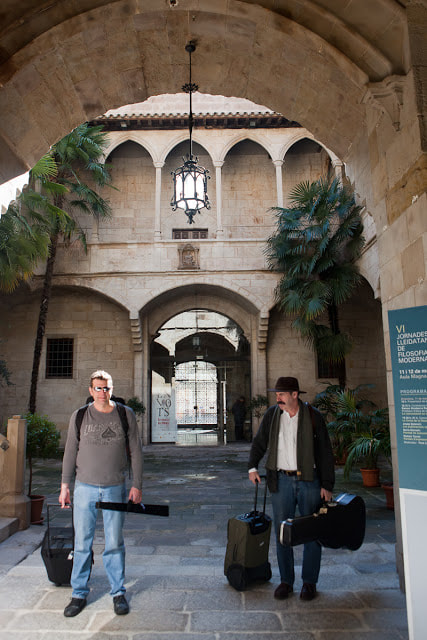 Stephen and Rich in alley courtyard in LLeida on the way to the train back to Barcelona. Rich has his double bass bow in a case. The festival kindly provided a vintage double bass for Rich to play.
Stephen and Rich in alley courtyard in LLeida on the way to the train back to Barcelona. Rich has his double bass bow in a case. The festival kindly provided a vintage double bass for Rich to play.
The best thing about it all was meeting people in a far away land, playing with two great musicians from Spain, and sharing the language of music with a wonderful Spanish audience.We did two curtain calls and signed many autographs after the concert. A wonderful experience!
Here are the songs, in order, that we performed at the Musique Disperses Festival:
It’s My Story, Sliding, Pot of Gold, Let’s All Root for the Home Team, Thomas, Melody for 4, Living with the Animals, Hearing Test, No More School, More Than Yoko, The Change in Kate, Grandfather, Walking Willow Tree, Legends of the Tree People
curtain call: Rain, Rain, Rain, Space Heater
2nd curtain call: Goodnight, Goodnight
Pop Matters review of the Tree People "It's My Story" album
The Tree People "It's My Story" By Ron Hart 5 April 2011
Known as Oregon’s forefathers of freak folk, the Tree People were recording songs of heady, rustic psychedelia in an era when skinny ties and synthesizers were the prominent means of creative expression. The trio already has a pair of mellow masterpieces under its belt in its eponymous 1979 debut and the 1983 follow-up, Human Voices. Now, after a three-decade break from action, the tree men return with It’s My Story, 12 new songs for acoustic guitar, bass, recorder, flute and percussion that fit perfectly into the mood of the modern-day freakscene made famous by the likes of Vetiver, Wooden Wand and Six Organs of Admittance. The album also pays homage to the English Canterbury movement that gave us Fairport Convention and Pentangle. Highlights include the cheeky “More Than Yoko” and a new version of their classic song “Space Heater”.
The Tree People "It's My Story" By Ron Hart 5 April 2011
Known as Oregon’s forefathers of freak folk, the Tree People were recording songs of heady, rustic psychedelia in an era when skinny ties and synthesizers were the prominent means of creative expression. The trio already has a pair of mellow masterpieces under its belt in its eponymous 1979 debut and the 1983 follow-up, Human Voices. Now, after a three-decade break from action, the tree men return with It’s My Story, 12 new songs for acoustic guitar, bass, recorder, flute and percussion that fit perfectly into the mood of the modern-day freakscene made famous by the likes of Vetiver, Wooden Wand and Six Organs of Admittance. The album also pays homage to the English Canterbury movement that gave us Fairport Convention and Pentangle. Highlights include the cheeky “More Than Yoko” and a new version of their classic song “Space Heater”.
The Tree People interview with Stephen Cohen in "It's Psychedelic Baby" Magazine
Interview:
1. Thank you for taking your time to do this interview about The Tree People! First I have to ask you about your childhood and teen years. Where did you grow up and what were some of your influences?
I grew up in Pawtucket, Rhode Island in the United States. I taught myself how to play guitar at the age of 14 and soon was composing music and writing songs. Just exploring the six strings and the many frets of the guitar was, and still is, where it all starts for me. As a teenager I went to the Newport Folk Festival and saw all kinds of wonderful performances there. I listened to all kinds of recorded music, everything from folk, to rock, to jazz, to classical. I attended Brandeis University in Waltham, Massachusetts for 3 years and saw all kinds of wonderful local performers and bands fill the small Brandeis University Coffeehouse with some great music. But I have to say my biggest influence was, and still is, all the emotions and surprises found in daily life.2. Were you in any bands before forming The Tree People? Any releases from then?
I left Brandeis University after 3 years to travel, guitar in hand, across the United States, hitchhiking, living in several “hippy” communes, and having all kinds of adventures, until settling in and around Santa Fe, New Mexico, where I performed solo regularly at several restaurants. No album releases from that time. The Tree People, recorded in Eugene, Oregon soon after I moved there, was my first full length album release.
3. Why the name The Tree People?
Once sitting under a tree in New Mexico, I got the inspiration to write a short, illustrated children’s book called the Tree People, and the name for the group came from that book. I never published the book, and I have no copies of the book, just a few of the illustrations.
4. So how did you guys came together to form the band?
I performed regularly at a place in Eugene, Oregon called the Homefried Truckstop, a coffeehouse and restaurant close to the University of Oregon that had live music 7 days a week and was quite a local hangout for musicians and music lovers at that time. I saw a wonderful musician playing recorder and percussion there a few times with several different folk bands and felt what he was doing would work well with my music. When I saw him at one of my performances, I asked him if was interested in playing music with me. His name was Jeff Stier. He had a friend, a classical flautist named Rachel Laderman, who starting rehearsing and performing with us, and the original Tree People ensemble was in place.
5. In 1979 you released your debut. I would like if you could share a whole story about the LP. What are some of the strongest memories from recording and producing this LP?
My debut album, The Tree People, was recorded in a studio in the woods outside of Eugene, Oregon called Rockin’ A Ranch. It was all done in a single weekend with most everything recorded live and in one or two takes, with me on acoustic guitar and voice, Jeff Stier on recorders and percussion, Rachel Laderman on flute on a few pieces, and James Thornbury (a local blues musician at the time who later toured internationally with Canned Heat and now lives in Austrulia) sitting in on electric bass on a few pieces and on slide guitar and back-up vocals on Bring in the Water. My strongest memories from that weekend were the bond I felt with the other musicians and the studio owner/engineer while making the music, and the feeling that being in a studio was home for me. And when the engineer’s wife brought us some fresh baked cookies during a break I knew for sure we were in the right place.
Where did you record it?
Rocking’ A Ranch in Greenleaf, Oregon.
What can you say about the cover artwork?
The cover artwork was the cover of the Tree People storybook that I mentioned above.
I drew it after napping under that tree in New Mexico and imagining what the Tree People might look like.
This was a private release, right? What more can you tell me and how many copies were made?
1,000 vinyl copies were made. We sold most of them in Eugene, at local stores and at live performances.
6. Did you play any shows?
We played just about everywhere you could possibly play in Eugene: at coffeehouses, University events, at festivals, and in concerts at art galleries and small concert halls. .
7. A few years later you released another album called Human Voices and a year or so ago you released a new album called It's My Story, which is really amazing! In the meantime you had a solo carrier and you released four albums from 1995 to 2006. Would you like to tell me about this period of your carrier?
Soon after Human Voices was released (another private release, this time released only as a cassette with 300 copies, all sold in Eugene), Jeff moved to Washington, D.C. to work in politics and that phase of the Tree People story came to an end.
I continued composing music, writing songs, performing and recording and also started making my own original sculptural percussion instruments, which I used in my performances and recordings along with my guitar and voice. I moved to Portland, Oregon in 1996 and did many performances there and also performed in concert and at festivals across the United States. I also did workshops and residencies at schools and museums and recorded several albums, including a children’s album called Here Come the Band (suitable for adults as well!).
8. What are some of your future plans?
I am now performing and recording with Rich Hinrichsen, the double bassist who played on the 3rd and last Tree People album, It’s My Story, and we are now called THE WALKING WILLOWS (you might say an offshoot of the Tree People). Future plans include a releasing a new album by the WALKING WILLOWS, and producing and creating some creative videos of some of our new songs to put up on the web.
I am also working on a project called the Cistern Symphony, where I am putting music, photos and video created in a cavernous Cistern with incredible echoes together into a film. But most of all, I just plan to create, perform and record music for as long as I can.
9. How do you like Guerssen re-release of your albums?
Antoni and his staff at Guerssen did a fantastic job with our albums and it was a pleasure and honor to work with Guerssen. I have nothing but good things to say about Guerssen! A highlight was going to Spain to perform at the Musique Disperses Festival (a festival that Antoni and Guerssen Records produce) this year!
10. Thanks for your time, would you like to add something else, perhaps?
Thank you for your time. Music is a great form of communication. I am always happy when my music can reach some far corner of the world from my little corner of the world.
Interview made by Klemen Breznikar © 2011
Interview:
1. Thank you for taking your time to do this interview about The Tree People! First I have to ask you about your childhood and teen years. Where did you grow up and what were some of your influences?
I grew up in Pawtucket, Rhode Island in the United States. I taught myself how to play guitar at the age of 14 and soon was composing music and writing songs. Just exploring the six strings and the many frets of the guitar was, and still is, where it all starts for me. As a teenager I went to the Newport Folk Festival and saw all kinds of wonderful performances there. I listened to all kinds of recorded music, everything from folk, to rock, to jazz, to classical. I attended Brandeis University in Waltham, Massachusetts for 3 years and saw all kinds of wonderful local performers and bands fill the small Brandeis University Coffeehouse with some great music. But I have to say my biggest influence was, and still is, all the emotions and surprises found in daily life.2. Were you in any bands before forming The Tree People? Any releases from then?
I left Brandeis University after 3 years to travel, guitar in hand, across the United States, hitchhiking, living in several “hippy” communes, and having all kinds of adventures, until settling in and around Santa Fe, New Mexico, where I performed solo regularly at several restaurants. No album releases from that time. The Tree People, recorded in Eugene, Oregon soon after I moved there, was my first full length album release.
3. Why the name The Tree People?
Once sitting under a tree in New Mexico, I got the inspiration to write a short, illustrated children’s book called the Tree People, and the name for the group came from that book. I never published the book, and I have no copies of the book, just a few of the illustrations.
4. So how did you guys came together to form the band?
I performed regularly at a place in Eugene, Oregon called the Homefried Truckstop, a coffeehouse and restaurant close to the University of Oregon that had live music 7 days a week and was quite a local hangout for musicians and music lovers at that time. I saw a wonderful musician playing recorder and percussion there a few times with several different folk bands and felt what he was doing would work well with my music. When I saw him at one of my performances, I asked him if was interested in playing music with me. His name was Jeff Stier. He had a friend, a classical flautist named Rachel Laderman, who starting rehearsing and performing with us, and the original Tree People ensemble was in place.
5. In 1979 you released your debut. I would like if you could share a whole story about the LP. What are some of the strongest memories from recording and producing this LP?
My debut album, The Tree People, was recorded in a studio in the woods outside of Eugene, Oregon called Rockin’ A Ranch. It was all done in a single weekend with most everything recorded live and in one or two takes, with me on acoustic guitar and voice, Jeff Stier on recorders and percussion, Rachel Laderman on flute on a few pieces, and James Thornbury (a local blues musician at the time who later toured internationally with Canned Heat and now lives in Austrulia) sitting in on electric bass on a few pieces and on slide guitar and back-up vocals on Bring in the Water. My strongest memories from that weekend were the bond I felt with the other musicians and the studio owner/engineer while making the music, and the feeling that being in a studio was home for me. And when the engineer’s wife brought us some fresh baked cookies during a break I knew for sure we were in the right place.
Where did you record it?
Rocking’ A Ranch in Greenleaf, Oregon.
What can you say about the cover artwork?
The cover artwork was the cover of the Tree People storybook that I mentioned above.
I drew it after napping under that tree in New Mexico and imagining what the Tree People might look like.
This was a private release, right? What more can you tell me and how many copies were made?
1,000 vinyl copies were made. We sold most of them in Eugene, at local stores and at live performances.
6. Did you play any shows?
We played just about everywhere you could possibly play in Eugene: at coffeehouses, University events, at festivals, and in concerts at art galleries and small concert halls. .
7. A few years later you released another album called Human Voices and a year or so ago you released a new album called It's My Story, which is really amazing! In the meantime you had a solo carrier and you released four albums from 1995 to 2006. Would you like to tell me about this period of your carrier?
Soon after Human Voices was released (another private release, this time released only as a cassette with 300 copies, all sold in Eugene), Jeff moved to Washington, D.C. to work in politics and that phase of the Tree People story came to an end.
I continued composing music, writing songs, performing and recording and also started making my own original sculptural percussion instruments, which I used in my performances and recordings along with my guitar and voice. I moved to Portland, Oregon in 1996 and did many performances there and also performed in concert and at festivals across the United States. I also did workshops and residencies at schools and museums and recorded several albums, including a children’s album called Here Come the Band (suitable for adults as well!).
8. What are some of your future plans?
I am now performing and recording with Rich Hinrichsen, the double bassist who played on the 3rd and last Tree People album, It’s My Story, and we are now called THE WALKING WILLOWS (you might say an offshoot of the Tree People). Future plans include a releasing a new album by the WALKING WILLOWS, and producing and creating some creative videos of some of our new songs to put up on the web.
I am also working on a project called the Cistern Symphony, where I am putting music, photos and video created in a cavernous Cistern with incredible echoes together into a film. But most of all, I just plan to create, perform and record music for as long as I can.
9. How do you like Guerssen re-release of your albums?
Antoni and his staff at Guerssen did a fantastic job with our albums and it was a pleasure and honor to work with Guerssen. I have nothing but good things to say about Guerssen! A highlight was going to Spain to perform at the Musique Disperses Festival (a festival that Antoni and Guerssen Records produce) this year!
10. Thanks for your time, would you like to add something else, perhaps?
Thank you for your time. Music is a great form of communication. I am always happy when my music can reach some far corner of the world from my little corner of the world.
Interview made by Klemen Breznikar © 2011
2012:
The first Tree People album gets a few pages in the book "Folk & Revival" by French authors Bruno Meillier and Philippe Robert.
Special thanks to my friend in France, Jaak, who translated the Tree People pages in the book from French to English for me. Here it is:.
FOLK & REVIVAL
An Anglo-Saxon stroll
The Tree People – The Tree People (Tiliqua 1979)
In the music of The Tree People, a band founded in Eugene (Oregon) in 1977, there are echoes of that obscure era straddling the seventies and eighties (of the 20th century), that dark age in the grand history of folk music. Either as precursors of the renaissance of the acid folk scene that would take place 2 decades later (the lunar melodies present here are a prequel to those that would well up later on in acts such as Vetiver, Espers or Joanna Newsom), or as distant echoes of those good old hippie vibrations of 1967, the nine tracks of this eponymous self-produced first album conjure up an overall timeless impression. With the help of flutist/percussionist Jeff Stier and flutist Rachel Laderman, Stephen Cohen put himself to the task of translating the then present moment into sound. James Thornbury, who would go on to play bass in Canned Heat, joined the three of them deep in the woods, in a recording studio chosen especially to get as far away as possible from the commotion of civilization. The sound, very much akin to the one typical for some Canadian progressive folk combos, is characterized by an introspective Americana-like pace owing to the ethereal sound frequencies (guitars, transversal flute, recorder and xylophone), and makes the listener comfortable like when he were witnessing a ruby red and honey colored sunset. ‘Pot Of Gold’, out of an ever swelling cymbal sound and loose guitar picking supporting a comforting and hearty vocal, creeps in in a heady kind of way. The instrumental tracks ‘Opus’ and ‘Space Heater’, aside from marrying raga and blues born out of a series of glissandi and sitar-like strung chords, partake of a delicacy made of subtle harmonies, with the bongos and triangle tinkling acting as beacons for the powerful moments. In the background two flutes, cautious and restrained, are present in counterpoint. Then, after a melancholic guitar solo in the best of west coast traditions (Takoma scene and Ali Akbar Khan merged into one), the album ends with a return to the slide mode owing to the gripping modernity of ‘Bring In The Water’, in which Stephen Cohen words the need for a return to the soil so dearly chanted by many a neo-rural at the end of this first decade of the 21st Century: “… bring in the water, chop the wood, if [we] only could”. In 2007, following the reissue of their first two albums that were released shortly before the band split up in the mid-eighties, The Tree People reformed, with Stephen Cohen and Jeff Stier indulging in the recording of a third album with a limpid and clear sound the prince’s kiss brings back to life after a twenty-six year long profound sleep.
Recommended listening:
Human Voices (1984), It’s My Story (2010)
More recommended listening:
Stephen Cohen & Rich Hinrichsen, The Walking Willows, Connivence, L’Engoulevent, Les Karrik, Ptarmigan, Van Morrison
Special thanks to my friend in France, Jaak, who translated the Tree People pages in the book from French to English for me. Here it is:.
FOLK & REVIVAL
An Anglo-Saxon stroll
The Tree People – The Tree People (Tiliqua 1979)
In the music of The Tree People, a band founded in Eugene (Oregon) in 1977, there are echoes of that obscure era straddling the seventies and eighties (of the 20th century), that dark age in the grand history of folk music. Either as precursors of the renaissance of the acid folk scene that would take place 2 decades later (the lunar melodies present here are a prequel to those that would well up later on in acts such as Vetiver, Espers or Joanna Newsom), or as distant echoes of those good old hippie vibrations of 1967, the nine tracks of this eponymous self-produced first album conjure up an overall timeless impression. With the help of flutist/percussionist Jeff Stier and flutist Rachel Laderman, Stephen Cohen put himself to the task of translating the then present moment into sound. James Thornbury, who would go on to play bass in Canned Heat, joined the three of them deep in the woods, in a recording studio chosen especially to get as far away as possible from the commotion of civilization. The sound, very much akin to the one typical for some Canadian progressive folk combos, is characterized by an introspective Americana-like pace owing to the ethereal sound frequencies (guitars, transversal flute, recorder and xylophone), and makes the listener comfortable like when he were witnessing a ruby red and honey colored sunset. ‘Pot Of Gold’, out of an ever swelling cymbal sound and loose guitar picking supporting a comforting and hearty vocal, creeps in in a heady kind of way. The instrumental tracks ‘Opus’ and ‘Space Heater’, aside from marrying raga and blues born out of a series of glissandi and sitar-like strung chords, partake of a delicacy made of subtle harmonies, with the bongos and triangle tinkling acting as beacons for the powerful moments. In the background two flutes, cautious and restrained, are present in counterpoint. Then, after a melancholic guitar solo in the best of west coast traditions (Takoma scene and Ali Akbar Khan merged into one), the album ends with a return to the slide mode owing to the gripping modernity of ‘Bring In The Water’, in which Stephen Cohen words the need for a return to the soil so dearly chanted by many a neo-rural at the end of this first decade of the 21st Century: “… bring in the water, chop the wood, if [we] only could”. In 2007, following the reissue of their first two albums that were released shortly before the band split up in the mid-eighties, The Tree People reformed, with Stephen Cohen and Jeff Stier indulging in the recording of a third album with a limpid and clear sound the prince’s kiss brings back to life after a twenty-six year long profound sleep.
Recommended listening:
Human Voices (1984), It’s My Story (2010)
More recommended listening:
Stephen Cohen & Rich Hinrichsen, The Walking Willows, Connivence, L’Engoulevent, Les Karrik, Ptarmigan, Van Morrison
Stephen and Rich's duo, The Walking Willows, a branch of The Tree People, perform and release an album, by hand
http://www.portlandmercury.com/portland/the-walking-willows/Event?oid=7491408 :
Stephen Cohen's old group, the Eugene-based psychedelic folk band the Tree People, didn't garner a ton of attention during their initial stint, but they were posthumously discovered by record collectors worldwide and eventually had their 1979 and 1984 albums reissued. Now Cohen's new band, the Walking Willows, have a record that should similarly delight record collectors and fans of off-the-beaten-path folk. By Hand is a sparse, playful collection of songs performed by Cohen and double bassist Rich Hinrichsen, and they're performed with clarity, precision, and vibrant humor, as on "1 Hit Song" and "Mathematics." There's also some good old-fashioned, rain-sodden Oregon weirdness, and the result is a unique, entrancing folk record that doesn't sound like anything you've heard before. NED LANNAMANN
http://www.portlandmercury.com/portland/the-walking-willows/Event?oid=7491408 :
Stephen Cohen's old group, the Eugene-based psychedelic folk band the Tree People, didn't garner a ton of attention during their initial stint, but they were posthumously discovered by record collectors worldwide and eventually had their 1979 and 1984 albums reissued. Now Cohen's new band, the Walking Willows, have a record that should similarly delight record collectors and fans of off-the-beaten-path folk. By Hand is a sparse, playful collection of songs performed by Cohen and double bassist Rich Hinrichsen, and they're performed with clarity, precision, and vibrant humor, as on "1 Hit Song" and "Mathematics." There's also some good old-fashioned, rain-sodden Oregon weirdness, and the result is a unique, entrancing folk record that doesn't sound like anything you've heard before. NED LANNAMANN
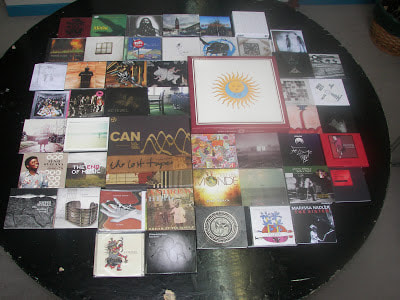 "by hand' was on the Délire Musical 2012 Eclectic Music Top 50
"by hand' was on the Délire Musical 2012 Eclectic Music Top 50
The Tree People’s journey ended in March 2011 with the retirement of flute player Jeff Stier. Singer-songwriter/guitarist Stephen Cohen and his trusty double bassist Rich Hinrichsen decided to carry on under a different name, The Walking Willows. And this new duo recently released their debut CD, By Hand, 27 minutes of hand-made delight. The Tree People’s naive folk is still there, and so is Cohen’s sweet voice, and the delicate instrumentals – a stripped down and coherent soundworld, songs for grown-up children. I do miss the flute in some places, but only a little. “1 hit song” and “Movie lot” are fantastic (and fantastically simple) songs. Francois Couture
Stephen and Rich had so much fun playing together with The Tree People that they they decided to continue as a duo, The Walking Willows, doing East Coast and New Mexico tours, and producing the by hand album, with an album release concert at the Old Church Concert Hall, before each moved on to other musical projects. But they still had more music collaborations to come.
Stephen and Rich had so much fun playing together with The Tree People that they they decided to continue as a duo, The Walking Willows, doing East Coast and New Mexico tours, and producing the by hand album, with an album release concert at the Old Church Concert Hall, before each moved on to other musical projects. But they still had more music collaborations to come.
Stephen Cohen, with a team of musicians and artists (including Rich Hinrichsen), creates the Cistern Symphony.
Stephen created this short film/music video/work of art, the Cistern Symphony, at Fort Worden, Port Townsend, Washington in 2012, with a team of musicians and artists during his Centrum residencies. It was shown at the AVI Festival in Jerusalem, Israel in December of 2016.
Stephen created this short film/music video/work of art, the Cistern Symphony, at Fort Worden, Port Townsend, Washington in 2012, with a team of musicians and artists during his Centrum residencies. It was shown at the AVI Festival in Jerusalem, Israel in December of 2016.
2013:
"No More School" from the "The Tree People" is on "12 Miles North The Nick Gabaldon Story" movie soundtrack
Just when we think the Tree People story has come to a close, something new happens: Stephen's acoustic guitar piece "No More School" (which was on the first album "The Tree People" and then was included on the Numero Group's acoustic guitar compilation album "Guitar Soli") is part of the soundtrack of the movie "12 Miles North". You can hear "No More School" at the 18:54 to 20:14 and 24:00 to 25:14 minute marks in the movie. "12 Miles North is a very moving documentary produced by Nike about Nick Gabaldon, a ground breaking black surfer who would paddle his surfboard 12 miles north from Santa Monica to surf the Malibu waves.
12 Miles North The Nick Gabaldon Story: https://www.youtube.com/watch?v=4p4a69jGifw
Just when we think the Tree People story has come to a close, something new happens: Stephen's acoustic guitar piece "No More School" (which was on the first album "The Tree People" and then was included on the Numero Group's acoustic guitar compilation album "Guitar Soli") is part of the soundtrack of the movie "12 Miles North". You can hear "No More School" at the 18:54 to 20:14 and 24:00 to 25:14 minute marks in the movie. "12 Miles North is a very moving documentary produced by Nike about Nick Gabaldon, a ground breaking black surfer who would paddle his surfboard 12 miles north from Santa Monica to surf the Malibu waves.
12 Miles North The Nick Gabaldon Story: https://www.youtube.com/watch?v=4p4a69jGifw
2017:
James Thornbury passes away
James Thornbury, a wonderful person and musician, one of the best I have ever known, passed away this month. I used to go see him play, and he used to go see me play, so long ago in Eugene, Oregon. We became friends, and sometime played together. You can hear him sing and play with me on Bring in the Water, a song we did together when he sat in on my first album, with my first band, The Tree People. He was the nicest person you could ever hope to meet. After blessing us with the blues in Eugene, he became the front man for Canned Heat for 10 years, then met his wife Molly while touring in Australia. He stayed there, they raised 2 daughters, and he continued to play his original and soulful country blues for appreciative Australian audiences. He was a person who could make you feel good with a song, a word, or just a friendly email. I miss him. Stephen Cohen
below: James works his musical magic in a video made in Australia in 2011 and in his 1981 North & South album, recorded in Oregon
below: James works his musical magic in a video made in Australia in 2011 and in his 1981 North & South album, recorded in Oregon
|
|
|
It was always a pleasure to play with James. Below are 2 of my songs that we recorded together, Bring in the Water and The Dusty Old Freight Train:
2018:
Jeff Stier's daughter Maeve featured guest on Stephen Cohen's new album Where Do We Go?
They say what goes round comes round, and things have come full circle, as Jeff's daughter Maeve follows in her father's footsteps and is a featured performer in Stephen's new album, Where Do We Go? Maeve is a talented opera singer with a bright career ahead of her. She has performed with Stephen at several of his concerts and it has been an honor and joy for him to work with her.
They say what goes round comes round, and things have come full circle, as Jeff's daughter Maeve follows in her father's footsteps and is a featured performer in Stephen's new album, Where Do We Go? Maeve is a talented opera singer with a bright career ahead of her. She has performed with Stephen at several of his concerts and it has been an honor and joy for him to work with her.
|
|
|
Stephen Cohen performs with singer Maeve Stier and pianist Yuan-Chen Li at the Where Do We Go? album release concert in Portland.
Stephen presents Let's Go Walking, a family performance piece with music, narration, dance, and audience participation.
Stephen is the creator and lead artist in the show. Rich Hinrichsen is the narrator. Rich and Maeve Stier are singers in the show.
this just in from Los Angeles:
I'm a record cassette dealer living in Los Angeles. I recently found a copy of your Human Voices cassette, which, I assume, was the only format it originally came out on. What an amazing tape! One of my favorites. I help run a small shop that focuses on experimental music. I'm writing on the far off chance that you might still have a box of these cassettes around and would consider selling them?
Amazing that a copy of that original 1984 cassette is out there, and amazing that cassettes are back. Unfortunately, Stephen only has one cassette copy of Human Voices left, so people will have to make do with the vinyl and CD reissues by Guerssen Records of Spain.
The Tree People return! The Return of The Tree People record album and hardcover book, was released in 2022.

